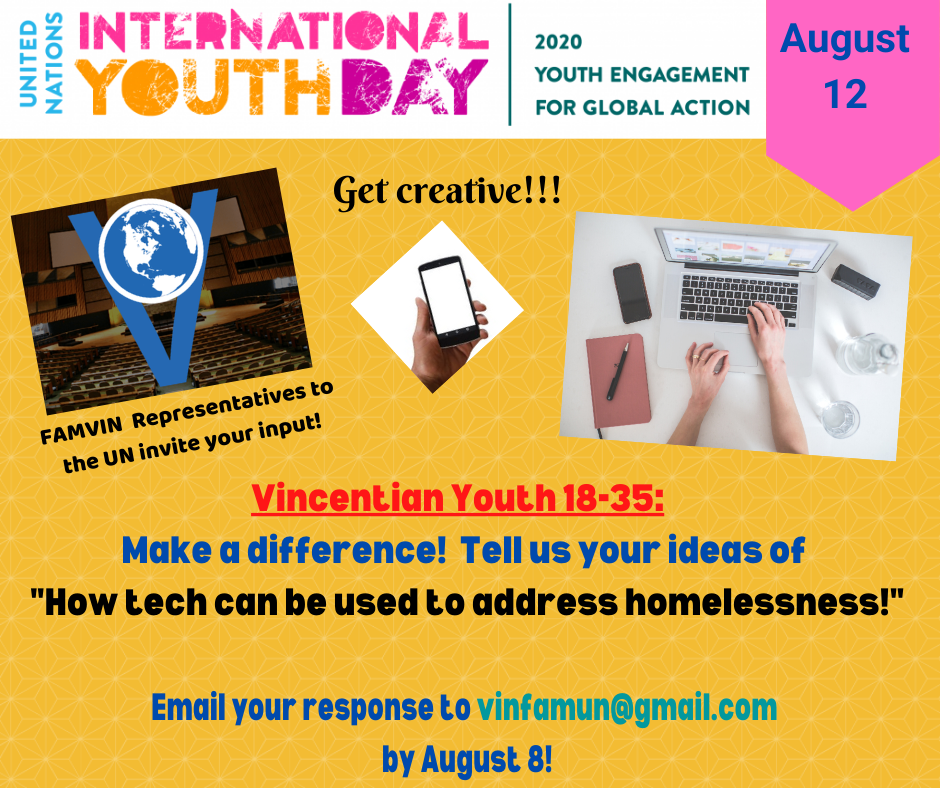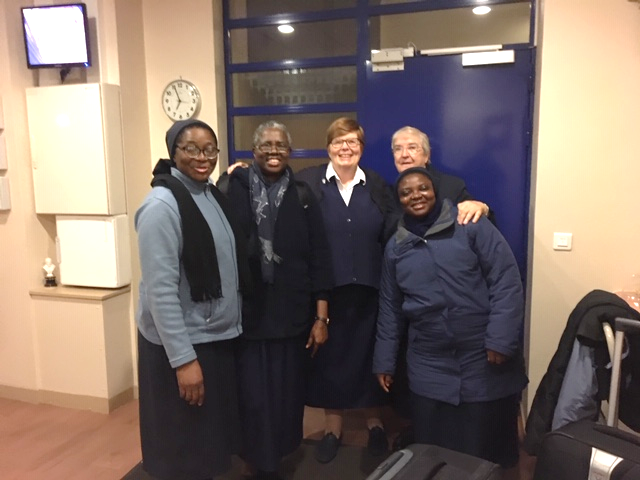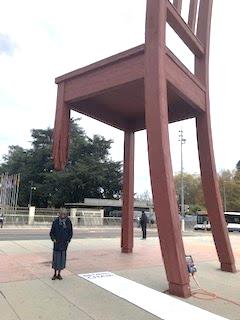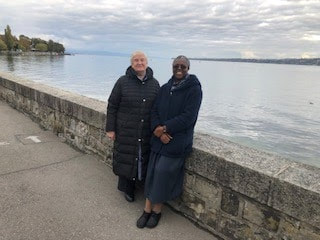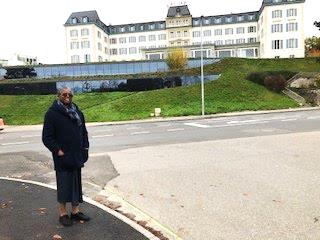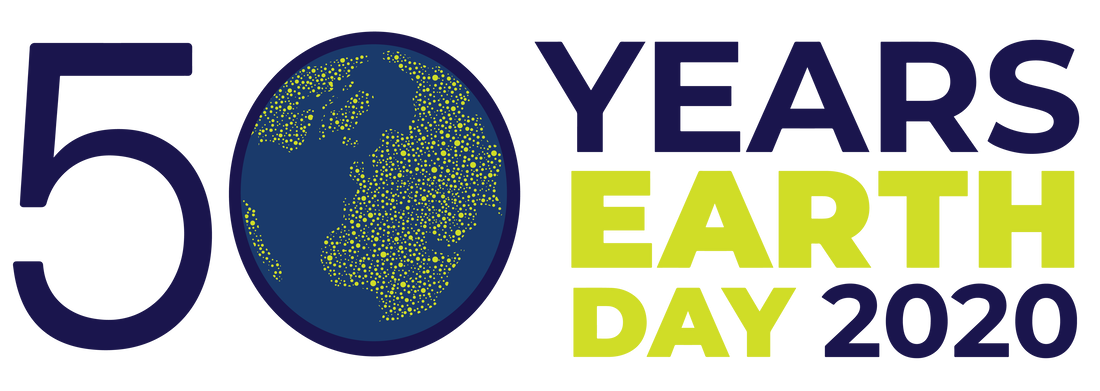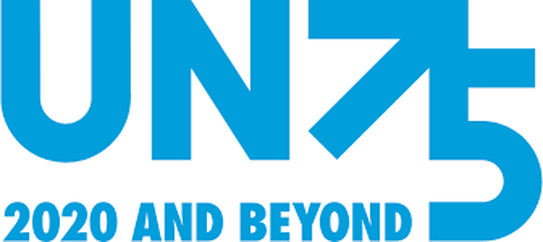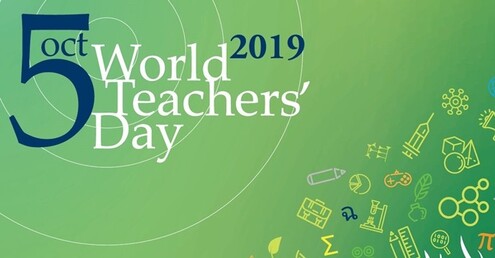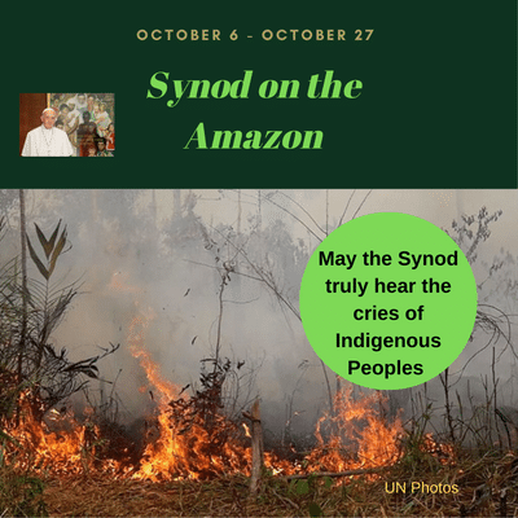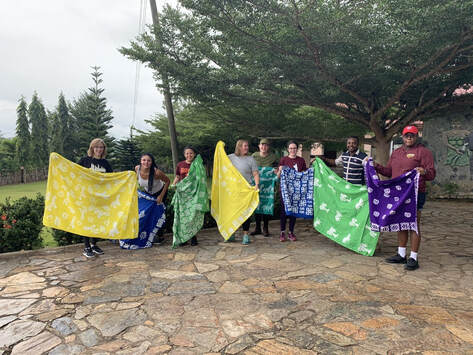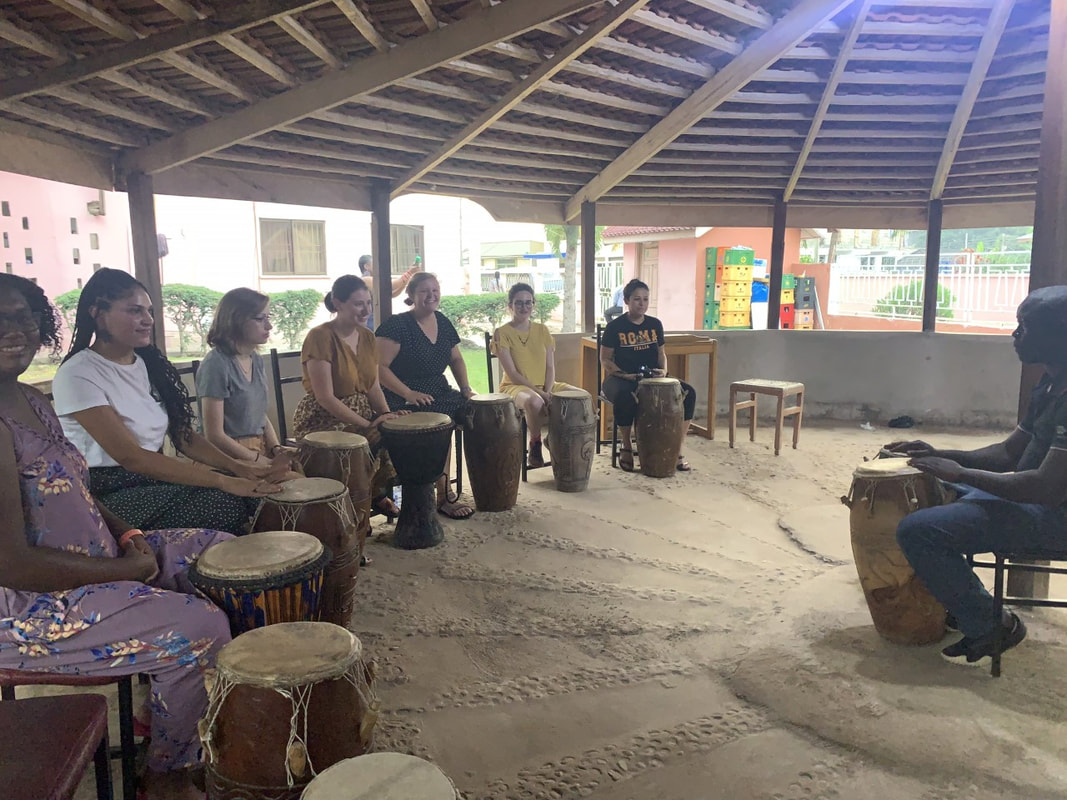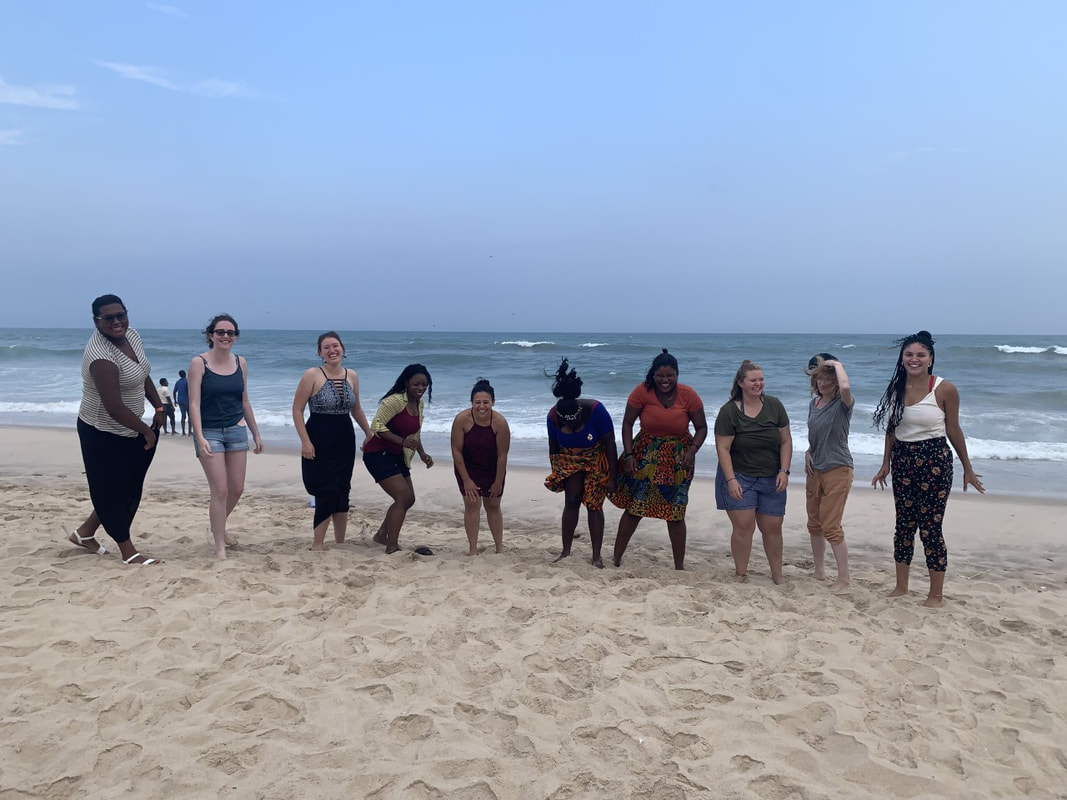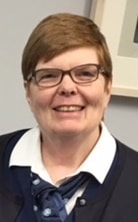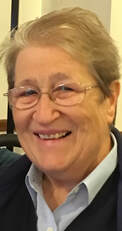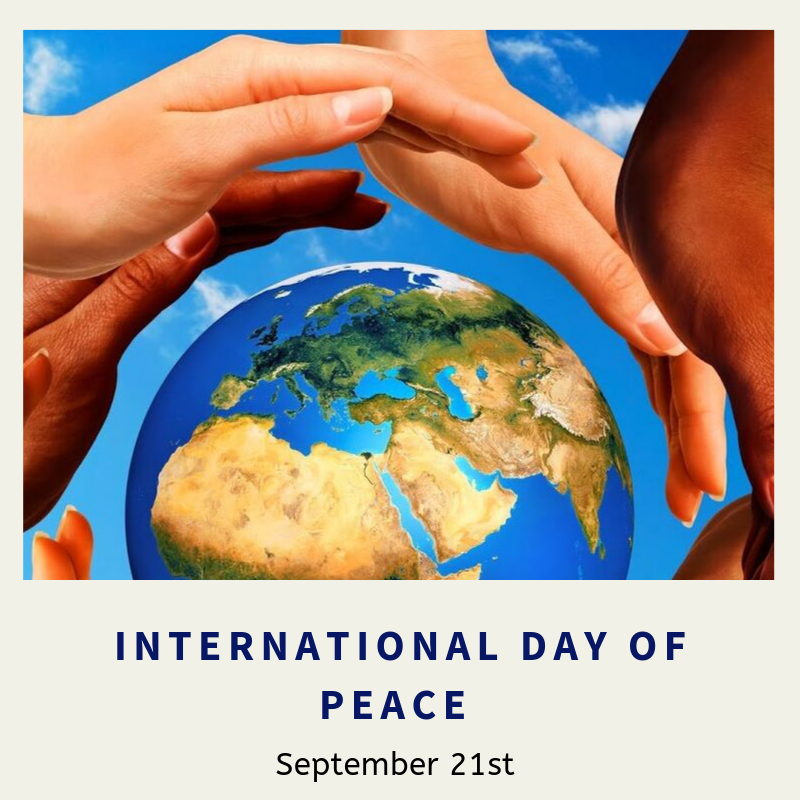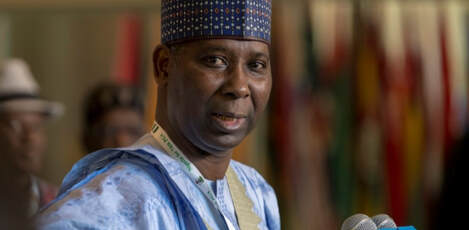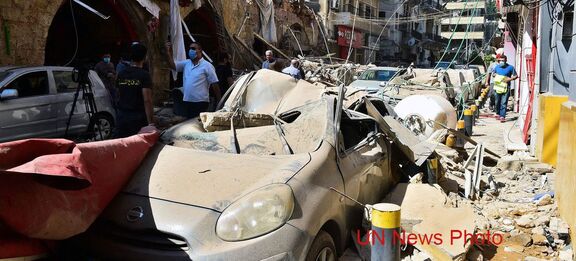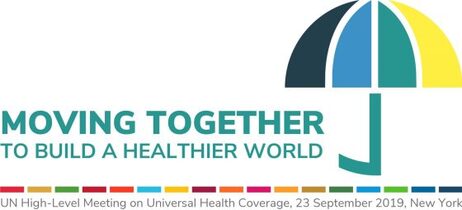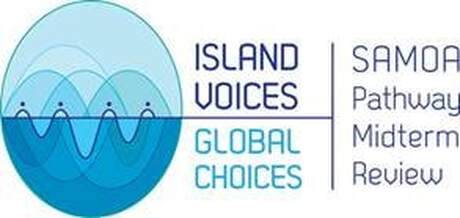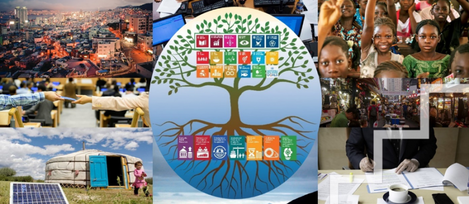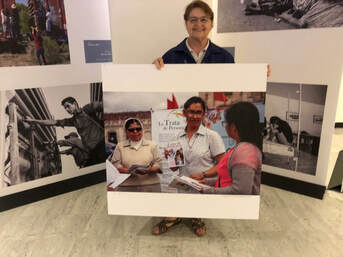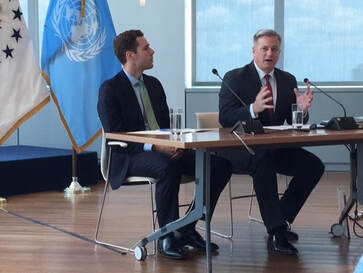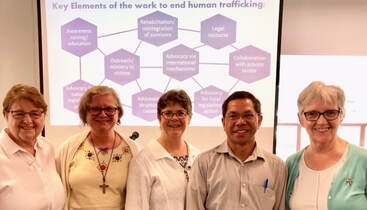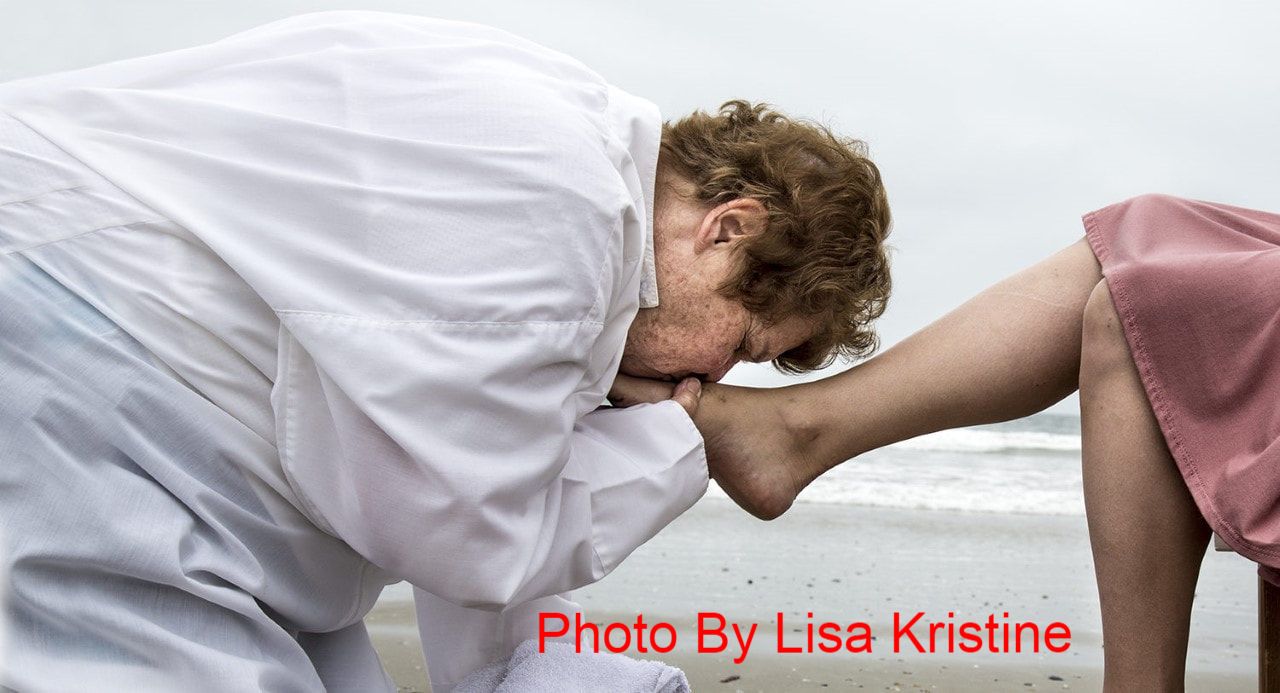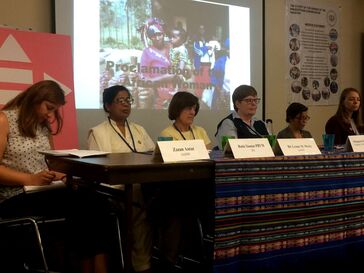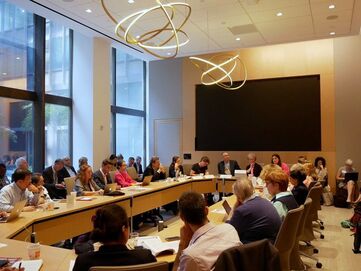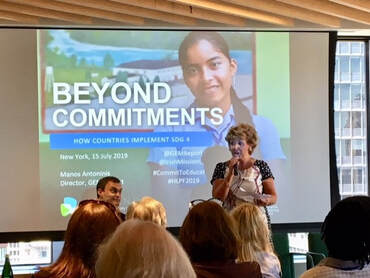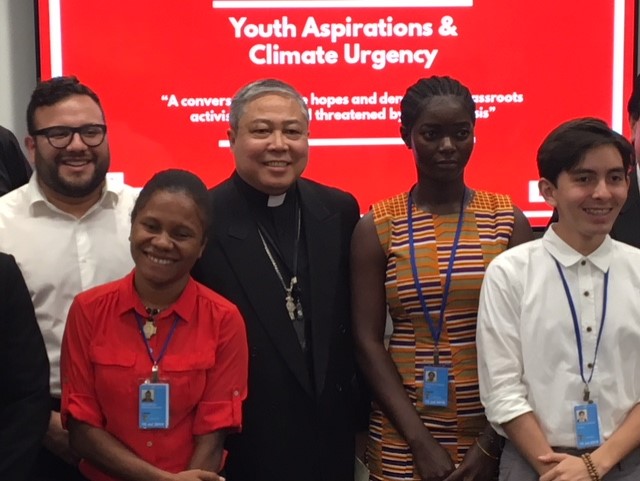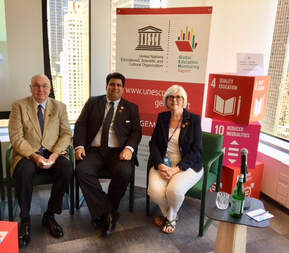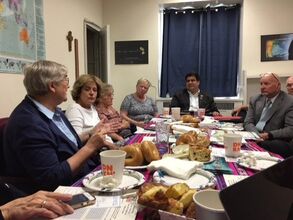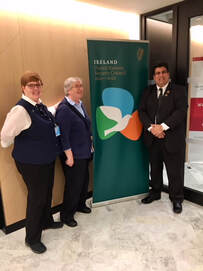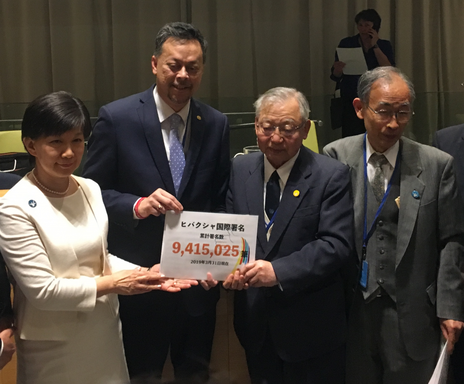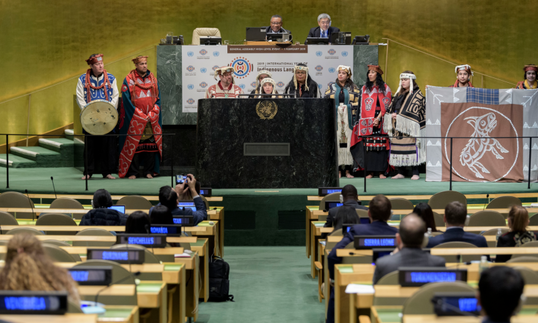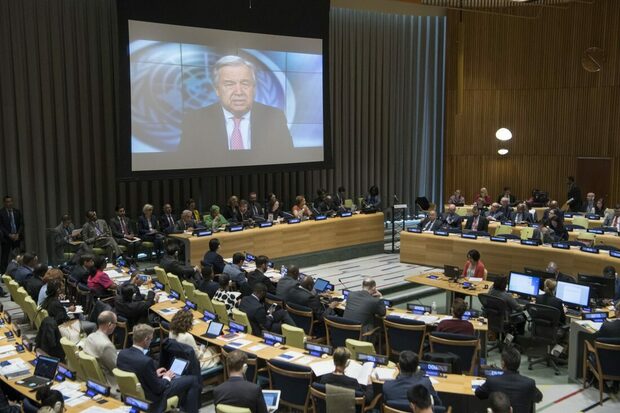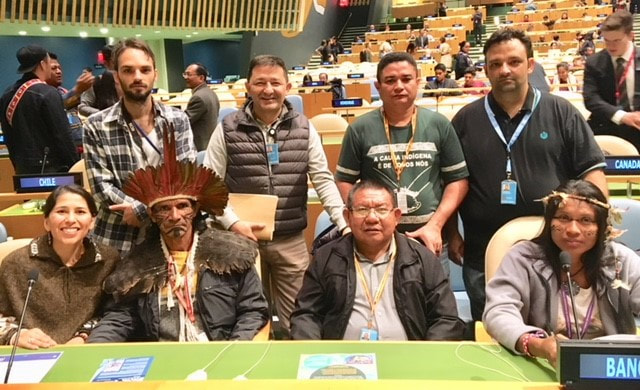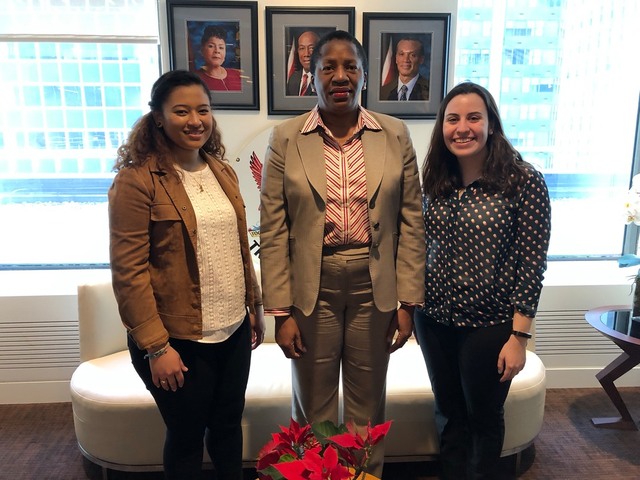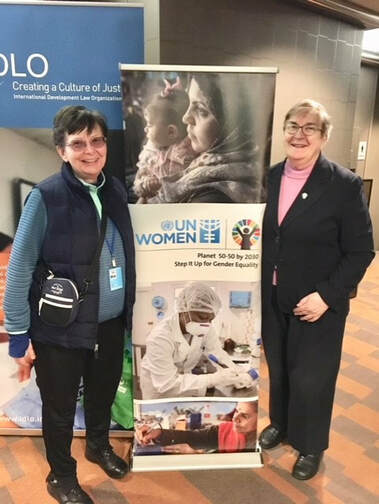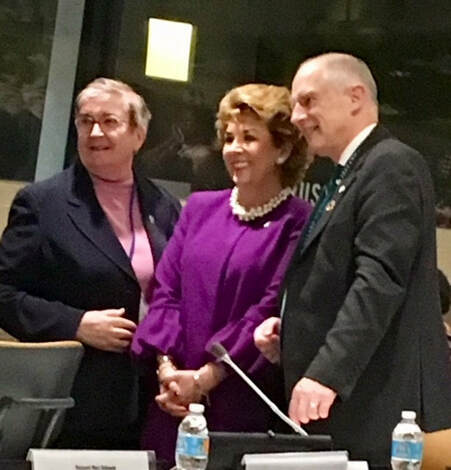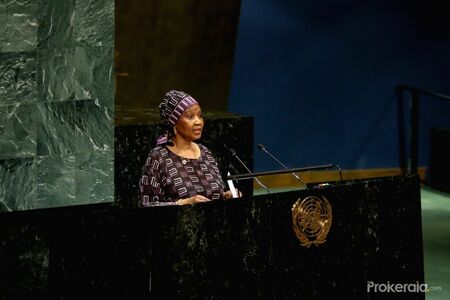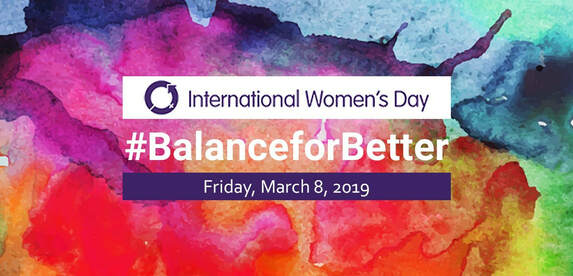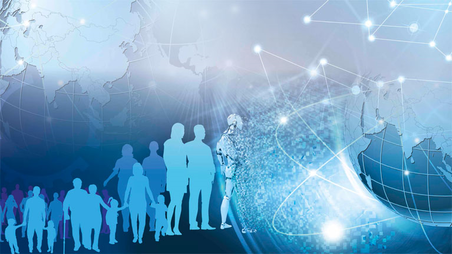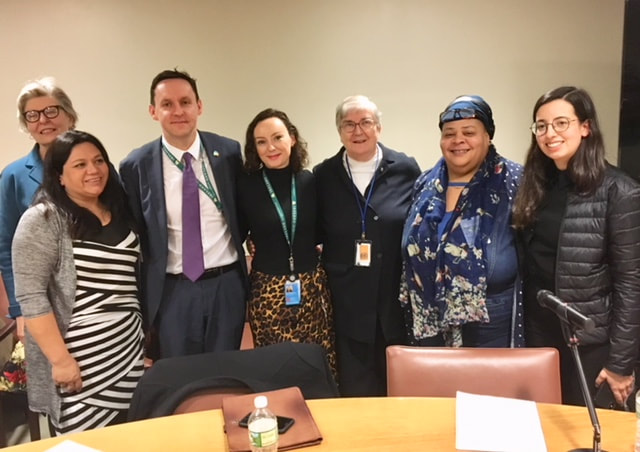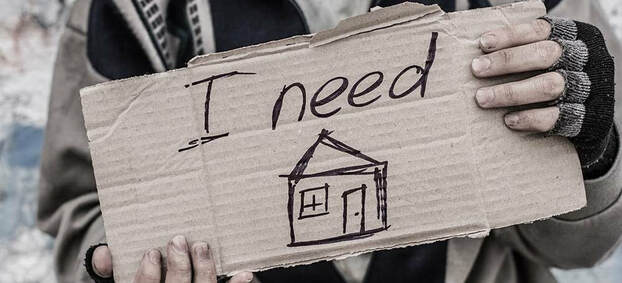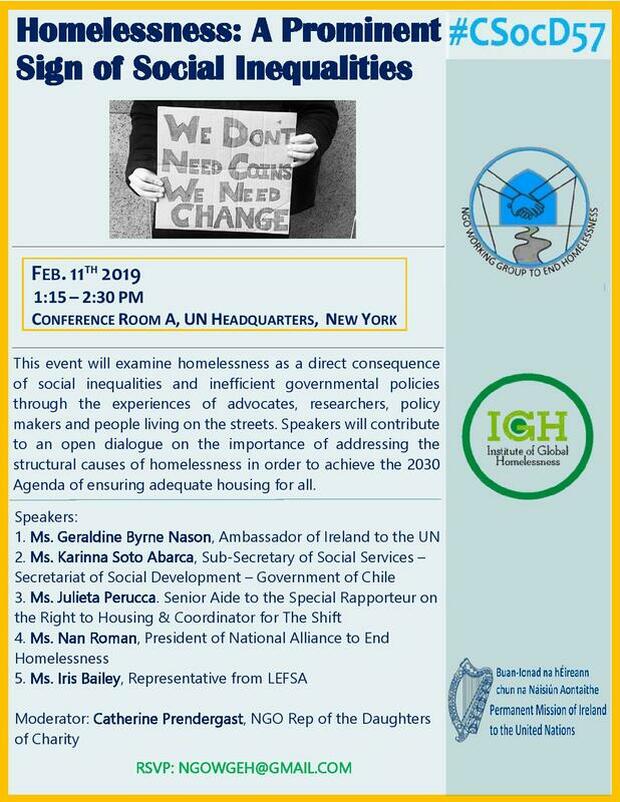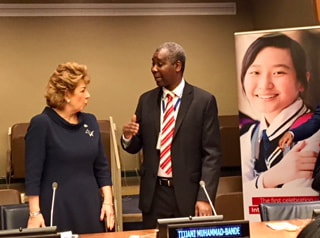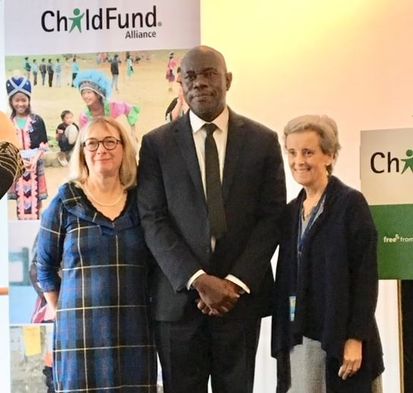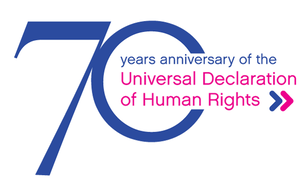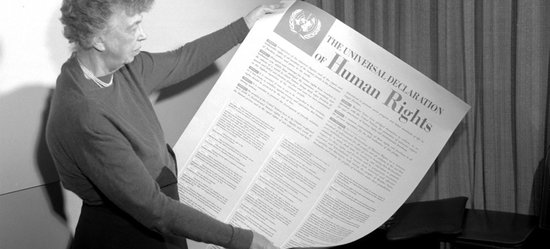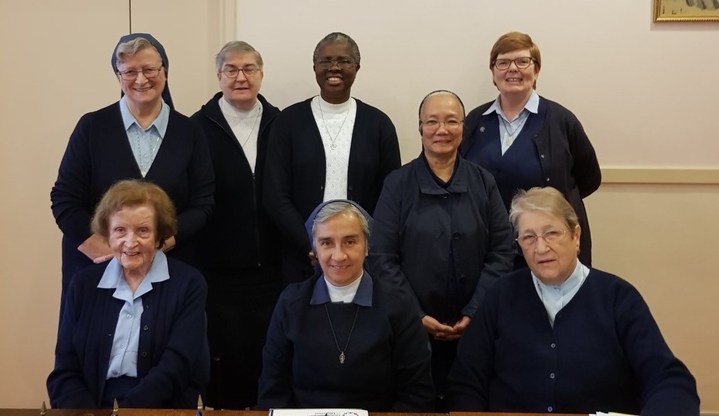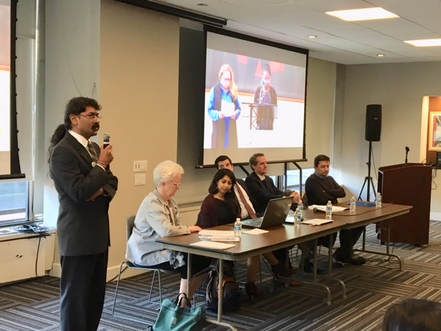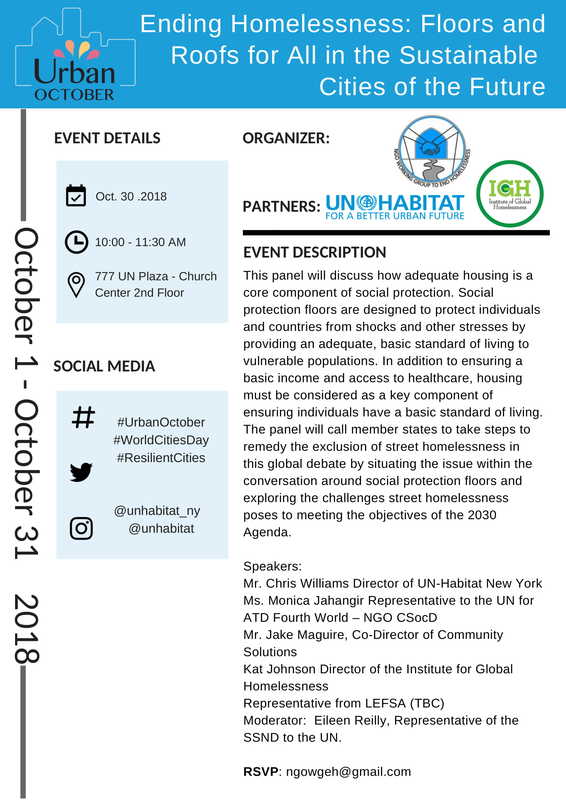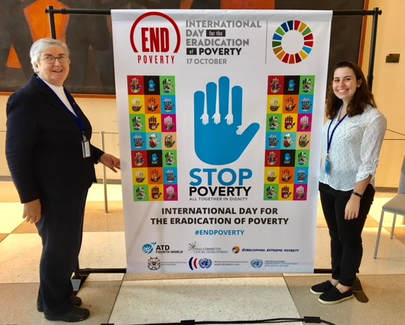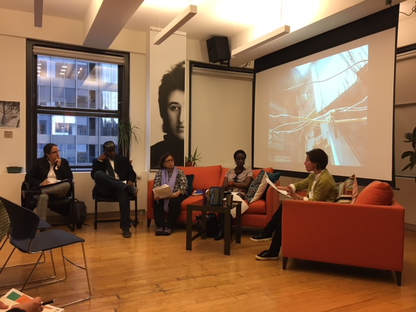NGO COMMITTEES WE SERVE ON
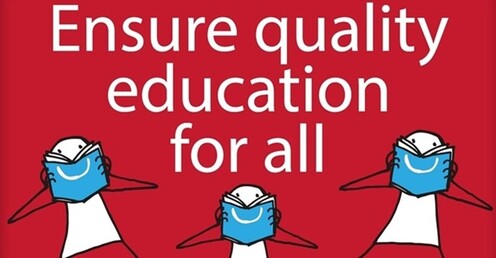
EDUCATION DAY TO FOCUS ON RECOVERY FROM COVID-19
By: Margaret O’Dwyer, DC
(With information from UNESCO)
From running inclusive education programs for children with disabilities, to providing elementary and secondary education, to offering literacy sessions for migrants, to operating universities, the Vincentian Family is committed to education. Education, to our Founders, was a pathway out of poverty. Saint Vincent de Paul and St. Louise de Marillac both integrated teaching into their ministries. Saint Elizabeth Ann Seton founded the first free Catholic School for girls in the United States. Vincentian education continues throughout the globe.
The UN will honor the education world, January 25, during the Third Annual International Day of Education. (The actual day is January 24). This year’s International Day will focus upon the theme, “Recover and Revitalize Education for the COVID-19 Generation.” The idea is to encourage global collaboration in placing education and lifelong learning at the center of recovery from COVID-19.
A global event for the International Day will highlight learning heroes; innovations, and financing. The celebration of International Education Day by UNESCO will be organized collaboratively with several other organizations, including the Global Partnership for Education and the Centre for Interdisciplinary Studies (CRI), and will include participation of partners from the Global Education Coalition.
EDUCATION IS A HUMAN RIGHT
Education is a human right, as expressed in Article 26 of the Universal Declaration of Human Rights. Education is also the center of Sustainable Development Goal (SDG) 4: Ensure inclusive and equitable quality education and promote lifelong learning opportunities for all. But the effects of COVID-19 could hinder efforts to achieve SDG 4 by 2030.
IMPACT OF COVID-19 UPON EDUCATION
There were challenges in education before the pandemic. According to UNESCO, despite strong universal enrolment in early grades in most countries, more than 250 million children were out of school, and nearly 800 million adults were illiterate. About 387 million, or 56 per cent of primary school age children worldwide, were estimated to lack basic reading skills.
The pandemic has added to these pre-COVID 19 challenges. An August, 2020, UN Policy Brief entitled, “Education During COVID-19 and Beyond,” pointed out that the pandemic has caused the largest disruption of education systems in history, affecting nearly 1.6 billion learners in more than 190 countries and all continents. Closures of schools and other learning spaces, the brief states, have impacted 94 per cent of the world’s student population, up to 99 per cent in low and lower-middle income countries. Nearly 369 million children who relied upon school meals needed to find nutrition elsewhere as of April, 2020.
The pandemic also is reducing opportunities for some of the most vulnerable children, including girls, refugees, persons with disabilities, and displaced persons. Some learners do not have access to technology in order to engage in remote learning, while others do not have sufficient internet access. Some 23.8 million children and youth (from pre-primary to tertiary) may drop out or not have access to school this year due to the pandemic’s economic impact alone.
COVID-19 has also highlighted inequalities. A considerable percentage of elementary schools did not have handwashing facilities, a key to COVID-19 prevention. Remote learning was impossible for millions of students. And the school completion rate in the poorest 20 percent of households was 34 percent compared to 79 percent of those in the richest 20 percent of households. COVID-19 is worsening the situation of education in Sub-Saharan Africa where, prior to the pandemic, 47 per cent of the world’s 258 million out-of-school children live.
WHAT HAS THE UN DONE?
The UN has responded to the COVID-19 crisis in a number of ways. UNESCO indicates it is supporting countries in their efforts to mitigate the immediate impact of school closures, particularly in more vulnerable and disadvantaged communities, and to facilitate the continuity of education for all through remote learning.
UNESCO also has:
- Formed a global education coalition to support countries in scaling up their best distance learning practices and reaching children and youth who are most at risk
- Prepared thematic knowledge-sharing workshops
- Produced issue notes covering key topics related to the COVID-19 education response.
- Created a selection of digital learning resources that governments, schools, teachers, and parents can use to open opportunities for learners unable to attend to school.
- Prepared a repository of national learning platforms designed to support the continuity of curriculum-based study.
- Conducted surveys to analyze the impact of and response to school closures
As Vincentians, we might ask “how can we support the schools in which our members serve? How can we help a child gain access to digital technology? How can we meet the needs of children who need nutrition but are no longer receiving it at school? How can we support teachers who are upskilling in the area of virtual technology or who stand in need of classroom supplies? How can we ensure internet access is available to all?”
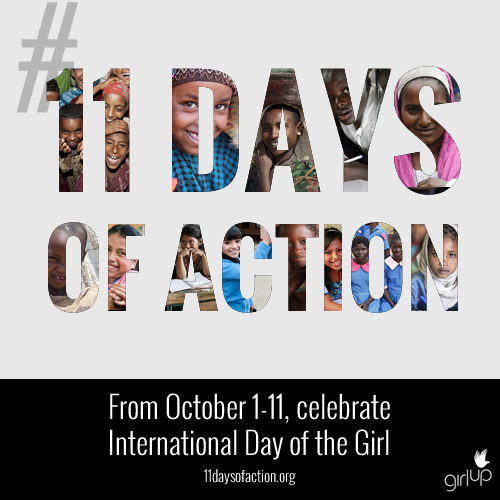
"TWEET MEET" DURING 11 DAYS OF ACTION FOR GIRLS
By Margaret O'Dwyer (with input from the UN)
In a lead-up to the International Day of the Girl, October 10, women and girls globaly engage in 11 days of action. Typically, various organizations adopt a day and engage in tweet meets to promote the conditions and rights of girls. The Company of the Daughters of Charity will join with the Loretto Community, the the Religious of the Sacred Heart of Jesus, and the Sisters of Notre Dame De Namur from 11-12 a.m. Eastern time, Friday, October 2, to discuss issues related to girls' safety and education.
The Daughters of Charity Twitter site is @DCattheUN. Other hashtages for the event include #EducateGirls2020 #11DaysofAction #IDG2020 #EquityForGirls #BeBold #KeepGirlsSafe2020. The site posing questions is #IDG_Summit (Twitter).
Girls are among groups profoundly impacted by COVID-19 and responses to it. Many are having to stay home to engage in additional unpaid care work. Others will not be able to return from lockdown to school. Girls will be among millions of people being pushed into extreme poverty due to the economic effects of COVID-19. Worldwide, nearly 1 in 4 girls aged 15-19 is neither employed nor in education or training, compared to 1 in 10 boys of the same age, according to the UN.
The closure of schools can mean that girls experiencing poverty are at at higher risk of gender-based violence, exploitation, early marriage, and a higher rate of pregnancy. This means their dreams may be dashed or put on extensive hold.
The theme for International Day of the Girl is My Voice, Our Equal Future. As girls globally speak up for change, the International Day will focus on:
*Living free from gender-based violence, harmful practices (such as female genital mutilation), and HIV and AIDS
*Learning new skills which lead to the future they envision
*Leading as a generation of activities accelerating social change
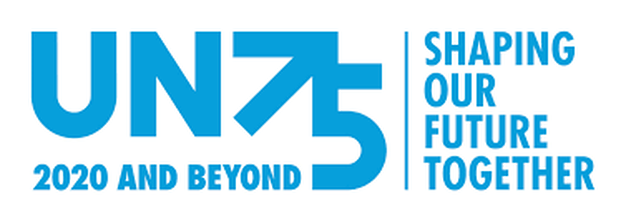
UNITED NATIONS AT 75: FAITH-BASED ORGANIZATIONS ENVISION UN REFORMS
By: Margaret O’Dwyer, DC
Although the United Nation’s General Assembly (GA) opens in New York on Tuesday, September 15, the over two-week, high-level event seems far overshadowed by reflection upon one day—The UN’s 75th Anniversary. The UN’s diamond anniversary, September 21, has given people globally pause to consider needed reforms at the United Nations; changes which would make it more effective.
No doubt the UN has done great good in its 75 years. An example would be the efforts of various UN agencies to provide support following the devastating early August explosions in Beirut. Others include humanitarian aid provided in times of floods, famine, and conflict; awareness-raising about climate issues; assistance given to migrants and refugees; the provision of aid and medical supplies/care in the midst of Ebola and Covid-19 situations; and more. When in the Cook Islands a few years back, I witnessed the wonderful work of a UNESCO representative in supporting educational services. No doubt her efforts are duplicated in many locations world-wide.
But prominent in people’s minds are questions such as, “How can the Security Council be more effective?” (It was distressing when the Security Council took 100 days to finally support Secretary General Antonio Guterres’ call for a global cease fire at the beginning of the COVID-19 pandemic). “How can the UN have greater impact at the grass roots level? How can countries be held more accountable in their commitments to treaties, compacts, and resolutions? How can countries set aside power struggles and more vigorously work for the common good? How can human rights be better protected?”
GENERAL ASSEMBLY EVENTS
The General Assembly takes place September 15 through 30. (It will consist this year primarily of video-taped messages by world leaders). The UN’s 75th Anniversary takes place in the midst of the General Assembly. The theme of the September 21st anniversary is: 'The Future We Want, the UN We Need: Reaffirming our Collective Commitment to Multilateralism.’
Other key events connected with the General Assembly include Climate Week, September 21-27; a Biodiversity Summit on September 30; celebration of the 25th Anniversary of the Fourth World Conference on Women through a dialogue set for October 1; and a high-level plenary meeting to commemorate and promote the International Day for the Total Elimination of Nuclear Weapons on Friday, 2 October 2020.
UN CONDUCTED GLOBAL SURVEYS
To prepare for its 75th anniversary celebration, the UN has conducted global surveys and conversations throughout the year to receive people’s opinions about key concerns and solutions to world problems. Secretary General Antonio Guterres will speak, and the grass roots survey results are expected to be released, during an anniversary event on Monday, September 21.
SECRETARY GENERAL WANTS ACTION ON GLOBAL THREATS
Guterres does not seem to be looking for an anniversary celebration involving cutting cake and “hip, hip, hoorays.” He is more concerned about urgent action to address contemporary global threats which he framed in January as the “four horsemen of the apocalypse.” The four horsemen are mentioned by the Apostle, John, in the Book of Revelation. They represent conquest, the violence of warfare, famine, and widespread death. Guterres in January identified their contemporary equivalents as climate change, mistrust, global tensions, and sinister technologies. Eight months after Guterres’ named them, those four horsemen are joined by others, including a pandemic, the health and economic devastation it has caused, growing poverty, as well as blatant inequalities.
FAITH BASED VISION FOR UN AT 75
Faith based organizations (FBOs) bring a unique view to the UN. They typically know what’s happening on the ground. They address persons “left behind” and insist on preserving their dignity. In many cases, they know effective solutions. A group called Religious at the UN (RUN) recently prepared a faith based vision for the UN at 75. (The Company of the Daughters of Charity, the Sisters of Charity Federation, and the Congregation of the Mission belong to RUN).
RUN, in its vision, states that “the UN has done much of its best and most important work on the ground when in dialogue and intentional collaboration with FBOs and members of our vast civil society networks. FBO input, guided by principles of subsidiarity and a preferential option for the poor (among many others), has frequently been instrumental in ensuring that the world’s most marginalized communities are included in the design, delivery, and fruits of UN efforts on the ground.”
In order to work towards a more relevant and effective United Nations, RUN calls for four things:
1. Making the role of civil society, including FBOs, more relevant, central and meaningful in UN processes. RUN offers a number of suggestions related to greater engagement of civil society and FBOs at the UN, including a more meaningful practice of collaboration with FBOs to engage individuals with lived experience of thematic issues being examined by UN Commissions; ensuring NGOs and member states listen and engage with each other to a greater extent; encouraging all national UN offices to invite input from FBOs within the country and offer themselves as communication hubs (so that people living in remote areas can participate in international-level processes); creating a major group for FBOs which would then afford FBOs a standing invitation to participate in UN fora; providing more diverse Member State delegations to UN Commissions and meetings; and recognizing NGO working groups and committees in developing outcome documents and in the planning and work of UN agencies with whom they share a focus area.
2. Security Council reform: “The UNSC,” RUN says, “requires a 2020 vision of global security that integrates a broad swath of the interrelated social, economic, and environmental factors of which it is comprised.” Suggested reforms include an end to the Security Council veto, the abolishment of permanent membership, equitable representation of regions on the Council, greater gender balance on the Council, a seat for youth and civil society representatives, and prohibition of members’ service on the Council when their countries are in arrears in funding to the UN, involved in making war, and when they are involved in the fabrication of war materials and armaments for sale to countries in conflict. It also calls for protocols for more robust responses when violence is committed against or in the name of faith based communities.
3. Develop a UN body dedicated to the coordination of both the internal (within the UN) and national-level reviews of how Member States are implementing treaties, declarations, compacts, and resolutions. “In the spirit of the 2005 World Summit Outcome, the UN must communicate in deed to all peoples that the words spoken in the halls of New York, Geneva, Vienna, Nairobi, etc. are more than rhetoric, that the expert advice exchanged within those halls is worth acting upon,” RUN states. RUN’s suggestions include a robust channel for input from civil society, including members of affected populations, in the planning and implementation of all the body’s monitoring and evaluation processes; establishing a process for reviewing the UN System’s human rights record; establishing a process for reviewing the UN’s delivery on the 17 Sustainable Development Goals; codifying the principle of gender equality in UN protocols; and mainstreaming exemplary environmental sustainability policies and practices. RUN also calls for undertaking a review of the UN Charter, policies, processes and procedures to identify embedded racial or gender bias, ensuring changes are made to address any biases found, and integrating anti-racism and unconscious bias training for all UN staff and volunteers.
4. Scale up technology capacity, affordability, and access and revise approaches to UN processes to allow remote participation to become a primary mode of operation. RUN urges the UN “to make significant investment in technological capacities and infrastructure at its national and international offices that will facilitate the remote participation, especially of non-governmental stakeholders, in UN proceedings” and to allow remote participation to become one of the primary modes of input from both Member States and non-governmental stakeholders. Recommendations essentially call for closing the digital divide, ensuring technology diminishes gaps in representation, and providing time frames for negotiations and consultations, which would enable people in distant time zones to better provide input.
Various faith based organizations met on Tuesday on a webinar which involved member states and civil society. They discussed ways to make the United Nations truly “united.” In addition, a project called UN2020 has engaged civil society in many conversations regarding the UN at 75 over the past couple years. The Project in May issued a People’s Declaration and Plan for Global Action. It is accessible at this link: https://secureservercdn.net/198.71.233.184/b06.41d.myftpupload.com/wp-content/uploads/2020/05/Final-Peoples-Declaration-and-Plan-of-Global-Action-1.pdf?time=1589376036
Any significant changes require greater relationship building. Let’s hope and pray that greater dialogue among all United Nations leaders and stakeholders leads to effective change which benefits people experiencing marginalization of any kind.
By: Margaret O’Dwyer, DC
Although the United Nation’s General Assembly (GA) opens in New York on Tuesday, September 15, the over two-week, high-level event seems far overshadowed by reflection upon one day—The UN’s 75th Anniversary. The UN’s diamond anniversary, September 21, has given people globally pause to consider needed reforms at the United Nations; changes which would make it more effective.
No doubt the UN has done great good in its 75 years. An example would be the efforts of various UN agencies to provide support following the devastating early August explosions in Beirut. Others include humanitarian aid provided in times of floods, famine, and conflict; awareness-raising about climate issues; assistance given to migrants and refugees; the provision of aid and medical supplies/care in the midst of Ebola and Covid-19 situations; and more. When in the Cook Islands a few years back, I witnessed the wonderful work of a UNESCO representative in supporting educational services. No doubt her efforts are duplicated in many locations world-wide.
But prominent in people’s minds are questions such as, “How can the Security Council be more effective?” (It was distressing when the Security Council took 100 days to finally support Secretary General Antonio Guterres’ call for a global cease fire at the beginning of the COVID-19 pandemic). “How can the UN have greater impact at the grass roots level? How can countries be held more accountable in their commitments to treaties, compacts, and resolutions? How can countries set aside power struggles and more vigorously work for the common good? How can human rights be better protected?”
GENERAL ASSEMBLY EVENTS
The General Assembly takes place September 15 through 30. (It will consist this year primarily of video-taped messages by world leaders). The UN’s 75th Anniversary takes place in the midst of the General Assembly. The theme of the September 21st anniversary is: 'The Future We Want, the UN We Need: Reaffirming our Collective Commitment to Multilateralism.’
Other key events connected with the General Assembly include Climate Week, September 21-27; a Biodiversity Summit on September 30; celebration of the 25th Anniversary of the Fourth World Conference on Women through a dialogue set for October 1; and a high-level plenary meeting to commemorate and promote the International Day for the Total Elimination of Nuclear Weapons on Friday, 2 October 2020.
UN CONDUCTED GLOBAL SURVEYS
To prepare for its 75th anniversary celebration, the UN has conducted global surveys and conversations throughout the year to receive people’s opinions about key concerns and solutions to world problems. Secretary General Antonio Guterres will speak, and the grass roots survey results are expected to be released, during an anniversary event on Monday, September 21.
SECRETARY GENERAL WANTS ACTION ON GLOBAL THREATS
Guterres does not seem to be looking for an anniversary celebration involving cutting cake and “hip, hip, hoorays.” He is more concerned about urgent action to address contemporary global threats which he framed in January as the “four horsemen of the apocalypse.” The four horsemen are mentioned by the Apostle, John, in the Book of Revelation. They represent conquest, the violence of warfare, famine, and widespread death. Guterres in January identified their contemporary equivalents as climate change, mistrust, global tensions, and sinister technologies. Eight months after Guterres’ named them, those four horsemen are joined by others, including a pandemic, the health and economic devastation it has caused, growing poverty, as well as blatant inequalities.
FAITH BASED VISION FOR UN AT 75
Faith based organizations (FBOs) bring a unique view to the UN. They typically know what’s happening on the ground. They address persons “left behind” and insist on preserving their dignity. In many cases, they know effective solutions. A group called Religious at the UN (RUN) recently prepared a faith based vision for the UN at 75. (The Company of the Daughters of Charity, the Sisters of Charity Federation, and the Congregation of the Mission belong to RUN).
RUN, in its vision, states that “the UN has done much of its best and most important work on the ground when in dialogue and intentional collaboration with FBOs and members of our vast civil society networks. FBO input, guided by principles of subsidiarity and a preferential option for the poor (among many others), has frequently been instrumental in ensuring that the world’s most marginalized communities are included in the design, delivery, and fruits of UN efforts on the ground.”
In order to work towards a more relevant and effective United Nations, RUN calls for four things:
1. Making the role of civil society, including FBOs, more relevant, central and meaningful in UN processes. RUN offers a number of suggestions related to greater engagement of civil society and FBOs at the UN, including a more meaningful practice of collaboration with FBOs to engage individuals with lived experience of thematic issues being examined by UN Commissions; ensuring NGOs and member states listen and engage with each other to a greater extent; encouraging all national UN offices to invite input from FBOs within the country and offer themselves as communication hubs (so that people living in remote areas can participate in international-level processes); creating a major group for FBOs which would then afford FBOs a standing invitation to participate in UN fora; providing more diverse Member State delegations to UN Commissions and meetings; and recognizing NGO working groups and committees in developing outcome documents and in the planning and work of UN agencies with whom they share a focus area.
2. Security Council reform: “The UNSC,” RUN says, “requires a 2020 vision of global security that integrates a broad swath of the interrelated social, economic, and environmental factors of which it is comprised.” Suggested reforms include an end to the Security Council veto, the abolishment of permanent membership, equitable representation of regions on the Council, greater gender balance on the Council, a seat for youth and civil society representatives, and prohibition of members’ service on the Council when their countries are in arrears in funding to the UN, involved in making war, and when they are involved in the fabrication of war materials and armaments for sale to countries in conflict. It also calls for protocols for more robust responses when violence is committed against or in the name of faith based communities.
3. Develop a UN body dedicated to the coordination of both the internal (within the UN) and national-level reviews of how Member States are implementing treaties, declarations, compacts, and resolutions. “In the spirit of the 2005 World Summit Outcome, the UN must communicate in deed to all peoples that the words spoken in the halls of New York, Geneva, Vienna, Nairobi, etc. are more than rhetoric, that the expert advice exchanged within those halls is worth acting upon,” RUN states. RUN’s suggestions include a robust channel for input from civil society, including members of affected populations, in the planning and implementation of all the body’s monitoring and evaluation processes; establishing a process for reviewing the UN System’s human rights record; establishing a process for reviewing the UN’s delivery on the 17 Sustainable Development Goals; codifying the principle of gender equality in UN protocols; and mainstreaming exemplary environmental sustainability policies and practices. RUN also calls for undertaking a review of the UN Charter, policies, processes and procedures to identify embedded racial or gender bias, ensuring changes are made to address any biases found, and integrating anti-racism and unconscious bias training for all UN staff and volunteers.
4. Scale up technology capacity, affordability, and access and revise approaches to UN processes to allow remote participation to become a primary mode of operation. RUN urges the UN “to make significant investment in technological capacities and infrastructure at its national and international offices that will facilitate the remote participation, especially of non-governmental stakeholders, in UN proceedings” and to allow remote participation to become one of the primary modes of input from both Member States and non-governmental stakeholders. Recommendations essentially call for closing the digital divide, ensuring technology diminishes gaps in representation, and providing time frames for negotiations and consultations, which would enable people in distant time zones to better provide input.
Various faith based organizations met on Tuesday on a webinar which involved member states and civil society. They discussed ways to make the United Nations truly “united.” In addition, a project called UN2020 has engaged civil society in many conversations regarding the UN at 75 over the past couple years. The Project in May issued a People’s Declaration and Plan for Global Action. It is accessible at this link: https://secureservercdn.net/198.71.233.184/b06.41d.myftpupload.com/wp-content/uploads/2020/05/Final-Peoples-Declaration-and-Plan-of-Global-Action-1.pdf?time=1589376036
Any significant changes require greater relationship building. Let’s hope and pray that greater dialogue among all United Nations leaders and stakeholders leads to effective change which benefits people experiencing marginalization of any kind.
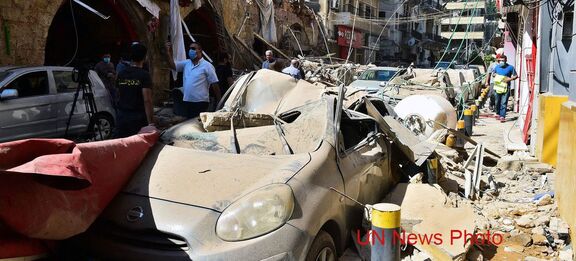
WHAT IS THE UNITED NATIONS DOING
TO AID BEIRUT?
By: Sr. Margaret O’Dwyer, DC
(With input from UN News)
The explosions on August 4 in Beirut profoundly impacted the Vincentian Family. We have experienced the worst effects. The Daughters of Charity mourn the loss of Sr. Sophie Khosrovian, who died from injuries sustained in the blast. Structures owned by the Daughters of Charity and Congregation of the Mission were badly damaged, as well as the Basilica of the Miraculous Medal, in addition to buildings housing services the Family provides, such as schools, hospitals, social service centers, and more.
Over 300,000 people from the city were left homeless. The BBC reports that over 200 were killed. Thousands were wounded. Issues such as homelessness, trauma, COVID-19, hunger, and rebuilding are concerns.
At the same time, we witness hope. Families help each other out in times of crisis, and it appears that is the reality in Beirut. No doubt, all branches are deeply engaged in helping the people of Beirut get back on their feet.
The Vincent De Paul Society is aiding people affected by the blast as is the Lebanon Branch of the International Association of Charity (AIC). The AIC, along with all the Family branches, invite prayers for the people of Beirut. Vincentian youth have rolled up their sleeves and are engaged in clean-up efforts. The Daughters of Charity and medical teams at Sacred Heart Hospital served injured persons in spite of damage to the facility. The Congregation of the Mission is engaged in clean up and presiding at Masses outside the damaged Basilica. We will likely never know all the ways each of our branches is heavily engaged in addressing the needs of local people impacted by the explosions, offering hope and trying to give Beirut a new start.
I have observed a number of Vincentian fund-raising efforts to assist Beirut. The Vincentian Family Homeless Alliance recently launched “From our Hearts to the Hearts of Lebanon,” which will raise finances for shelter, food, building materials, and healthcare. The AIC will soon feature a fundraiser on their Facebook page. All of our branches benefit from donations to help the cause.
You might ask, “What is the United Nations doing to help Beirut?”
The August 4 blasts gave rise to a complex system of needs, damage, and harm. A network of United Nations agencies and specialists are working diligently to help Beirut recover.
The UN immediately mobilized emergency help, such as temporary shelters, for persons displaced because of the explosions. Early on, the UN’s Office for the Coordination of Humanitarian Affairs (OCHA), released $6 million from the Central Emergency Response Fund to fund trauma care, support hospitals, repair damaged homes, and provide logistical help.
The UN sent in medical supplies, shelter kits, food parcels, and helped to reunite separated families. The United Nations also joined French President Emmanuel Macron in leading a donor’s conference on August 9.
“We will need all hands on deck” to address recovery, said UN Deputy Secretary Amina Muhammad at the time of the conference.
In addition to the donor’s conference, the UN on August 14 launched an appeal for $565 million to help the people of Beirut. According to OCHA, the funds will help pay for hot meals, food rations, and grain; repair of health facilities as well as needed trauma kits and medicines; shelter for families whose homes were damaged or stand in need of rehabilitation; repairs of common buildings and areas; repairs of schools and provision of educational supplies; and psychological support for children.
MEDICAL ASSISTANCE
At the time of the explosions, perhaps the greatest need was for medical supplies and care. Even before the tragedy occurred, Beirut, like the rest of the world, was addressing COVID-19. A number of World Health Organization (WHO) containers bearing supplies such as personal protective equipment, were destroyed in the blasts. WHO conducted an assessment of 55 health care centers in Beirut, noting that three hospitals were largely out of service and just over 50 percent of the health care centers are nonfunctional. It has issued a $76 million appeal for medical supplies and care. It is further working with medical teams from overseas to provide care. And it has delivered additional PPE, as well as surgical and trauma supplies, to 2000 patients at 10 hospitals.
Meanwhile, the United Nations Children’s Fund (UNICEF), provided vaccines and medical supplies, in addition to counseling for children traumatized by the blasts. It further provided drinking water for rescue workers.
FOOD AID
Because a large percentage of food stored in warehouses at the port was destroyed, the World Food Program is sending in 50,000 tons of wheat and grain. It provided immediate relief to people affected by the explosion through delivery of 150,000 food parcels. It also collaborated with Caritas Lebanon to provide hot meals in soup kitchens. With much infrastructuredamaged, WFP is working to clean up an area of the port to allow for food delivery, and address other ways of streamlining supply chains and delivery.
ASSISTING MIGRANTS AND REFUGEES
According to the International Organization for Migration, about 8 percent of the 300,000 people affected in Beirut are migrant workers. The IOM appealed for over $10 million to help over 43,000 migrants and refugees impacted by the explosions. Meanwhile, the UN High Commission for Refugees (UNHCR) agency is investigating reports of 34 refugees being killed by the blasts.
EDUCATION
The August 4 blasts took a heavy toll on schools. Approximately 70 public and 50 private schools were totally destroyed or partially damaged, impacting about 55,000 students. The rehabilitation of schools is vital. The United Nations Educational, Scientific, and Cultural Organization (UNESCO) has committed to helping with rehabilitation. In addition, it will provide technical and financial support to enhance virtual learning opportunities.
HISTORICAL BUILDINGS
Beirut’s historic buildings stand in need of repair. UNSESCO is also leading an effort to help save and rehabilitate some of the city’s 60 historical buildings in danger of collapsing.
CALL FOR INDEPENDENT INVESTIGATION
The UN’s High Commissioner for Human Rights (UNHCHR), Michelle Bachelet, had warned before the explosions that Lebanon was fast spiraling out of control. She had urged reforms. The UNHCHR is now calling for an independent investigation into the explosion. “Victims' calls for accountability must be heard, including through undertaking an impartial, independent, thorough and transparent investigation into the explosion, said OHCHR Spokesperson Rupert Colville.
TO AID BEIRUT?
By: Sr. Margaret O’Dwyer, DC
(With input from UN News)
The explosions on August 4 in Beirut profoundly impacted the Vincentian Family. We have experienced the worst effects. The Daughters of Charity mourn the loss of Sr. Sophie Khosrovian, who died from injuries sustained in the blast. Structures owned by the Daughters of Charity and Congregation of the Mission were badly damaged, as well as the Basilica of the Miraculous Medal, in addition to buildings housing services the Family provides, such as schools, hospitals, social service centers, and more.
Over 300,000 people from the city were left homeless. The BBC reports that over 200 were killed. Thousands were wounded. Issues such as homelessness, trauma, COVID-19, hunger, and rebuilding are concerns.
At the same time, we witness hope. Families help each other out in times of crisis, and it appears that is the reality in Beirut. No doubt, all branches are deeply engaged in helping the people of Beirut get back on their feet.
The Vincent De Paul Society is aiding people affected by the blast as is the Lebanon Branch of the International Association of Charity (AIC). The AIC, along with all the Family branches, invite prayers for the people of Beirut. Vincentian youth have rolled up their sleeves and are engaged in clean-up efforts. The Daughters of Charity and medical teams at Sacred Heart Hospital served injured persons in spite of damage to the facility. The Congregation of the Mission is engaged in clean up and presiding at Masses outside the damaged Basilica. We will likely never know all the ways each of our branches is heavily engaged in addressing the needs of local people impacted by the explosions, offering hope and trying to give Beirut a new start.
I have observed a number of Vincentian fund-raising efforts to assist Beirut. The Vincentian Family Homeless Alliance recently launched “From our Hearts to the Hearts of Lebanon,” which will raise finances for shelter, food, building materials, and healthcare. The AIC will soon feature a fundraiser on their Facebook page. All of our branches benefit from donations to help the cause.
You might ask, “What is the United Nations doing to help Beirut?”
The August 4 blasts gave rise to a complex system of needs, damage, and harm. A network of United Nations agencies and specialists are working diligently to help Beirut recover.
The UN immediately mobilized emergency help, such as temporary shelters, for persons displaced because of the explosions. Early on, the UN’s Office for the Coordination of Humanitarian Affairs (OCHA), released $6 million from the Central Emergency Response Fund to fund trauma care, support hospitals, repair damaged homes, and provide logistical help.
The UN sent in medical supplies, shelter kits, food parcels, and helped to reunite separated families. The United Nations also joined French President Emmanuel Macron in leading a donor’s conference on August 9.
“We will need all hands on deck” to address recovery, said UN Deputy Secretary Amina Muhammad at the time of the conference.
In addition to the donor’s conference, the UN on August 14 launched an appeal for $565 million to help the people of Beirut. According to OCHA, the funds will help pay for hot meals, food rations, and grain; repair of health facilities as well as needed trauma kits and medicines; shelter for families whose homes were damaged or stand in need of rehabilitation; repairs of common buildings and areas; repairs of schools and provision of educational supplies; and psychological support for children.
MEDICAL ASSISTANCE
At the time of the explosions, perhaps the greatest need was for medical supplies and care. Even before the tragedy occurred, Beirut, like the rest of the world, was addressing COVID-19. A number of World Health Organization (WHO) containers bearing supplies such as personal protective equipment, were destroyed in the blasts. WHO conducted an assessment of 55 health care centers in Beirut, noting that three hospitals were largely out of service and just over 50 percent of the health care centers are nonfunctional. It has issued a $76 million appeal for medical supplies and care. It is further working with medical teams from overseas to provide care. And it has delivered additional PPE, as well as surgical and trauma supplies, to 2000 patients at 10 hospitals.
Meanwhile, the United Nations Children’s Fund (UNICEF), provided vaccines and medical supplies, in addition to counseling for children traumatized by the blasts. It further provided drinking water for rescue workers.
FOOD AID
Because a large percentage of food stored in warehouses at the port was destroyed, the World Food Program is sending in 50,000 tons of wheat and grain. It provided immediate relief to people affected by the explosion through delivery of 150,000 food parcels. It also collaborated with Caritas Lebanon to provide hot meals in soup kitchens. With much infrastructuredamaged, WFP is working to clean up an area of the port to allow for food delivery, and address other ways of streamlining supply chains and delivery.
ASSISTING MIGRANTS AND REFUGEES
According to the International Organization for Migration, about 8 percent of the 300,000 people affected in Beirut are migrant workers. The IOM appealed for over $10 million to help over 43,000 migrants and refugees impacted by the explosions. Meanwhile, the UN High Commission for Refugees (UNHCR) agency is investigating reports of 34 refugees being killed by the blasts.
EDUCATION
The August 4 blasts took a heavy toll on schools. Approximately 70 public and 50 private schools were totally destroyed or partially damaged, impacting about 55,000 students. The rehabilitation of schools is vital. The United Nations Educational, Scientific, and Cultural Organization (UNESCO) has committed to helping with rehabilitation. In addition, it will provide technical and financial support to enhance virtual learning opportunities.
HISTORICAL BUILDINGS
Beirut’s historic buildings stand in need of repair. UNSESCO is also leading an effort to help save and rehabilitate some of the city’s 60 historical buildings in danger of collapsing.
CALL FOR INDEPENDENT INVESTIGATION
The UN’s High Commissioner for Human Rights (UNHCHR), Michelle Bachelet, had warned before the explosions that Lebanon was fast spiraling out of control. She had urged reforms. The UNHCHR is now calling for an independent investigation into the explosion. “Victims' calls for accountability must be heard, including through undertaking an impartial, independent, thorough and transparent investigation into the explosion, said OHCHR Spokesperson Rupert Colville.
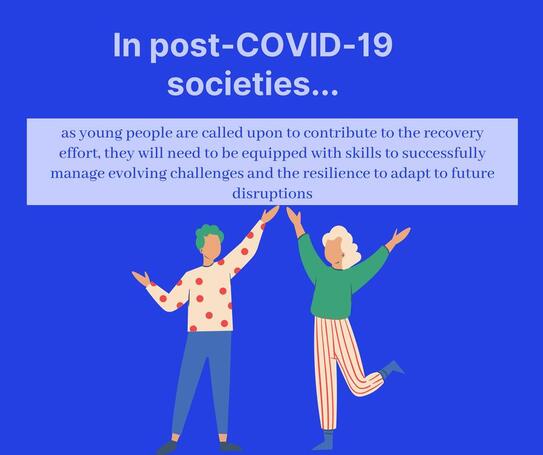
WORLD YOUTH SKILLS DAY FOCUSES ON RESILIENCE
The number of young people not in education, employment or training (NEET) is estimated to rise to 273 million in 2021. According to UNESCO, 1 in 6 youth are out of work due to the impact COVID-19 has had in many locations. UNESCO further notes that lockdown measures have led to the closure of technical and voctaional training facilities, which impacts youth skills development. Almost 70 per cent of the world's learners are affected by school closures.
At the same time, youth will be tapped to help contribute to the recovery process. In order to do that, they need skills to navigate challenges and to develop resilience to future crises. This presents a challenge to the Vincentian Family to support activities which help ensure youth have a future which includes meaningful work.
July 15 is World Youth Skills Day. The theme is "Skills for a resilient youth." At the UN, a special event was held to assess COVID-19 effects on skills development and consider way to respond to the current economic crisis.
The International Labor Organization also launched a Toolkit for Quality Apprenticeships, Volume II for Practitioners. It can be downloaded from a link on this page: https://www.skillsforemployment.org/KSP/en/Details/?dn=EDMSP1_263233
The ILO also announced that its first ILO Skills Challenge Innovation Award winner is the Domestic Worker Centre, an initiative of the Domestic Workers Association of Zimbabwe, for a proposal to provide specialist training in modern domestic skills to improve workers’ employability.
World Youth Skills Day is organized by the United Nations to draw attention to the opportunities and challenges facing young people in terms of employment.
The number of young people not in education, employment or training (NEET) is estimated to rise to 273 million in 2021. According to UNESCO, 1 in 6 youth are out of work due to the impact COVID-19 has had in many locations. UNESCO further notes that lockdown measures have led to the closure of technical and voctaional training facilities, which impacts youth skills development. Almost 70 per cent of the world's learners are affected by school closures.
At the same time, youth will be tapped to help contribute to the recovery process. In order to do that, they need skills to navigate challenges and to develop resilience to future crises. This presents a challenge to the Vincentian Family to support activities which help ensure youth have a future which includes meaningful work.
July 15 is World Youth Skills Day. The theme is "Skills for a resilient youth." At the UN, a special event was held to assess COVID-19 effects on skills development and consider way to respond to the current economic crisis.
The International Labor Organization also launched a Toolkit for Quality Apprenticeships, Volume II for Practitioners. It can be downloaded from a link on this page: https://www.skillsforemployment.org/KSP/en/Details/?dn=EDMSP1_263233
The ILO also announced that its first ILO Skills Challenge Innovation Award winner is the Domestic Worker Centre, an initiative of the Domestic Workers Association of Zimbabwe, for a proposal to provide specialist training in modern domestic skills to improve workers’ employability.
World Youth Skills Day is organized by the United Nations to draw attention to the opportunities and challenges facing young people in terms of employment.
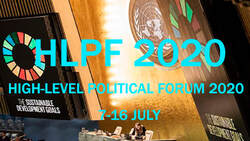
VIRTUAL HIGH LEVEL POLITICAL FORUM GETS UNDERWAY
BY: Margaret O'Dwyer, DC
Imagine people globally coming together to share their vision of a better future. That is the UN's High Level Political Forum, taking place July 7-16. Although it usually is held in New York, this year's HLPF is taking place virtually. Many high level events can be seen by going to UN Web TV at this link: http://webtv.un.org/
You can see the list of each day's activities by goingto the following link and clicking on a particular day. Some events require registration. https://sustainabledevelopment.un.org/hlpf/2020#programme
The purpose of the HLPF is to assess how countries are faring in achieving the UN's 17 Sustainable Develpment Goals (SDGs). 47 countries have volunteered to be reviewed in terms of SDG progress this year.
The opening day began with a video related to youth, speaking of both the challenges and opportunities caused by COVID-19. In convening the event, Mona Juul, President of the UN's Economic and Social Council (ECOSOC) called for "all hands on deck" in working towards the Goals. She noted that COVID-19 has had an impact on their achievement, in some cases, causing a reversal in progress. A "powerhouse" of ideas, innovation, and ambition" is needed, she said.
Several common threads emerged as the first day's events took place. Among them were themes of "building back better," reasssessing perspectives on economics so that economics are more responsive to real needs; the importance of collaboration, technology, and innovation in achieving the SDGs and recovering from COVID; COVID recovery that is environmentally sensitive; addressing inequalities; sharing best practices; ensuring that efforts reach the most vulnerable; and more.
A morning session focused upon protecting and advancing well being and ending poverty, which is embodied in SDG 1. A second session spoke of ending hunger. It is clear that over 70 million people will be pushed into poverty because of COVID-19 and its effects.
There was a plethora of side events in the form of panels of speakers. Caritas Internationalis and Caritas Africa held an event about the contributions faith-based organizations are offering in addressing the Sustianable Development Goals in Africa. That event highlighted the impact of COVID-19 and lockdowns on education, particularly in rural areas of Kenya; addressing social need in Liberia; the value of water; and how faith-based organizations approached the Ebola virus in the Democratic Republic of the Congo.
Other side events highlighted issues related to water, climate, the evironment, gender, youth, fashion, energy, trade indigenous peoples, multilaterlaims and building back better.
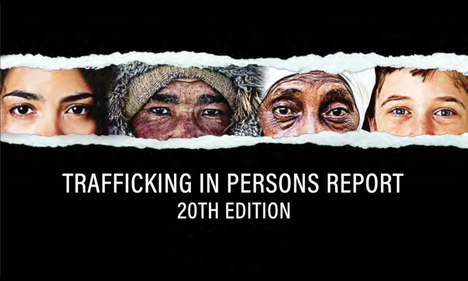 US State Department Photo
US State Department Photo
2020 TRAFFICKING IN PERSONS REPORT RELEASED
By: Margaret O'Dwyer, DC
The 20th Edition of the Trafficking in Persons (TIP) report was released, June 25, by the US Department of State. The document begins by recounting the report’s 20-year history. It then ranks countries by tiers and offers recommendations for meeting standards set by the United States’ 2000 Victims of Trafficking and Violence Protection Action.
The report can be accessed at this link:
https://www.state.gov/wp-content/uploads/2020/06/2020-TIP-Report-Complete-062420-FINAL.pdf
The report includes references to trauma bonding, accountability for UN peacekeepers, faith-based efforts to combat human trafficking, human trafficking of athletes, commercial child sexual exploitation and abuse, reengineering health care for survivors of human trafficking, and the links between human trafficking and addiction. It also provides data, mentions ant trafficking heroes, organizations addressing trafficking, child soldiers, and country narratives.
Countries are ranked in several tiers, from 1 to 3. Those falling in Tier 3 fail to comply with minimum standards for the elimination of trafficking or make insufficient efforts to come into compliance. Tier 3 nations also risk losing nonhumanitarian, non trade-related foreign assistance from the US.
The report reflects that 22 countries moved upward to a new tier this year, many from Subsaharan Africa. Three countries—Romania, Saudia Arabia, and Ireland—slipped from Tier 1 to Tier 2.
UN Secretary General Antonio Guterres has said of human trafficking, that it “is a heinous crime happening all around us. The victims—30% of which are children—are subject to forced labour, seual exploitation and other forms of abuse. We must do more to bring criminals to justice, and help victims rebuild their lives.”
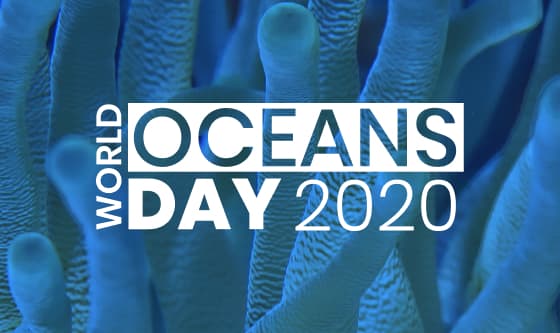
OCEANS DAY FOCUSES ON INNOVATION AND SUSTAINABILITY
By: Margaret O'Dwyer, DC
Did you know that organisms discovered at extreme depths are used to speed up the detection of COVID-19? That is only one reason to celebrate Ocean's Day, which takes place on Monday, June 8. The theme is "Innovation for a Sustainable Ocean."
Other reasons to hold an Oceans Day is to call people to action to address ocean ills. For example, 80 percent of marine pollution comes from land based activities, according to National Geographic. Some parts of the ocean are experiencing dead zones. Illegal fishing contributes to the depletion of fish stocks. And oceans are experiencing greater acidification which affects coral and other marine life.
To honor Oceans Day, the United Nations will host an event from 10 a.m. to 5 p.m. EDT Monday, June 8. It will include keynote speeches, panels, and presentations. Among issues and event to be covered are the state of the ocean, solutions for problems related to oceans, deep sea exploration, a multicultural conversation regarding ocean explorations, technology, announcement of a photo competition winner, innovation for sustaining the ocean, a blue economy, and a concert. You can RSVP to watch the event virtually at this link: https://unworldoceansday.org/2020
A variety of other events are taking place. You can find a list at the following link, but it is important to read carefully about whether the events are digital or their dates have been changed due to COVID 19 precautions. https://unworldoceansday.org/events-map
You can locate resources related to oceans, including student curriculum, at this link: https://unworldoceansday.org/index.php/resources
Various people globally are making commitments related to oceans, such as cleaning them up or working to end the depletion of fish stocks. What can we do?
According to the UN, the purpose of Oceans Day is to remind everyone of the major role the oceans have in everyday life. They are the lungs of our planet, providing most of the oxygen we breathe. The purpose of the Day is to inform the public of the impact of human actions on the ocean, develop a worldwide movement of citizens for the ocean, and mobilize and unite the world’s population on a project for the sustainable management of the world's oceans. They are a major source of food and medicine and a critical part of the biosphere. In the end, it is a day to celebrate together the beauty, the wealth and the promise of the ocean.
 A.C.T. Now stands for Act, Confront, Transform. (National Council of Churches image)
A.C.T. Now stands for Act, Confront, Transform. (National Council of Churches image)
US Daughters of Charity Issue Statement on Racism;
UN Secretary General Reiterates Call to End Racism
By Margaret O'Dwyer, DC
The two Provinces of the Daughters of Charity of the United States have issued a statement regarding the recent murder of George Floyd in Minnesota, US, by a police officer. The officer had knelt on Mr. Floyd's neck for 8 minutes, 46 seconds, with the victim uttering, "I can't breathe." Other police officers and bystanders did nothing to assist the dying man. This event has spawned massive protests calling for racial justice, because Mr. Floyd is one of many black Americans killed by law enforcement.
The Daughters' statement speaks of outrage at Mr. Floyd's death and solidarity with his family and friends. It speaks of all suffocating when a brother or sister cannot breathe, begs to be released, or dies of asphyxiation. It calls for a commitment to confront racism within ourselves and wherever we encounter it, and to confront institutional racism. It furthers asks for forgiveness for our own complicity in institutional racism. And it calls for systemic change nationally.
The statement can be found at this link: https://daughtersofcharity.org/in-the-news/george-floyd/
You may ask, "What has the UN done to eradicate racism?"
The United Nations Committee on the Elimination of Racial Discrimination is an independent body of experts who monitor how member states (countries) implement the UN's International Convention on the Elimination of all forms of Racial Discrimination, which was adopted in 1965 and entered into force in 1969. An example of a Committee response to racism related to a car attack on peaceful protesters in Charlottesville, Virginia, in August, 2017. The Committee asked for a full investigation into the root causes of such actions. It further called upon the US government and political leaders to "unequivocally and unconditionally" reject and condemn racist hate speech and crimes. The link to the Committee's web site is as follows: https://www.ohchr.org/en/hrbodies/cerd/pages/cerdindex.aspx
It named a decade for People of African Descent, from 2015-2024. The following link offers a list of achievements reported by States, human rights bodies, mechanisms and specialized agencies of the United Nations system, regional organizations, national human rights institutions and non-governmental organizations, to improve the rights of people of African descent. https://www.un.org/en/observances/decade-people-african-descent/actions-taken But much more must be done as is evident by the number of unarmed people killed by law enforcement in the United States and ethnic violence in other world locations.
Plan to address hate speech: In June, 2019, the United Nations launched a plan to "identify, prevent, and confront hate speech." The plan's foundation is the need to respect human rights of all persons. At the time, UN Secretary General, Antonio Guterres noted a groundswell of xenophobia, racism and intolerance, violent misogyny, anti-Semitism and anti-Muslim hatred, saying that in some places, Christian communities were also being systematically attacked. He mentioned how hateful and destructive views are amplified through social media.
The plan calls for addressing violence, marginalization, discrimination, and poverty, as well as strengthening weak state institutions. The plan can be addressed at this link: https://www.un.org/en/genocideprevention/documents/advising-and-mobilizing/Action_plan_on_hate_speech_EN.pdf
A consistent call to end racism: UN Secretary General Antonio Guterres has repeatedly issued appeals to end hate speech, racism, xenophobia, and genocide. In March, Mr. Guterres had called for confronting and ending racism, " Racism continues to play a strong role in our world," he said. "Racism is the reason why outside Africa, people of African descent are often among the last in line for health care, education, justice and opportunities of all kinds. We need to raise our voices against all expressions of racism and instances of racist behaviour. We urgently need to dismantle racist structures and reform racist institutions."
He reiterated that call following Mr. Floyd's death. "We must raise our voices against all expressions of racism and instances of racist behaviour. We urgently need to dismantle racist structures and reform racist institutions," he said.
Michelle Bachelet, head of the UN Office of the High Commissioner for Human Rights, commented, “I am dismayed to have to add George Floyd’s name to that of Breonna Taylor, Eric Garner, Michael Brown and many other unarmed African Americans who have died over the years at the hands of the police -- as well as people such as Ahmaud Arbery and Trayvon Martin who were killed by armed members of the public.”
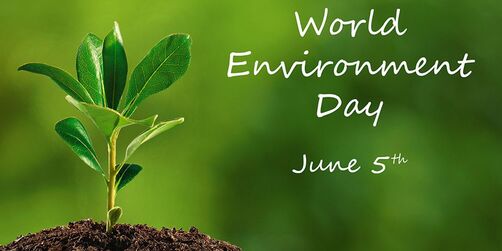
WORLD ENVIRONMENT DAY--"CELEBRATE BIODIVERSITY" AND "TIME FOR NATURE"
By Sr. Margaret O'Dwyer, DC
(With information from the
UN's Environmental Programme)
A reduction in travel and energy use during the Covid-19 crisis seems have had a positive impact on the environment. In example, many of us have seen images of cities with lessened smog or animals venturing out into areas that were previously too trafficked for their safety. It conveys that addressing climate issues and improving the environment is possible with concerted global effort. On the other hand, organizations such as Conservation International report the negative impacts of Covid-19 on the environment--an increase in deforestation, mining, and poaching of items such as bush meat and ivory.
It is as if Mother Nature is trying to tell us something--that protection of the environment is a vital component of caring for humanity.
Nature will be the focus Friday, June 5, during World Environment day. The United Nations will honor the theme, "Celebrate Biodiversity," in keeping with the current decade on biodiversity. World Environment Day organization will follow the theme, “Time for Nature,” with support from the UN Environment Programme (UNEP). According to UNEP, World Environment Day is the United Nations’ flagship day for promoting worldwide awareness and action for the environment. Over the years, it has grown to be the largest global platform for environmental public outreach and is celebrated by millions of people in more than 100 countries.
A variety of webinars and activities can be found at this link: https://www.worldenvironmentday.global/latest/featured-updates
You can take a biodiversity quiz at this link: https://www.worldenvironmentday.global/did-you-know/take-quiz
“2020 is a year for urgency, ambition and action to address the crisis facing nature; it is also an opportunity to more fully incorporate nature-based solutions into global climate action,” said Inger Andersen, Executive Director of the UNEP. “Each year, World Environment Day is a powerful platform to accelerate, amplify and engage people, communities and governments around the world to take action on critical environmental challenges facing the planet."
There is less than a year before the world meets for the fifth session of the United Nations Environment Assembly, the UN’s highest-level environmental forum. The event takes place in Nairobi, Kenya. The theme will be, "Strengthening Actions for Nature to Achieve the Sustainable Development Goals."
The fifth session in Nairobi will take place from 22 – 26 February 2021. It will follow the critical UN Ocean Conference in June 2020, the UN Biodiversity Conference in October 2020 – where countries will meet to make decisions on the future of protecting biodiversity, as well as the UN Climate Change Conference (COP 26) in November 2020 at which governments will be expected to deliver transformational and ambitious changes needed to effectively address the climate crisis
|
|
Visit to the United Nation in Geneva
By Sr. Franca Edet, DC Sister Franca Edet, DC, who is a member of the Daughters of Charity United Nations Advisory Group, had the opportunity to visit the Daughters of Charity in Geneva and to visit the UN there. She joined Sister Catherine Prendergast, the Daughters of Charity Representative to the UN in Geneva, on her tour. Late last fall, some of our Daughters of Charity serving in the Mother House came to the front door to join Sisters Marie Raw, Margaret O’Dwyer, and Maria Teresa Mueda, to wish Sr. Catherine Prendergast and myself a safe journey to Geneva. We started our train journey from Gare du Lyon. On arrival at the big train station in Cornavin, Geneva, we took a short walk to the tram on Route 15, which took us straight to the Community house, where we received a very warm welcome from Sr. Louise Pittet and Sr. Marguerite Cruz, who were expecting us. Morning came and evening came, the first day. Because the following day was a Saturday, United Nations offices were not opened. We took a tram ride to town, stopping at the “Palace of Nations,” as the UN building is called in Geneva. My first point of fascination was the sight of a giant chair, across from the Palace of Nations with one of its four legs broken. I looked at it with great interest wondering, “What could this symbolic artifact represent?” A closer examination revealed a plaque explaining that it was an original Paul Vermuelen project. (He was Co-founder and Director of Handicap International Suisse.) The purpose of this project was to get as many nations as possible to sign the Ottawa Treaty on Landmines (also called the “Mine Ban Treaty”) in December, 1997, which became effective on March 1, 1999. The chair with one broken leg represents millions of people in different war zones of our world who have lost their limbs as a result of explosive landmines. The arena where this chair is placed is also the location of much peaceful protest. What came to mind is that activism, as we know, can have some lasting effects. However, it takes concerted effort to see it through. Meanwhile 21 years after the treaty took effect, we continue to witness victims of war-torn areas being disfigured with weapons of war and terrorism. This begs the big question, “What happened to the Ottawa Treaty and how faithful have nations been in their adherence to this policy?” It was also quite an emotional experience to see the array of flags of the different countries displayed in front of the Palace of Nations. From that point, we walked uphill to headquarters for the International Committee of the Red Cross. This exquisite building is opposite the side entrance of the United Nations grounds and buildings. Sr. Catherine and I took the opportunity to visit the Red Cross Museum, where we had an electronic guided tour of the different Red Cross interventions in various wars, beginning with the First World War. The experience was both emotional and fascinating. Our next port of call was a visit to Lake Geneva, which is only a short distance from the Palace of Nations. There again, we had some wonderful views of the city and a boat ride on the Lake. Since it was Saturday, UN offices were not opened, so we used this day for sightseeing and leisure walks. At the end of our tour, we attended Mass in the Cathedral in Geneva that evening and returned to the community with a great sense of achievement. Morning came and Evening came; the second day. Sunday--the third day--was quiet, but offered another experience of mission and faithful presence among the people of God. The local community is made up of three very lovely sisters. Sr. Louise is the local sister servant. Sr. Marguerite just turned 100 years old in April. Sr. Catherine is also a member of the small community. She joins the other two for prayers and meals. The apartments are like council blocks belonging to Caritas international. On the morning of that Sunday, we went to Mass in a church not far from the sisters’ house. At the end of Mass, Sr. Marguerite, despite her great age, stood with the priest outside the church to welcome and chat with the various families in attendance. Sr. Marguerite is as sharp and agile as can be. She does her chores in the house and takes charge of the washing machine and other practical tasks. Sr. Louise attends to families living in the apartments, listening and advising them about their concerns, as needs arise. The people who visit the sisters have great trust and know that the sisters are there for them. Evening came and Morning came, the third day. On Monday--the fourth day-- we made a visit to the United Nations, where I now needed a badge that would allow me access to the UN Building and to attend meetings and sessions. This experience was a friendly one; visitors were treated with the utmost respect and integrity. I just had to present a reference letter from the Mother House, and my international passport for verification. In a very short time, my access badge was processed and printed. This badge is renewable after expiration and gives you access to the UN buildings and to attend the meetings, country reviews and conventions when in session. After I received the badge, I was able to join the thousands of visitors who came for different purposes. We were all put in language groups and I joined the English-speaking group for a comprehensive tour of the UN building and the different conference halls. It took more than an hour to cover what was possible, and, by then, our footsteps registered in the thousands. After the tour, I joined up with Sr. Catherine, and we attended a country review of interventions on violence against women from Angola, Slovenia and Brazil. All information was simultaneously translated, just as occurs at the Mother House. However, this was a much larger and more sophisticated space. The process of reporting and interaction was convivial. At the end of every session, the chairperson congratulated and encouraged presenters. Moments were given to intervention, interaction and some critical reflection. It was an exhausting day, but worthwhile. Morning came and evening came, the fourth day. The fifth day was dedicated to visiting the different nongovernmental organizations (NGOs) that collaborate with the UN to ensure that adequate attention is given to issues needing to be brought to public notice or included in conventions. NGOs in Geneva work together to lobby, advocate, and campaign primarily on issues of human rights. NGOs have their office in a building on a side street not far away from the Palace of Nations. The property holder is Franciscans International; while groups like the Dominicans, Christian Brothers, Presentation Brothers and other faith based organizations rent a space from the Franciscans. Sr. Catherine is now renting a desk there for Daughters of Charity representatives. In this Office, there were a lot of young people on internship and on-the-job training. Along with them are researchers, who eventually hope to work in the field of international relations or on the current issues of migration, human trafficking, refugees, homelessness, climate change and the like, all in connection with human rights. I had an extensive interview over lunch with a young lady working for the Christian Brothers and her area of interest is human trafficking. She has, in the past, encountered Sr. Olivia Umoh, DC, at the Talitha Cum Conference in Rome, and she would like to make further connection with the Human Trafficking Project in Benin, the Street Child Project in Port Harcourt, Nigeria, and the Street Child Project in Kumasi, Ghana. At mid-day, we attended Mass in the Franciscan Church, which is near enough to the Palace of Nations. At the end of a well spent day, we returned back to a warm and gracious welcome by the Community. Since the sisters had been spending time to look after us every time we returned from the city, I offered to cook the dinner, as a mark of appreciation and thank you for all the hospitality I received from our three sisters. The sisters happily allowed me to do so, and we all enjoyed a good hot meal, after which I had to get ready for my journey home the next day. Evening came and Morning came, the last day. The final day, I set out on my journey back to London with a great sense of gratitude for the wonderful opportunity I have been given. I am grateful to Sr. Marie Raw and Sr. Catherine Prendergast for this wonderful opportunity, to Sr. Ellen Flynn and her Council for the support they give to me each time I need to travel for meetings, and to my two great companions, Sr. Johannah O’Connor and Sr. Patricia Maxwell, for their gracious companionship and for the warm welcome home I receive from them in all my comings and goings. The learning and experience of the visit to Geneva can never be underestimated. This is because it carries with it the warmth of hospitality, community and friendship, as well as, the beauty of collaboration, internationality, diversity and synergy. It is an experience that refreshed my soul with some sense of sacredness, and released a wellspring of excitement in the joy of being part of a family that is bigger than me. A family that inspires creativity and excellence in mission. A family that hears beyond the laughter of each individual into the deep laughter of God. Therefore as I carry these sentiments of possibilities and encounter, a prayer rises in my heart that says: “From the rising of the sun to the going down of the same, the name of the Lord shall be blessed in all things” (Psalm 113: 3.). All that has been is a God-incident and all that will ever be is a “yes” and a “thank you.” |
FOR INTERNATIONAL MOTHER EARTH DAY, UN FOCUSES ON BIODIVERSITY
By Margaret O’Dwyer, DC
With information from the UN
We can expect awareness raising, clean-up projects, tree-planting, and advocacy to reduce carbon emissions, next Wednesday, April 22, as millions globally celebrate the 50th anniversary of Earth Day. Perhaps you have planned an ecologically friendly activity for that day.
What began half a century ago as a means of promoting awareness and education about the environment has grown exponentially. Earth Day’s theme is climate action.
Coinciding with Earth Day is the United Nations’ International Mother Earth Day. The UN designated April 22 as International Mother Earth Day 11 years ago. The theme this year relates to biodiversity, although the UN has also engaged in continuous efforts to address climate change.
The UN considers International Mother Earth Day a collective responsibility, as called for in the 1992 Rio Declaration on Environment and Development, to promote harmony with nature and Earth. Such harmony can help achieve a just balance among the economic, social, and environmental needs of present and future generations.
This year’s International Mother Earth Day coincides with the Super Year of Biodiversity, and is focused on biodiversity’s role as an indicator of Earth’s health. Representatives met in Rome in February to plan a course of action for safeguarding biodiversity. As part of the Super Year of Biodiversity, the UN will highlight updates from around the UN system, calling attention to the fact that the future of humanity depends on action now.
WHY BIODIVERSITY AS A THEME
Why biodiversity? One reason is that we are currently witnessing the potential extinction of approximately a million species of plants and animals, according to a 2019 Intergovernmental Science-Policy Platform on Biodiversity and Ecosystem Services (IPBES). This rate is more than 1,000 times greater than at any other time recorded in human history. The report also reflects that seventy-five per cent of Earth’s land surface is significantly altered, 66 per cent of the ocean area is experiencing increasing cumulative impacts, and over 85 per cent of wetlands (area) have been lost. We have only to think of constant deforestation of the Amazon as an example of human impact upon ecosystems.
The report can be accessed at this link: https://ipbes.net/sites/default/files/202002/ipbes_global_assessment_report_summary_for_policymakers_en.pdf
Last year, UN Secretary General, Antonio Guterres said of biodiversity, “We need healthy ecosystems to achieve the Sustainable Development Goals and to address climate change: they can provide 37 % of the mitigation needed to limit global temperature rise.”
According to the UN, The loss of biodiversity can have significant direct human health impacts if ecosystem functions are no longer adequate to meet social needs. Indirectly, changes in ecosystem services affect livelihoods, income, local migration and, on occasion, may even cause political conflict.
A very relevant link between biodiversity (and impairments to it) and Earth’s health relates to the current COVID-19 crisis and other zoonotic diseases. A new infectious disease emerges in humans every 4 months, according to the UN’s Environment Program. Three fourths of them come from animals (as apparently did COVID-19). A healthier ecosystem would make it more difficult for pathogens to spread rapidly.
Climate change, man-made changes to nature as well as crimes that disrupt biodiversity, such as deforestation, land-use change, intensified agriculture and livestock production or the growing illegal wildlife trade, can increase contact and the transmission of infectious diseases from animals to humans (zoonotic diseases) like COVID-19, the UN notes.
WHAT CAN I DO TO PROMOTE BETTER BIODIVERSITY?
What can you do to help improve biodiversity? Some ideas include volunteering to create or maintain nature preserves; buying sustainable products; encouraging legislators to take action to protect biodiversity; protecting bees; reducing the use of fertilizers, and staying on pathways along hiking trails.
WHAT DOES THE UN DO FOR THE ENVIRONMENT?
The UN regularly addresses the environment and ecosystems in a variety of ways. Its Environment Programme assesses global, regional, and national environmental conditions and trends. It develops international and national environmental instruments, and strengthens institutions for wise management of the environment. Its work falls into seven broad categories: climate change, disasters and conflicts, ecosystem management, environmental governance, chemicals and waste, resource efficiency, and environment under review. It operates with a view of sustainability.
In 1994, the UN initiated the UNFCCC (United Nations Framework Convention on Climate Change). Its focus is to prevent dangerous human interference with the climate system.
The UN also commemorates annual days and schedules events to raise awareness about such topics as water, oceans, biodiversity, forests, rivers, mountains, wildlife, the environment as a whole, preservation of the ozone, habitats, and more. The UN Environment Programme annually honors Champions of the Earth; those who come up with bold and creative ideas for environmental justice, environmental protection, and the defense of natural resources.
The United Nations Environmental Assembly meets biennially in Nairobi, Kenya, to set priorities for global environmental policies and develop international environmental law. It is the governing body of the UN’s Environmental Programme. First meeting in 2014, it has convened four sessions. The next takes place from February 22-26, 2021.
In 2017, the UN launched its Faith for Earth Initiative. It inspires faith organizations to advocate for protecting the environment and supporting the implementation of the Sustainable Development Goals, and encourages faith leaders to communicate with decision makers and the public.
The UN engages in many more environmental activities.
UN AND CLIMATE CHANGE
In addition to biodiversity—this year’s theme of International Mother Earth Day--climate change (Earth Day’s theme) has been a continuous UN focus. The United Nations Climate Change Conferences (known as COP, or Conferences of the Parties) are normally held annually. (COP 26, planned to take place in Glasgow in November, has been postponed).
It was during the 2015 COP meeting that member states approved the Paris Agreement, which united nations in addressing climate change. The Agreement’s purpose was to strengthen the global response to the threat of climate change by keeping the global temperature rise this century well below 2 degrees Celsius above pre-industrial levels, and to try to limit the temperature increase to 1.5 degrees Celsius.
At the last COP meeting, held in December in Madrid, UN Secretary General Antonio Guterres cautioned that the world has the scientific knowledge and technical means to limit climate change but lacked the political will.
“The point of no return is no longer over the horizon,” Guterres told reporters gathered in Madrid, “It is in sight and hurtling toward us.” He has called climate change an “emergency.”
The UN’s Emissions Gap Report 2019 (by the UN Environment Programme) focuses on progress related to climate action. The Report shows that the world is not on target to reduce the level of emissions called for in the Paris Agreement. It also shows that G20 countries account for 78 percent of greenhouse gas emissions. (The G20 includes 19 countries and the European Union). The Report can be accessed in various languages at this link: https://www.unenvironment.org/resources/emissions-gap-report-2019
However we celebrate Earth Day or International Mother Earth Day, let’s all do one thing to ensure that the beauty and sustainability of Earth is protected for those generations which follow us.
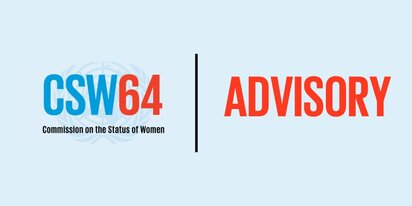
UN's 64th COMMISSION ON THE STATUS OF WOMEN SHORTENED
By: Margaret O'Dwyer
(With UN Women/Plan International/UNICEF Press Release)
Considerable energy went into planning the 64th United Nations Commission on the Status of Women, which had been scheduled to begin March 9. Thousands of people were expected to convene at UN Headquarters in New York for two weeks of discussion about progress made, and challenges remaining, related to the status of women and girls since the Beijing Declaration and Platform for Action 25 years ago.
But because of concerns related to the Corona virus (COVID 19), the Commission has been reduced to one day. The Commission will convene only on Monday, March 9, at 10.00 a.m. (EST), for a procedural meeting. The meeting will include opening statements, followed by the adoption of the draft Political Declaration and action on any other draft resolutions. The session will then suspend until further notification. No general debate will take place and all side events planned by Member States the UN system, or NGOs in conjunction with CSW 64 will be cancelled.
This would have been a landmark opportunity, given that it is the 25th anniversary of the Beijing Declaration and Platform, to assess realities related to the rights of women and girls. It has yet to be determined whether the Commission will convene again at a later date, at which time NGOs could more deeply engage. However, at least having an adopted declaration will provide member states with some guidance for action.
So, how are women and girls faring in 2020? A March 4 press release by UN Women reflects uneven progress. In example, more girls are attending school and staying in school than ever before. In fact, in the last decade, more girls than boys are likely to be in secondary school.
However, it is not necessary a more equal or less violent world for them.In 2016, for example, women and girls accounted for 70 per cent of detected trafficking victims globally, most for sexual exploitation. An astonishing 1 in every 20 girls aged 15-19 – around 13 million – has experienced rape in their lifetimes, one of the most violent forms of sexual abuse women and girls can suffer.
"Twenty-five years ago, the world’s governments made a commitment to women and girls, but they have only made partial good on that promise. While the world has mustered the political will to send many girls to school, it has come up embarrassingly short on equipping them with the skills and support they need not only to shape their own destinies, but to live in safety and dignity,” said UNICEF Executive Director Henrietta Fore. “Access to education is not enough – we must also change people’s behaviours and attitudes towards girls. True equality will only come when all girls are safe from violence, free to exercise their rights, and are able to enjoy equal opportunities in life.”
Harmful practices such as child marriage and female genital mutilation (FGM) continue to disrupt and damage the lives and potential of millions of girls globally. Each year, 12 million girls are married in childhood, and 4 million are at risk of FGM. Globally, girls aged 15-19 are as likely to justify wife-beating as boys of the same age.
“Since 1995 in Beijing, when a specific focus on ‘girl child’ issues first emerged, we have increasingly heard girls assert their rights and call us to account. But the world has not kept up with their expectations of responsible stewardship of the planet, a life without violence, and their hopes for economic independence,” said UN Women Executive Director Phumzile Mlambo-Ngcuka. “As long as women and girls have to use three times the time and energy of men on looking after the household, equal opportunities for girls to move from school into good jobs in safe workplaces are going to be out of reach. For everyone’s sake that’s got to change, along with making sure that the skills girls learn are right for the new tech and digital jobs of the future, and that the violence against them ends.”
A report entitled, A New Era for Girls: Taking stock on 25 years of progress, has been produced in keeping with a current Generation Equality Campaign and the 25th Anniversary of meetings in Beijing. In addition to mentions of education and violence, it also addresses nutrition and mental health issues. It can be downloaded from this site: https://data.unicef.org/resources/a-new-era-for-girls-taking-stock-of-25-years-of-progress/
By: Margaret O'Dwyer
(With UN Women/Plan International/UNICEF Press Release)
Considerable energy went into planning the 64th United Nations Commission on the Status of Women, which had been scheduled to begin March 9. Thousands of people were expected to convene at UN Headquarters in New York for two weeks of discussion about progress made, and challenges remaining, related to the status of women and girls since the Beijing Declaration and Platform for Action 25 years ago.
But because of concerns related to the Corona virus (COVID 19), the Commission has been reduced to one day. The Commission will convene only on Monday, March 9, at 10.00 a.m. (EST), for a procedural meeting. The meeting will include opening statements, followed by the adoption of the draft Political Declaration and action on any other draft resolutions. The session will then suspend until further notification. No general debate will take place and all side events planned by Member States the UN system, or NGOs in conjunction with CSW 64 will be cancelled.
This would have been a landmark opportunity, given that it is the 25th anniversary of the Beijing Declaration and Platform, to assess realities related to the rights of women and girls. It has yet to be determined whether the Commission will convene again at a later date, at which time NGOs could more deeply engage. However, at least having an adopted declaration will provide member states with some guidance for action.
So, how are women and girls faring in 2020? A March 4 press release by UN Women reflects uneven progress. In example, more girls are attending school and staying in school than ever before. In fact, in the last decade, more girls than boys are likely to be in secondary school.
However, it is not necessary a more equal or less violent world for them.In 2016, for example, women and girls accounted for 70 per cent of detected trafficking victims globally, most for sexual exploitation. An astonishing 1 in every 20 girls aged 15-19 – around 13 million – has experienced rape in their lifetimes, one of the most violent forms of sexual abuse women and girls can suffer.
"Twenty-five years ago, the world’s governments made a commitment to women and girls, but they have only made partial good on that promise. While the world has mustered the political will to send many girls to school, it has come up embarrassingly short on equipping them with the skills and support they need not only to shape their own destinies, but to live in safety and dignity,” said UNICEF Executive Director Henrietta Fore. “Access to education is not enough – we must also change people’s behaviours and attitudes towards girls. True equality will only come when all girls are safe from violence, free to exercise their rights, and are able to enjoy equal opportunities in life.”
Harmful practices such as child marriage and female genital mutilation (FGM) continue to disrupt and damage the lives and potential of millions of girls globally. Each year, 12 million girls are married in childhood, and 4 million are at risk of FGM. Globally, girls aged 15-19 are as likely to justify wife-beating as boys of the same age.
“Since 1995 in Beijing, when a specific focus on ‘girl child’ issues first emerged, we have increasingly heard girls assert their rights and call us to account. But the world has not kept up with their expectations of responsible stewardship of the planet, a life without violence, and their hopes for economic independence,” said UN Women Executive Director Phumzile Mlambo-Ngcuka. “As long as women and girls have to use three times the time and energy of men on looking after the household, equal opportunities for girls to move from school into good jobs in safe workplaces are going to be out of reach. For everyone’s sake that’s got to change, along with making sure that the skills girls learn are right for the new tech and digital jobs of the future, and that the violence against them ends.”
A report entitled, A New Era for Girls: Taking stock on 25 years of progress, has been produced in keeping with a current Generation Equality Campaign and the 25th Anniversary of meetings in Beijing. In addition to mentions of education and violence, it also addresses nutrition and mental health issues. It can be downloaded from this site: https://data.unicef.org/resources/a-new-era-for-girls-taking-stock-of-25-years-of-progress/
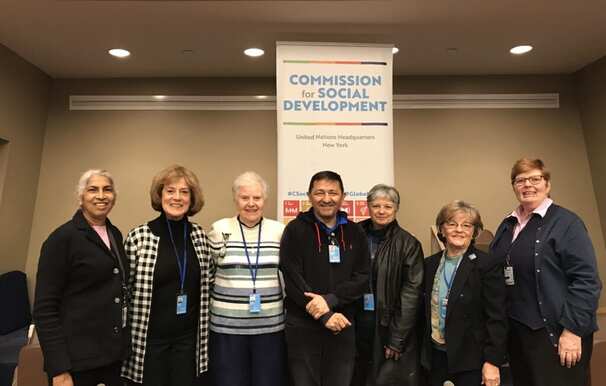
A Roadmap for Advocacy to End Homelessness
by Teresa Kotturan, SCN | Feb 27, 2020
For more than two years, Vincentian Family NGOS have been collaborating with other NGOS at the UN to promote a resolution which would address homelessness. The Commission for Social Development adopted such a resolution on February 19, 2020. Sr. Teresa Kotturan, SCN, NGO Representative of the Sisters of Charity Federation to the UN, explores the resolution.
Link to Resolution: https://undocs.org/E/CN.5/2020/L.5
The Vincentian Family initiative to end homelessness was announced in October 2017 during the 400th anniversary celebration of its Charism. The Vincentian Family NGOs took up the call to end homelessness for their advocacy at the United Nations along with other NGOs based in New York. The tireless efforts of the NGOs and various Vincentian Family entities from 2018 resulted in having a priority theme: “Affordable housing and social protection systems for all to address homelessness,” for the 58th session of the Commission for Social Development in February 2020.
Although article 25 of the Universal Human Rights (UDHR) states that ‘everyone has the right to adequate housing…’ during its 75 years of existence, the UN had never addressed the issue of homelessness. The 2030 Agenda for Sustainable Development failed to give greater focus to this global problem and included it in SDG 11 on sustainable cities and communities: “Ensure access for all to adequate, safe and affordable housing and basic services and upgrade slums.”
In this context, the 58th Session of the Commission for Sustainable Development has historic significance. For the first time, the UN has issued a resolution on homelessness, describing it and calling on member states to measure it. It is a testament to the power of advocacy, collaboration and partnerships among NGOs, people who experience homelessness, Member States and the UN.
What are some significant outcomes from the resolution? Members of the Civil Society, through its declaration had asked the Commission for the international consensus on housing as a basic human right and a vital component of the right to an adequate standard of living, as expressed in UDHR 25. This is reflected in #4 of the resolution: “Calls upon Member States to ensure the promotion and protection all human rights, in accordance with their obligations under international human rights law, while recognizing that homelessness constitutes a violation of human dignity and may be an obstacle to the fulfillment of all human rights and that urgent national and international action is therefore required to address it.”
The other major ask was for a globally agreed upon language to describe and define homelessness to enable Member States to measure and address the systemic drivers of homelessness. Instead of a definition, there is a detailed description in #7: “Notes that homelessness is not merely a lack of physical housing, but is often interrelated with poverty, lack of productive employment and access to infrastructure, as well as other social issues that may constitute a loss of family, community and a sense of belonging, and depending on national context, can be described as a condition where a person or household lacks habitable space, which may compromise their ability to enjoy social relations, and includes people living on the streets, in other open spaces or in buildings not intended for human habitation, people living in temporary accommodation or shelters for the homeless, and, in accordance with national legislation, may include, among others, people living in severely inadequate accommodation without security of tenure and access to basic services.”
How many people are homeless in our world? In the absence of an agreed definition, no reliable data is available. Census data from most countries do not reflect the real number of homeless people. It is commonly said, “What is not counted, is not valued,” and it is very true of our attitude towards people who experience homelessness.
Another Civil Society request was to make data collection and this is addressed in #12: “Calls upon Member States to collect disaggregated data on demographics, such as by age, sex and disability, related to homelessness and establish categories of homelessness, accompanying the existing measurement tools, and encourages Member States to harmonize the measurement and collection of data on homelessness to enable national and global policy making.”
If all countries acted on their pledge to eradicate poverty in all its forms through the implementation of the 2030 Agenda for Sustainable Development, the Paris Climate Agreement and the Addis Ababa Action Agenda, the need to revisit these issues would not arise. Given the lack of commitment, it is important that the drivers of homelessness – structural poverty, inequality, unemployment and underemployment, insecure informal employment, illness, disability, discrimination and social exclusion, lack of affordable and accessible housing, forced evictions, rural-urban migration, displacement due to disasters, etc., is addressed in the resolution. To live in dignity, people who homeless need access to basic services, like education, healthcare, employment, minimum wages, women’s participation in labor, and social protections systems. These concerns have been addressed in the following manner:
Member States are encouraged to (#13) “promote affordable and equitable access to basic services, in particular quality formal and non-formal education, at all levels…promote equality and inclusion through the affirmation of the fundamental dignity of the human person, and healthcare, including through the acceleration of the transition towards equitable access to universal health coverage, as well as access to affordable housing, nutrition and food, and access to employment and decent work, information and communications technology and infrastructure, through advancing gender equality and the empowerment of women and girls:”
Member States are invited to (#14) “consider adopting labor market policies that strengthen institutions and provide adequate labor protection to all workers, especially to the most disadvantaged. They are encouraged to (#15) “implement policies that support the full and productive participation of women in the labor market, including women with disabilities, and promote equal pay for equal work or work of equal value, access to childcare facilities, the reconciliation of family and professional life, and the sharing of responsibilities between parents…”
National and local governments are encouraged to (#16) “improve access to affordable housing through integrated housing policies and social protection measures…and to address legal and policy barriers to equal and non-discriminatory access to adequate housing, including for women of all ages and women-headed households…protection against unlawful forced eviction, the provision of adequate emergency and temporary shelter and services and security of tenancy and support for the development of affordable housing…” They are invited to (#17) “collaborate with private sector and local communities, to stimulate the supply of a variety of adequate housing options that are safe affordable, and accessible for members of different income groups.” They are called to (#18) “increase allocations of financial and human resources for the upgrading and, to the extent prevention of slums and informal settlements” is significant, since 1.6 billion people lack adequate housing.
The important role families play in combatting social exclusion is recognized, and “encourages the Member States to enact inclusive and responsive family-oriented policies and programs in education, training, decent work, work-family balance, health care, age sensitive social protection systems and measures, child allowances, etc., to confront social exclusion…(#32) There is a call “to combat discrimination and negative stereotypes against people experiencing homelessness, including by strengthening anti-discrimination laws, advocacy and awareness raising.” (#34)
Affordable housing policy is insufficient to end homelessness without social protection systems and floors to address multiple, often interrelated and complex causes of homelessness. They contribute to the realization of human rights of all people. To this end, Member States are urged to (#21) “establish as quickly as possible and maintain the social protection floors that comprise basic social security, so that those in need can access essential health care, including maternity, newborn, child, long-term and palliative care…basic income security for children, persons of active age who are unable to earn sufficient income, in particular in cases of sickness, unemployment, maternity and disability…and for older persons, as set out in the Social Protection Floors Recommendations, 2012 (No. 202) of the International Labor Organization.” They are invited to formulate and implement national strategies to extend social security and essential social services to people below the poverty line and are negatively affected by climate change and natural and human-made disasters. (#28)
Although the primary responsibility to end homelessness is with the governments, the document is calling upon the UN system, civil society organizations, philanthropists and all other actors to build broad-based partnerships at all levels to raise awareness on homelessness, including family and youth homelessness, and to prevent people from falling into homelessness and support those experiencing homelessness through long term sustainable solutions to end homelessness.
We have a roadmap for our advocacy work ahead at the local, national and global levels.
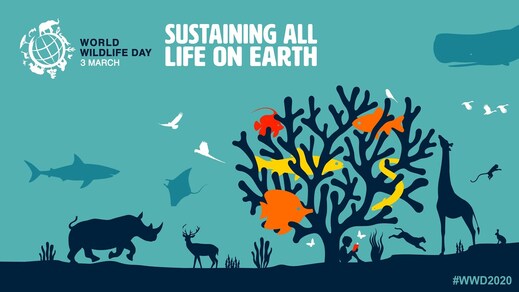
WORLD WILDLIFE DAY FOCUSES ON SUTAINING LIFE
By Margaret O'Dwyer, DC
While serving in the Cook Islands, I never ceased to be amazed and awed by the beauty in nature. The experience of seeing a humpbacked whale breach, the brilliance of a flame tree in bloom, the wonders of techncolor tropical fish, and observing stunning red ginger plants all punctuated the marvels of creation!
On March 3, World Wildlife Day, people globally will honor nature by following the them, "Sustaining All Life on Earth."
The theme connects with UN Sustainable Development Goals 1, 12, 14 and 15, and their wide-ranging commitments on alleviating poverty, ensuring sustainable use of resources, and on conserving life both on land and below water to halt biodiversity loss, according to the UN.
The interlinkages among various types of wildlife are innumerable. But, unsustainable human activities and overexploitation of the species and natural resources that make up the habitats and ecosystems of all wildlife are imperiling the world’s biodiversity. Nearly a quarter of all species are presently at risk of going extinct in the coming decades, and their demise would only speed up the disappearance of countless others, putting us in danger as well, the UN states.
"On this World Wildlife Day, let us remind ourselves of our duty to preserve and sustainably use the vast variety of life on the planet," said UN Secretary General, Antonio Guterres. "Let us push for a more caring, thoughtful and sustainable relationship with nature. A world of thriving biodiversity provides the foundation we need to achieve our Sustainable Development Goals of a world of dignity and opportunity for all people on a healthy planet."
Awareness-raising about wildlife and threats to it, will be a key component of World Wildlife Day. At the UN in New York, a David Attenborough Film, "Wild Karnataka," will be shown. In addition, 7 wildlife filmmaking finalists will be announced as part of a film showcase. Selected films will also be shown at the UN in Geneva.
African Symposium’s Inaugural Forum on Wildlife Conservation in Africa is launching on March 3, 2020 on UN World Wildlife Day. The European Commission and UN Environment Programme will launch a new Global Coalition for Biodiversity on 3 March, involving aquariums, botanic gardens, zoos, national parks, science and natural history museums around the world. Other activities in various countries include education about animal and marine life such as elephants, foxes, snow leopards, dolphins, turtles, penguins, aribou, crocodiles, seals, and more. Presentations, art displays, zoo activities, and many other efforts are planned to commemorate the day.
By Margaret O'Dwyer, DC
While serving in the Cook Islands, I never ceased to be amazed and awed by the beauty in nature. The experience of seeing a humpbacked whale breach, the brilliance of a flame tree in bloom, the wonders of techncolor tropical fish, and observing stunning red ginger plants all punctuated the marvels of creation!
On March 3, World Wildlife Day, people globally will honor nature by following the them, "Sustaining All Life on Earth."
The theme connects with UN Sustainable Development Goals 1, 12, 14 and 15, and their wide-ranging commitments on alleviating poverty, ensuring sustainable use of resources, and on conserving life both on land and below water to halt biodiversity loss, according to the UN.
The interlinkages among various types of wildlife are innumerable. But, unsustainable human activities and overexploitation of the species and natural resources that make up the habitats and ecosystems of all wildlife are imperiling the world’s biodiversity. Nearly a quarter of all species are presently at risk of going extinct in the coming decades, and their demise would only speed up the disappearance of countless others, putting us in danger as well, the UN states.
"On this World Wildlife Day, let us remind ourselves of our duty to preserve and sustainably use the vast variety of life on the planet," said UN Secretary General, Antonio Guterres. "Let us push for a more caring, thoughtful and sustainable relationship with nature. A world of thriving biodiversity provides the foundation we need to achieve our Sustainable Development Goals of a world of dignity and opportunity for all people on a healthy planet."
Awareness-raising about wildlife and threats to it, will be a key component of World Wildlife Day. At the UN in New York, a David Attenborough Film, "Wild Karnataka," will be shown. In addition, 7 wildlife filmmaking finalists will be announced as part of a film showcase. Selected films will also be shown at the UN in Geneva.
African Symposium’s Inaugural Forum on Wildlife Conservation in Africa is launching on March 3, 2020 on UN World Wildlife Day. The European Commission and UN Environment Programme will launch a new Global Coalition for Biodiversity on 3 March, involving aquariums, botanic gardens, zoos, national parks, science and natural history museums around the world. Other activities in various countries include education about animal and marine life such as elephants, foxes, snow leopards, dolphins, turtles, penguins, aribou, crocodiles, seals, and more. Presentations, art displays, zoo activities, and many other efforts are planned to commemorate the day.
PERSONS EXPERIENCING HOMELESSNESS HAVE THEIR SAY AT UN
By Margaret O’Dwyer, DC
A tangible energy pervaded the United Nations in New York during the recent 58th Commission for Social Development. The 10-day event concluded yesterday and had focused upon “Affordable Housing and Social Protection for All to End Homelessness.”
Vincentian Family representatives awaited a resolution which was to be finalized Wednesday. It is hoped the document contains a definition of homelessness and a call to count persons experiencing homelessness, so that progress can be monitored.
Energy was stirred by voices of persons experiencing homelessness and by the sense of collaboration among civil society, the UN Department of Economic and Social Affairs, and nations in focusing upon a specific issue.
“It went from ‘engaging’ to ‘moving’ quickly,” commented one observer of a Friday panel in which persons experiencing homelessness told their stories. In some cases, the panelists were made homeless because of abuse. In a role reversal, panelists, who normally answer questions, asked them of the audience, encouraging those at the Commission to move from rhetoric to action.
“What about the commodification of housing?,” asked Liz Madden, who experienced homelessness in Ireland. Her reference was to the shift in housing from a place of social formation, safety, and nurturance, to one of profit-making, with houses improved, flipped, and sold at a premium, destroying neighborhoods and putting housing out of reach for many.
“What are YOU going to do?,” asked another panelist of the audience in Conference Room 4.
It was clear that services for persons facing homelessness ought not be “one size fits all” because each individual’s experience is different. And that persons experiencing homelessness, understandably, want to be involved in decisions which affect them. “Nothing about us without us,” could be heard echoing from the room.
Earlier in the week, on a panel moderated by Mark McGreevy, James Abro offered his points of view about homelessness in New York. Changes in social values and economic practices are leading to spikes in income inequality, homelessness, and unrest, he said.
“Let’s get this one thing straight right now,” said Abro. “There is no such thing as the homelessness. There are only individuals experiencing housing displacement and the reason they are doing so are as unique and varied as there are stars in the sky.”
Abro became homeless after taking care of a parent. Once he achieved housing stabilization, he wrote about his experiences of displacement, noting that the very concept and function of home had changed dramatically.
Most displaced persons he encountered were younger by a generation or more, said Abro.
“The concept of home that I and others of my generation enjoyed-- a safe, stable place to grow up in-- had not been available to them,” he observed. “Youth had parents with low paying jobs, sometimes more than one. Houses were no longer valued as stable places for family to grow in; they were now commodities to be bought and sold in a purposely volatile housing market.”
“When you flip houses for quick profiteering, you also flip people and their families, creating long term human deficits,” Abro said.
Panelist Chris Gardner, whose experiences on the street were portrayed in the movie, The Pursuit of Happyness, made reference to immigrants, noting that 2 percent of the entire population is on the move, from conflicts, revolution, climate change, drugs, and war.
“I know what it means to grab your child, everything that you can carry, and run for your life,” said Gardner, recalling a childhood experience during which his mother, sister, and he quickly gathered their personal belongings and escaped domestic violence by fleeing to another home.
Gardner said that hearts get hardened, senses get numbed, and empathy becomes nonexistent. “That will never change until we as global citizens, leaders, stakeholders, and policy makers ‘add the power of one,’” he said.
“It is added,” said Gardner, “if we all asked ourselves a simple question, ‘what if that was me and my family? What if that was my mother? My father? What if that was my sister, my brother, my son, my daughter?’”
“When you ask that question, you add humanity to the globalization equation,” Gardner commented. “And if we all ask ourselves at every policy meeting, every planning session, every town hall and fireside chat, that question could get infused, ignite and inject the power of one into the globalization equation.”
Gardner said that we must include working women among those who are at risk of becoming homeless. There are parts of the US where working women who are already paid less than their male colleagues, have a very quiet fear --“What if something happens. What if I lost my job? What if my husband lost his job?”
The Commission For Social Development is a primary way civil society can impact policies related to social issues. The Vincentian Family was very present, with Dame Louise Casey and Mark McGreevy, of the Institute of Global Homelessness (IGH), leading or speaking on multiple panels. Roseanne Haggerty, also a member of IGH, shared good practices on a Friday panel. Freek Spinnewijn, a member of the Vincentian Family Homeless Alliance, provided a brief history of homelessness issues at the UN. Fr. Guillermo Campuzano moderated a panel of speakers related to the launch of the book entitled, Street Homelessness and Catholic Theological Ethics.
Sr. Margaret O’Dwyer, DC, participated on panels with regard to street children in Ghana and women and homelessness. The Daughters of Charity and International Confederation of the Society of St. Vincent de Paul collaborated with others to organize a panel related to homelessness and inequalities. Mary Ann Dantuono, of the International Association of Charity, had diligently worked with other NGOs to develop some of the documents for the Commission and Civil Society Forum. The Sisters of Charity Federation, including their representative, Teresa Kotturan, SCN, were also very present. The Federation, like other Vincentian Family organizations, cosponsored several events as members of the Working Group to End Homelessness.
Let’s keep striving to ensure that everyone has a place to call home; not just a structure, but a place of belonging, security, nurturance, and love.
By Margaret O’Dwyer, DC
A tangible energy pervaded the United Nations in New York during the recent 58th Commission for Social Development. The 10-day event concluded yesterday and had focused upon “Affordable Housing and Social Protection for All to End Homelessness.”
Vincentian Family representatives awaited a resolution which was to be finalized Wednesday. It is hoped the document contains a definition of homelessness and a call to count persons experiencing homelessness, so that progress can be monitored.
Energy was stirred by voices of persons experiencing homelessness and by the sense of collaboration among civil society, the UN Department of Economic and Social Affairs, and nations in focusing upon a specific issue.
“It went from ‘engaging’ to ‘moving’ quickly,” commented one observer of a Friday panel in which persons experiencing homelessness told their stories. In some cases, the panelists were made homeless because of abuse. In a role reversal, panelists, who normally answer questions, asked them of the audience, encouraging those at the Commission to move from rhetoric to action.
“What about the commodification of housing?,” asked Liz Madden, who experienced homelessness in Ireland. Her reference was to the shift in housing from a place of social formation, safety, and nurturance, to one of profit-making, with houses improved, flipped, and sold at a premium, destroying neighborhoods and putting housing out of reach for many.
“What are YOU going to do?,” asked another panelist of the audience in Conference Room 4.
It was clear that services for persons facing homelessness ought not be “one size fits all” because each individual’s experience is different. And that persons experiencing homelessness, understandably, want to be involved in decisions which affect them. “Nothing about us without us,” could be heard echoing from the room.
Earlier in the week, on a panel moderated by Mark McGreevy, James Abro offered his points of view about homelessness in New York. Changes in social values and economic practices are leading to spikes in income inequality, homelessness, and unrest, he said.
“Let’s get this one thing straight right now,” said Abro. “There is no such thing as the homelessness. There are only individuals experiencing housing displacement and the reason they are doing so are as unique and varied as there are stars in the sky.”
Abro became homeless after taking care of a parent. Once he achieved housing stabilization, he wrote about his experiences of displacement, noting that the very concept and function of home had changed dramatically.
Most displaced persons he encountered were younger by a generation or more, said Abro.
“The concept of home that I and others of my generation enjoyed-- a safe, stable place to grow up in-- had not been available to them,” he observed. “Youth had parents with low paying jobs, sometimes more than one. Houses were no longer valued as stable places for family to grow in; they were now commodities to be bought and sold in a purposely volatile housing market.”
“When you flip houses for quick profiteering, you also flip people and their families, creating long term human deficits,” Abro said.
Panelist Chris Gardner, whose experiences on the street were portrayed in the movie, The Pursuit of Happyness, made reference to immigrants, noting that 2 percent of the entire population is on the move, from conflicts, revolution, climate change, drugs, and war.
“I know what it means to grab your child, everything that you can carry, and run for your life,” said Gardner, recalling a childhood experience during which his mother, sister, and he quickly gathered their personal belongings and escaped domestic violence by fleeing to another home.
Gardner said that hearts get hardened, senses get numbed, and empathy becomes nonexistent. “That will never change until we as global citizens, leaders, stakeholders, and policy makers ‘add the power of one,’” he said.
“It is added,” said Gardner, “if we all asked ourselves a simple question, ‘what if that was me and my family? What if that was my mother? My father? What if that was my sister, my brother, my son, my daughter?’”
“When you ask that question, you add humanity to the globalization equation,” Gardner commented. “And if we all ask ourselves at every policy meeting, every planning session, every town hall and fireside chat, that question could get infused, ignite and inject the power of one into the globalization equation.”
Gardner said that we must include working women among those who are at risk of becoming homeless. There are parts of the US where working women who are already paid less than their male colleagues, have a very quiet fear --“What if something happens. What if I lost my job? What if my husband lost his job?”
The Commission For Social Development is a primary way civil society can impact policies related to social issues. The Vincentian Family was very present, with Dame Louise Casey and Mark McGreevy, of the Institute of Global Homelessness (IGH), leading or speaking on multiple panels. Roseanne Haggerty, also a member of IGH, shared good practices on a Friday panel. Freek Spinnewijn, a member of the Vincentian Family Homeless Alliance, provided a brief history of homelessness issues at the UN. Fr. Guillermo Campuzano moderated a panel of speakers related to the launch of the book entitled, Street Homelessness and Catholic Theological Ethics.
Sr. Margaret O’Dwyer, DC, participated on panels with regard to street children in Ghana and women and homelessness. The Daughters of Charity and International Confederation of the Society of St. Vincent de Paul collaborated with others to organize a panel related to homelessness and inequalities. Mary Ann Dantuono, of the International Association of Charity, had diligently worked with other NGOs to develop some of the documents for the Commission and Civil Society Forum. The Sisters of Charity Federation, including their representative, Teresa Kotturan, SCN, were also very present. The Federation, like other Vincentian Family organizations, cosponsored several events as members of the Working Group to End Homelessness.
Let’s keep striving to ensure that everyone has a place to call home; not just a structure, but a place of belonging, security, nurturance, and love.
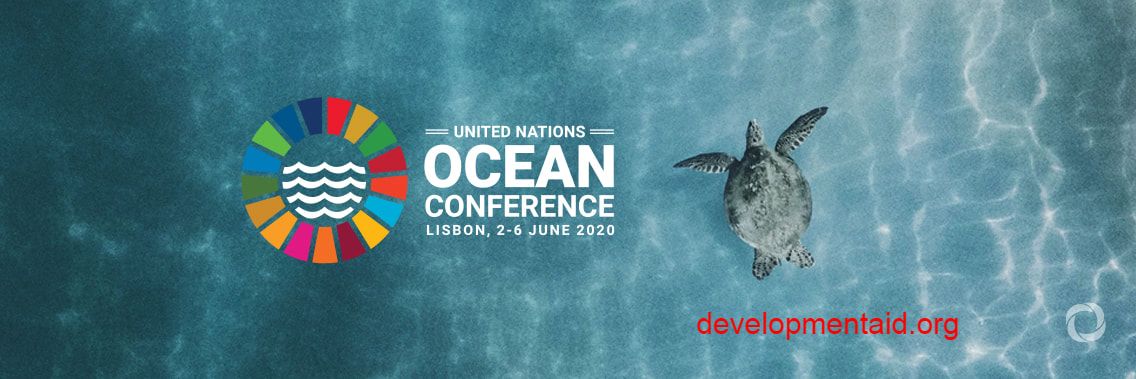
“When You’re Sick, You Go to the Doctor. And the Ocean is Sick”
By Margaret O'Dwyer, DC
“The well being of humanity is intimately linked with the health of the ocean,” said Ambassador Peter Tompson, UN Special Envoy for the Ocean, from Fiji. He was speaking Tuesday at a briefing in preparation for the 2020 Oceans Conference scheduled June 2-6 in Lisbon, Portugal. The theme will be, “Scaling up Ocean Action Based on Science and Innovation for the Implementation of Goal 14: Stocktaking, Partnerships and Solutions.” Portugal and Kenya will serve as Conference co-hosts. A Sustainable Blue Investment Forum will precede the Conference on June 1.
“This Conference will be like the first one (held in 2017)—a global game-changer,” said Tompson. Echoing other speakers, he said it is especially important to scale up science and innovation related to ocean issues.
The focus at Tuesday’s briefing seemed to be on science, innovation, and transformative action to address critical concerns. The idea is to heal oceans and achieve Sustainable Development Goal 14: Life Below Water. Goal 14 stresses the need to conserve and sustainably use the world’s oceans, seas and marine resources.
“When you’re sick, you go to the doctor,” Tompson said. “And the ocean is sick.”
Tompson mentioned five main ocean concerns. The first two could be tackled relatively soon, he indicated. They include finance as well as practices related to fishing. The other challenges include deoxygenation, ocean warming, and acidification.
“We find ourselves in a much longer fixing period when it comes to these three,” he said. Although they will continue for a long time to come, Tomspon said, “we have to start.”
Ocean warming has one cause, he noted--greenhouse gas heat-trapping emissions.
In terms of science, Tomspon said we know about 5-10 per cent about oceans. About 5 per cent has been explored and less than 10 per cent mapped.
“A great deal of science is missing,” said Tompson. “For the patient, we need that diagnosis to happen.”
Despite considerable challenges, Tompson called for focusing on positive tipping points, not just hand-wringing over the negative.
“It is solutions we will concentrate upon in Lisbon,” he said.
Tompson has observed helpful projects, such as wind farms, renewable energy efforts, and sustainable agriculture underway.
“The common problem that you’re faced with,” he said, “is show me the money. The financial world and project worlds are talking past each other. We want to fix that in Lisbon,” he said.
Science, planning, and finance were Tompson’s mantra related to realizing ocean-enhancing projects. “If you want the money, have a plan. If you have a plan, base it on good ocean science,” he said.
2020 is a critical year related to environmental issues, with the Oceans Conference, June 2-6, in Lisbon, Portugal; a Biodiversity Conference, October 15-28, in Kunming, China; and COP 26 Climate Conference, November 9-19, in Glasgow, Scotland. All three deal with a common enemy—heat-traping greenhouse emissions, Tompson said.
As the UN address oceans issues, it is important to note that the UN Decade of Ocean Science for Sustainable Development takes place from 2021 to 2030.
By Margaret O'Dwyer, DC
“The well being of humanity is intimately linked with the health of the ocean,” said Ambassador Peter Tompson, UN Special Envoy for the Ocean, from Fiji. He was speaking Tuesday at a briefing in preparation for the 2020 Oceans Conference scheduled June 2-6 in Lisbon, Portugal. The theme will be, “Scaling up Ocean Action Based on Science and Innovation for the Implementation of Goal 14: Stocktaking, Partnerships and Solutions.” Portugal and Kenya will serve as Conference co-hosts. A Sustainable Blue Investment Forum will precede the Conference on June 1.
“This Conference will be like the first one (held in 2017)—a global game-changer,” said Tompson. Echoing other speakers, he said it is especially important to scale up science and innovation related to ocean issues.
The focus at Tuesday’s briefing seemed to be on science, innovation, and transformative action to address critical concerns. The idea is to heal oceans and achieve Sustainable Development Goal 14: Life Below Water. Goal 14 stresses the need to conserve and sustainably use the world’s oceans, seas and marine resources.
“When you’re sick, you go to the doctor,” Tompson said. “And the ocean is sick.”
Tompson mentioned five main ocean concerns. The first two could be tackled relatively soon, he indicated. They include finance as well as practices related to fishing. The other challenges include deoxygenation, ocean warming, and acidification.
“We find ourselves in a much longer fixing period when it comes to these three,” he said. Although they will continue for a long time to come, Tomspon said, “we have to start.”
Ocean warming has one cause, he noted--greenhouse gas heat-trapping emissions.
In terms of science, Tomspon said we know about 5-10 per cent about oceans. About 5 per cent has been explored and less than 10 per cent mapped.
“A great deal of science is missing,” said Tompson. “For the patient, we need that diagnosis to happen.”
Despite considerable challenges, Tompson called for focusing on positive tipping points, not just hand-wringing over the negative.
“It is solutions we will concentrate upon in Lisbon,” he said.
Tompson has observed helpful projects, such as wind farms, renewable energy efforts, and sustainable agriculture underway.
“The common problem that you’re faced with,” he said, “is show me the money. The financial world and project worlds are talking past each other. We want to fix that in Lisbon,” he said.
Science, planning, and finance were Tompson’s mantra related to realizing ocean-enhancing projects. “If you want the money, have a plan. If you have a plan, base it on good ocean science,” he said.
2020 is a critical year related to environmental issues, with the Oceans Conference, June 2-6, in Lisbon, Portugal; a Biodiversity Conference, October 15-28, in Kunming, China; and COP 26 Climate Conference, November 9-19, in Glasgow, Scotland. All three deal with a common enemy—heat-traping greenhouse emissions, Tompson said.
As the UN address oceans issues, it is important to note that the UN Decade of Ocean Science for Sustainable Development takes place from 2021 to 2030.
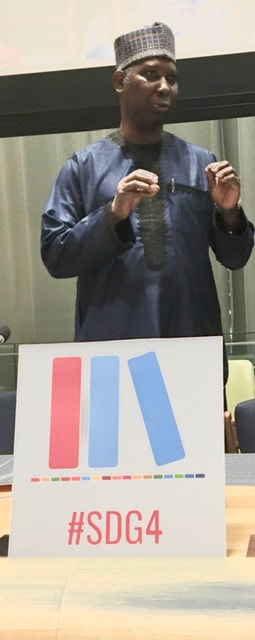
ON INTERNATIONAL DAY, UNITED NATIONS GENERAL ASSEMBLY PRESIDENT CALLS FOR IMPROVEMENTS IN EDUCATION
While more children are going to, and staying in school, the education sector is wrestling with huge challenges worldwide. United Nations General Assembly President, Tijjani Muhammad-Bande, spoke about progress and challenges in education during a high level event held to honor the International Day of Education held January 24 in New York.
"Among them are the precipitate decline in the quality and standards of education, the failure to factor the workplace’s skills requirements into learning processes and the declining esteem of the teaching profession," the GA President said. "There is also a widening knowledge gap between students in technically advanced societies and their counterparts in developing countries. Learning has been an issue in conflict zones and the growing incidence of bullying in schools deserves our attention."
He also pointed out that more than 10 million students were able to complete basic reading tasks. The students were not from developing countries, as one might expect. They were 15-year-old children in 79 high- and middle-income countries.
However, Mr. Muhammad-Bande noted that there are links between socio-economic advantage and learning outcomes. “The 10 per cent most socio-economically advantaged students outperformed their 10 per cent most disadvantaged counterparts in reading by 141 score points, on average across OECD countries,” the report said.
He also mentioned the importance of preparing today's students for tomorrow's work world.
"And here lies the challenge with the state of contemporary education: it needs to urgently bridge the yawning gap between the modern workplace’s needs for specialised skills, on the one hand, and actual learning opportunities, on the other," the GA President commented. "School curriculum have yet to anticipate and respond to workplace needs for a variety of hands-on, vocational and technical skills – especially in the field of information and communications technology – while continuing to advance traditional scholastic pursuits."
To address the learning crisis, he made multiple recommendations:
While more children are going to, and staying in school, the education sector is wrestling with huge challenges worldwide. United Nations General Assembly President, Tijjani Muhammad-Bande, spoke about progress and challenges in education during a high level event held to honor the International Day of Education held January 24 in New York.
"Among them are the precipitate decline in the quality and standards of education, the failure to factor the workplace’s skills requirements into learning processes and the declining esteem of the teaching profession," the GA President said. "There is also a widening knowledge gap between students in technically advanced societies and their counterparts in developing countries. Learning has been an issue in conflict zones and the growing incidence of bullying in schools deserves our attention."
He also pointed out that more than 10 million students were able to complete basic reading tasks. The students were not from developing countries, as one might expect. They were 15-year-old children in 79 high- and middle-income countries.
However, Mr. Muhammad-Bande noted that there are links between socio-economic advantage and learning outcomes. “The 10 per cent most socio-economically advantaged students outperformed their 10 per cent most disadvantaged counterparts in reading by 141 score points, on average across OECD countries,” the report said.
He also mentioned the importance of preparing today's students for tomorrow's work world.
"And here lies the challenge with the state of contemporary education: it needs to urgently bridge the yawning gap between the modern workplace’s needs for specialised skills, on the one hand, and actual learning opportunities, on the other," the GA President commented. "School curriculum have yet to anticipate and respond to workplace needs for a variety of hands-on, vocational and technical skills – especially in the field of information and communications technology – while continuing to advance traditional scholastic pursuits."
To address the learning crisis, he made multiple recommendations:
- Ensure instruction does not decline.
- Align school curricula and work needs for competencies and skills.
- Promote gender equality, social mobility, inter-cultural understanding.
- Safeguard that persons with disabilities are included in education.
- Respond to learning challenges caused by conflict and weather.
- Enhance the capacities of education systems working in tandem with Governments, education planners and administrators.
- Bridge the current gender, digital and financing gaps in education.
- UN SEEKS GLOBAL OPINIONS
The United Nations wants to know what you think. On January 2, it launched its biggest global conversation about the role of global cooperation in creating the future we want. The initiative is called UN 75 and beyond. People can take a short survey, dialogue in person or on line, use a tool kit to organize an event, and more, about their hopes and fears, issues of concern, and ideas for improving the world. Feedback will be presented to world leaders, who will meet on September 21, during the UN General Assembly, to mark the UN’s 75th anniversary, and to adopt a forward-looking political declaration which will be negotiated through an intergovernmental process on the topic, “The future we want, the United Nations we need: reaffirming our collective commitment to multilateralism”.
To acess a toolkit, go to this link: https://www.un.org/en/un75/join-conversation
To find out general information about the dialogues, click here: https://www.un.org/en/un75/faq
Wishing you a blessed Feast and a hopeful, peaceful, new year!
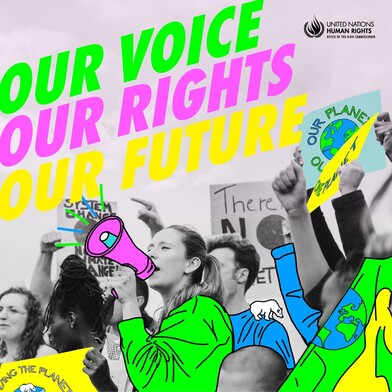
ON HUMAN RIGHTS DAY, WE CONSIDER TWO MAJOR BREACHES
RELATED TO YOUTH: HOMELESSNESS AND HUMAN TRAFFICKING
By Steffi Romero, intern
Today--December 10--is International Human Rights Day. The theme is, "Youth standing up for human rights." Although youth bring a great deal of energy to causes such as supporting human rights, and we need to encourage and celebrate that, we also must be mindful of the impact of human rights breaches on youth.
Recently, I learned of the interlinkages between human trafficking and homelessness among youth when attending a presentation at St. John's University. Homelessness makes youth more vulnerable to human trafficking, which burdens them with at least two, and usually many more, human rights violations.
The event, called "Stop the Trafficking: Home and Hope for Homeless Youth," was one of several talks which are part of the Vincentian Chair of Social Justice 2019-20 Lecture Series. It was hosted by Catholic Relief Services in partnership with Covenant House International. Covenant House provides housing and supportive services to youths without homes.
Article 4 of the Universal Declaration of Human Rights prohibits servitude, slavery, and the slave trade. Yet millions today are held in slavery. Article 25 states that "Everyone has the right to a standard of living adequate for the health and well-being of himself and of his family, including food, clothing, housing..." Yet, about 150 million pesons globally lack a home and about 1.6 billion experience inadequate housing.
In an attempt to describe the severity of the terrifying issue of trafficking, which plagues so many countries around the world, including the United States, Kevin Ryan, President and CEO of Covenant House, along with his co-workers and experts Jane and Fabiona, gave insight into real-life stories and experiences of victims and survivors of human trafficking. Their accounts stirred a sense of urgency and empathy in the hearts of those who were in attendance. The discussion was a direct indicator of a rapidly developing crisis which is attacking the most vulnerable groups in society, especially young women between the ages of 16 to 23 years old.
Covenant House has interacted with thousands of human trafficking survivors, and that number continues to grow, Mr. Ryan said. Jane explained that poverty, homelessness, drug and alcohol addiction, and immigration policy are some of the factors which may make an individual susceptible to becoming a victim of trafficking, including sex trafficking, because these are usually the influences that affect or make an individual vulnerable in society. Human traffickers target the people who cannot defend themselves, she pointed out. In many cases, victims are young, isolated and targeted members of the community who may not have the support of institutions, hence, they become easy targets.
The nexus between homelessness and trafficking is particularly unique because it stirs conversation on why homelessness can be a risk factor for society's youth. Mr. Ryan and his team described a number of possible factors which may lead to youth homelessness. Some contributors include teen pregnancy, domestic abuse in the home, substance abuse, adoption and foster care-related issues, and psychological health concerns, such as bipolar disorder. These factors may cause young people to lose family backing and subsequently have no place to call home. Mr. Ryan emphasized that human traffickers are aware, that in these situations, youth can experience a sense of hopelessness and desperation which makes youth without homes vulnerable targets.
The big question then becomes, "What should be done?" Mr.Ryan indicated that his organization is collaborating not only with other organizations who refer victims, but also with law enforcements agencies who are being specially trained to recognize human trafficking, especially in cases of homelessness. There is a special emphasis on shifting from a scientific approach, to discovering why people are trafficked, to building relationships with victims and survivors so that there can be more done to explore the causes and effects of trafficking.
The team has also introduced, and is calling for public support in lobbying for, a new Nordic model approach to punishment for human trafficking crimes. According to the Nordic model, perpetrators are penalized instead of the victims. Mr. Ryan highlighted that once the public is aware and involved in the process of lobbying, the topic of human trafficking will be one about which people are well educated, and the vulnerable can be protected.
In conclusion, homelessness is a contributing factor to human trafficking because of the vulnerability that accompanies it. We must examine how we can reduce homelessness in hopes of a chain reaction which eventually reduces the number of cases of human trafficking. With this said, the upcoming United Nations February forum related to homelessness, called the Commission for Social Development, becomes important because it is a platform to bring homelessness and trafficking links to light and to be direct with what we are asking of governments and organizations such as the United Nations. We must take responsibility for the crisis that plagues our society and find ways to bring solutions.
RELATED TO YOUTH: HOMELESSNESS AND HUMAN TRAFFICKING
By Steffi Romero, intern
Today--December 10--is International Human Rights Day. The theme is, "Youth standing up for human rights." Although youth bring a great deal of energy to causes such as supporting human rights, and we need to encourage and celebrate that, we also must be mindful of the impact of human rights breaches on youth.
Recently, I learned of the interlinkages between human trafficking and homelessness among youth when attending a presentation at St. John's University. Homelessness makes youth more vulnerable to human trafficking, which burdens them with at least two, and usually many more, human rights violations.
The event, called "Stop the Trafficking: Home and Hope for Homeless Youth," was one of several talks which are part of the Vincentian Chair of Social Justice 2019-20 Lecture Series. It was hosted by Catholic Relief Services in partnership with Covenant House International. Covenant House provides housing and supportive services to youths without homes.
Article 4 of the Universal Declaration of Human Rights prohibits servitude, slavery, and the slave trade. Yet millions today are held in slavery. Article 25 states that "Everyone has the right to a standard of living adequate for the health and well-being of himself and of his family, including food, clothing, housing..." Yet, about 150 million pesons globally lack a home and about 1.6 billion experience inadequate housing.
In an attempt to describe the severity of the terrifying issue of trafficking, which plagues so many countries around the world, including the United States, Kevin Ryan, President and CEO of Covenant House, along with his co-workers and experts Jane and Fabiona, gave insight into real-life stories and experiences of victims and survivors of human trafficking. Their accounts stirred a sense of urgency and empathy in the hearts of those who were in attendance. The discussion was a direct indicator of a rapidly developing crisis which is attacking the most vulnerable groups in society, especially young women between the ages of 16 to 23 years old.
Covenant House has interacted with thousands of human trafficking survivors, and that number continues to grow, Mr. Ryan said. Jane explained that poverty, homelessness, drug and alcohol addiction, and immigration policy are some of the factors which may make an individual susceptible to becoming a victim of trafficking, including sex trafficking, because these are usually the influences that affect or make an individual vulnerable in society. Human traffickers target the people who cannot defend themselves, she pointed out. In many cases, victims are young, isolated and targeted members of the community who may not have the support of institutions, hence, they become easy targets.
The nexus between homelessness and trafficking is particularly unique because it stirs conversation on why homelessness can be a risk factor for society's youth. Mr. Ryan and his team described a number of possible factors which may lead to youth homelessness. Some contributors include teen pregnancy, domestic abuse in the home, substance abuse, adoption and foster care-related issues, and psychological health concerns, such as bipolar disorder. These factors may cause young people to lose family backing and subsequently have no place to call home. Mr. Ryan emphasized that human traffickers are aware, that in these situations, youth can experience a sense of hopelessness and desperation which makes youth without homes vulnerable targets.
The big question then becomes, "What should be done?" Mr.Ryan indicated that his organization is collaborating not only with other organizations who refer victims, but also with law enforcements agencies who are being specially trained to recognize human trafficking, especially in cases of homelessness. There is a special emphasis on shifting from a scientific approach, to discovering why people are trafficked, to building relationships with victims and survivors so that there can be more done to explore the causes and effects of trafficking.
The team has also introduced, and is calling for public support in lobbying for, a new Nordic model approach to punishment for human trafficking crimes. According to the Nordic model, perpetrators are penalized instead of the victims. Mr. Ryan highlighted that once the public is aware and involved in the process of lobbying, the topic of human trafficking will be one about which people are well educated, and the vulnerable can be protected.
In conclusion, homelessness is a contributing factor to human trafficking because of the vulnerability that accompanies it. We must examine how we can reduce homelessness in hopes of a chain reaction which eventually reduces the number of cases of human trafficking. With this said, the upcoming United Nations February forum related to homelessness, called the Commission for Social Development, becomes important because it is a platform to bring homelessness and trafficking links to light and to be direct with what we are asking of governments and organizations such as the United Nations. We must take responsibility for the crisis that plagues our society and find ways to bring solutions.
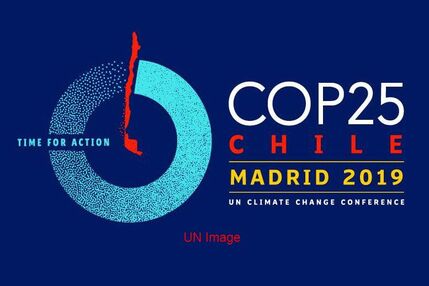
CLIMATE CHANGE CONFERENCE UNDERWAY IN MADRID
By Caitlin Neier, with information from CNN.com
The future of the world is in our hands. We are at the "point of no return," United Nations Secretary General Antonio Guterres said in his remarks to the 25th Conference of the Parties at the December 2nd kickoff of the UN Climate Change Conference. This year's conference is taking place in Madrid, Spain until the 13th of December.
Following the opening ceremony, various meetings occurred throughout the day that involved different countries and the issues in facing the climate change crisis our world is suffering from. Some of the meetings were: Conference of the Parties serving as the meeting of the Parties to the Paris Agreement (CMA), Dialogue between Governments and Civil Society Enhancing Action together, Coalition for Rainforest Nations, and Small Island Developing States, to name a few.
Some of the activities which have taken place this week focused on the status of carbon emissions, the arrival of youth climate activist Greta Thunberg, discussions among mayors about climate change action, a Creative Industries Pact on Climate Change, discussion about health impacts of climate change, a vote for the countries most behind in terms of green policies, discussions about innovative technologies, protests, and more. Some countries have conveyed actions they are taking to fulfill their commitments under the Paris Agreement.
Efforts have been made to track carbon emissions. As stated on CNN, the Paris Climate Accord was, “an agreement made in 2015 by more than 200 nations to keep global warming to well below 2 degrees Celsius above pre-industrial levels and, if possible, to less than 1.5 degrees above. The world is now 1.1 degrees warmer than it was at the beginning of the Industrial Revolution -- a change that has already had a profound effect on the planet and people's lives.”
The globe will face a 3.4 degree rise in temperature if national commitments related to the Paris Agreement are not met. If we do not reduce the amount of carbon emissions we are only endangering the future of our planet.
As a young person, the issue of climate change does not only check off the box of importance, but it also checks off the box of urgency. I feel as though my generation has been raised to focus on the future; that we do well in school and go to college so we can get a good job and have a “good life”. But the reality is, none of that will matter if we do not have a planet on which to live. This is a critical time and we must recognize that it is all of our responsibilities as a collective whole to take care of the Earth and the place we call home.
https://www.cnn.com/2019/12/02/world/cop25-explained-intl/index.html
By Caitlin Neier, with information from CNN.com
The future of the world is in our hands. We are at the "point of no return," United Nations Secretary General Antonio Guterres said in his remarks to the 25th Conference of the Parties at the December 2nd kickoff of the UN Climate Change Conference. This year's conference is taking place in Madrid, Spain until the 13th of December.
Following the opening ceremony, various meetings occurred throughout the day that involved different countries and the issues in facing the climate change crisis our world is suffering from. Some of the meetings were: Conference of the Parties serving as the meeting of the Parties to the Paris Agreement (CMA), Dialogue between Governments and Civil Society Enhancing Action together, Coalition for Rainforest Nations, and Small Island Developing States, to name a few.
Some of the activities which have taken place this week focused on the status of carbon emissions, the arrival of youth climate activist Greta Thunberg, discussions among mayors about climate change action, a Creative Industries Pact on Climate Change, discussion about health impacts of climate change, a vote for the countries most behind in terms of green policies, discussions about innovative technologies, protests, and more. Some countries have conveyed actions they are taking to fulfill their commitments under the Paris Agreement.
Efforts have been made to track carbon emissions. As stated on CNN, the Paris Climate Accord was, “an agreement made in 2015 by more than 200 nations to keep global warming to well below 2 degrees Celsius above pre-industrial levels and, if possible, to less than 1.5 degrees above. The world is now 1.1 degrees warmer than it was at the beginning of the Industrial Revolution -- a change that has already had a profound effect on the planet and people's lives.”
The globe will face a 3.4 degree rise in temperature if national commitments related to the Paris Agreement are not met. If we do not reduce the amount of carbon emissions we are only endangering the future of our planet.
As a young person, the issue of climate change does not only check off the box of importance, but it also checks off the box of urgency. I feel as though my generation has been raised to focus on the future; that we do well in school and go to college so we can get a good job and have a “good life”. But the reality is, none of that will matter if we do not have a planet on which to live. This is a critical time and we must recognize that it is all of our responsibilities as a collective whole to take care of the Earth and the place we call home.
https://www.cnn.com/2019/12/02/world/cop25-explained-intl/index.html
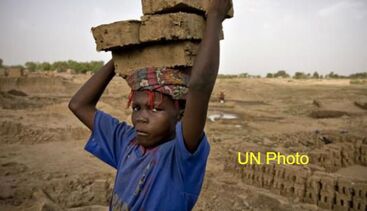
DECEMBER 2: INTERNATIONAL DAY FOR THE ABOLITION OF SLAVERY
We would like to think that slavery is an atrocity from days past. But the reality is that over 40 million people globally are victims of modern day forms of this crime. Modern day slavery refers to situations of exploitation that a person cannot refuse or leave because of threats, violence, coercion, deception, and/or abuse of power.
It is quite easy to believe that slavery happens outside of our own environment and we're not complicit in it. But think about the products we purchase, from clothing, to chocolate, to fish, to meat, to cell phones, and more. Think of the persons who clean houses or provide manicures. Modern day slavery has been connected with each of these products or services, and many more. With goods moving speedily through internet purchases, it can also be challenging for companies to ensure their supply chains are slave-free.
For every 1,000 persons, there are 5.4 victims of slavery, of which one in four are children, according to the International Labor Organization (ILO). Of the 40.3 million persons who are victims of modern day slavery, 24.9 are in forced labor and 15.4 million are in forced marriages. About 150 million children are victims of unfair child labor practices.
The ILO indicates that out of the 24.9 million people trapped in forced labor, 16 million people are exploited in the private sector such as domestic work, construction or agriculture; 4.8 million people in forced sexual exploitation, and 4 million people in forced labor imposed by state authorities.
In this season of Advent, think about ways we can be a light for victims of modern day slavery. It may be by educating others about the issue or using social media to encourage people to end modern day slavery. You can find data about the topic at this ILO site: https://www.ilo.org/global/topics/forced-labour/lang--en/index.htm The Global Slavery Index is another site which provides insight into governmental progress in addressing modern day slavery. https://www.globalslaveryindex.org/ You might write to a company to ask them to ensure that their supply chain is slave free. You might purchase fair trade goods. You might strive to ensure that education is available to all or by taking steps to help end poverty, so that potential victims can avert slavery. Let's all work together to end the misery others experience because of modern day slavery.
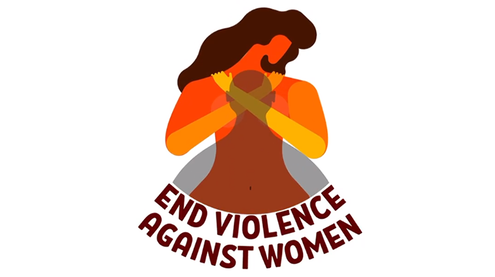
END VIOLENCE AGAINST WOMEN
Gender-based violence is unacceptable. It impacts not only women and girls, but also affects families and communities. Each November 25, the United Nations honors International Day for the Elimination of Violence Against Women.
At the same time, an effort called "Orange the World" takes place. It is a time of activism between November 25 and December 10, which is Human Rights Day. This year, the theme of Orange the World is "Generation Equality Stands Against Rape." One in three women are impacted by violence; 15 million adolescent girls worldwide have experienced forced sex.
What can we do? We can challenge cultures of rape and violence against women by saying something when someone tells an inappropriate joke, being mindful of the media we consume, advocating against laws which provide leniency for perpetrators, and promoting actions or programs which teach males to respect women and girls.
In March, the UN's Commission on the Status of Women will focus upon an evaluation of progress made, and challenges remaining, with regard to gender equality since the Beijing Declaration and Platform for Action, which occurred almost 25 years ago.
Gender-based violence is unacceptable. It impacts not only women and girls, but also affects families and communities. Each November 25, the United Nations honors International Day for the Elimination of Violence Against Women.
At the same time, an effort called "Orange the World" takes place. It is a time of activism between November 25 and December 10, which is Human Rights Day. This year, the theme of Orange the World is "Generation Equality Stands Against Rape." One in three women are impacted by violence; 15 million adolescent girls worldwide have experienced forced sex.
What can we do? We can challenge cultures of rape and violence against women by saying something when someone tells an inappropriate joke, being mindful of the media we consume, advocating against laws which provide leniency for perpetrators, and promoting actions or programs which teach males to respect women and girls.
In March, the UN's Commission on the Status of Women will focus upon an evaluation of progress made, and challenges remaining, with regard to gender equality since the Beijing Declaration and Platform for Action, which occurred almost 25 years ago.
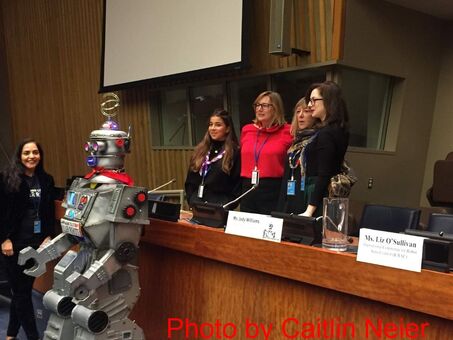
URGENT CALL TO BAN KILLER ROBOTS
By Margaret O’Dwyer, DC
With input from Caitlin Neier, Intern for the
Daughters of Charity at the UN
On Monday, November 11, in the United States, we honored veterans. Commonwealth nations observed Remembrance Day, held in memory of those who have served in armed forces and died in the line of duty. It is more than fitting that we remember those who have provided military service or made the ultimate sacrifice so that the rest of us can enjoy freedom.
But we can’t reflect on the impact of war and conflict without considering what future warfare might be like.
At the United Nations, civil society recently focused on one specific means of warfare—lethal autonomous weapons (LAWS), also known as fully autonomous weapons or, more commonly, “killer robots.” Such weapons could potentially kill people without a direct instruction from a human being.
There are many questions about whether autonomous weapons can comply with International Humanitarian Law. One of the four basic principles of the Law of Armed Conflict states that the parties to the conflict shall at all times distinguish between the civilian population and combatants and between civilian objects and military objectives and accordingly shall direct their operations only against military objectives. Under the principle of proportionality, the means and methods of warfare used must not be disproportionate to the military advantage sought. It is unlikely that lethal autonomous weapons can comply with these rules. Questions also arise about who takes responsibility for errors.
On October 21 at the United Nations, a group called for pressure to stimulate negotiations on a new international treaty to prohibit killer robots.
Mary Wareham, of Human Rights Watch, Arms Division, coordinates the Campaign to Stop Killer Robots, which is comprised of 130 nongovernmental organizations in 60 countries. The group is encouraging governments to launch negotiations on a new international treaty to prohibit weapons systems that would select and engage targets without meaningful human control.
“We believe they cross the threshold of acceptability and therefore must be prohibited,” Wareham said.
Liz O’Sullivan, from the International Committee of Robot Arms Control, notes a number of concerns with killer robots. First, the machines can’t infer traits, she said, but rather only respond to a program. In example, if someone had their hands up in the air, a human would interpret it as an act of surrender. But a lethal autonomous weapon could interpret the action as a false surrender and either strike the person or pass them by.
Potential hacking and the harm it could cause are also issues. Further, unprincipled military regimes could potentially use such systems on their own people. The weapons also rely heavily on algorithms, which can be prone to bias or failure, O’Sullivan said.
It was comforting to hear O’Sullivan say that in tech communities, some workers are trying to prevent their efforts from being put towards nefarious ends.
Also present at the meeting was Nobel Peace Laureate and co-founder of the Campaign to Stop Killer Robots, Jody Williams.
“Allowing a machine in theory through algorithms to decide what they will target and what they will attack is one of the huge reasons why we consider it crossing the Rubicon and grossly unethical and immoral,” she said. A machine should be in the service of human beings rather than the other way around, Williams indicated.
“The more people know about this weaponry, the more they do not want to see it unleashed upon this planet,” said Williams.
An October episode of Madam Secretary focused on the many concerns about killer robots. In the episode, (fictional) US President Elizabeth McCord chooses Navy Seal action rather than engaging lethally autonomous weapons.
In March, UN leader Antonio Guterres commented that “machines with the power and discretion to take lives without human involvement are politically unacceptable, morally repugnant and should be prohibited by international law”.
In September, a high level group at the UN (the Alliance for Multilateralism) recognized during the UN General Assembly the potential dangers presented by lethal autonomous weapons. In an effort led by France and Germany, multiple foreign ministers endorsed a declaration expressing the goal of promoting rules based international order and committed to addressing killer robots. But not all countries are on board. During an August meeting of the Convention on Certain Conventional Weapons (CCW), some major military powers opposed negotiation of a new treaty on killer robots because they felt it was premature.
From November 13-15, the CCW meeting of high contracting parties, in Geneva, will decide on future work to address killer robots in 2020. Hopefully, it will result in plans to move forward a treaty to protect the globe from killer robots.
By Margaret O’Dwyer, DC
With input from Caitlin Neier, Intern for the
Daughters of Charity at the UN
On Monday, November 11, in the United States, we honored veterans. Commonwealth nations observed Remembrance Day, held in memory of those who have served in armed forces and died in the line of duty. It is more than fitting that we remember those who have provided military service or made the ultimate sacrifice so that the rest of us can enjoy freedom.
But we can’t reflect on the impact of war and conflict without considering what future warfare might be like.
At the United Nations, civil society recently focused on one specific means of warfare—lethal autonomous weapons (LAWS), also known as fully autonomous weapons or, more commonly, “killer robots.” Such weapons could potentially kill people without a direct instruction from a human being.
There are many questions about whether autonomous weapons can comply with International Humanitarian Law. One of the four basic principles of the Law of Armed Conflict states that the parties to the conflict shall at all times distinguish between the civilian population and combatants and between civilian objects and military objectives and accordingly shall direct their operations only against military objectives. Under the principle of proportionality, the means and methods of warfare used must not be disproportionate to the military advantage sought. It is unlikely that lethal autonomous weapons can comply with these rules. Questions also arise about who takes responsibility for errors.
On October 21 at the United Nations, a group called for pressure to stimulate negotiations on a new international treaty to prohibit killer robots.
Mary Wareham, of Human Rights Watch, Arms Division, coordinates the Campaign to Stop Killer Robots, which is comprised of 130 nongovernmental organizations in 60 countries. The group is encouraging governments to launch negotiations on a new international treaty to prohibit weapons systems that would select and engage targets without meaningful human control.
“We believe they cross the threshold of acceptability and therefore must be prohibited,” Wareham said.
Liz O’Sullivan, from the International Committee of Robot Arms Control, notes a number of concerns with killer robots. First, the machines can’t infer traits, she said, but rather only respond to a program. In example, if someone had their hands up in the air, a human would interpret it as an act of surrender. But a lethal autonomous weapon could interpret the action as a false surrender and either strike the person or pass them by.
Potential hacking and the harm it could cause are also issues. Further, unprincipled military regimes could potentially use such systems on their own people. The weapons also rely heavily on algorithms, which can be prone to bias or failure, O’Sullivan said.
It was comforting to hear O’Sullivan say that in tech communities, some workers are trying to prevent their efforts from being put towards nefarious ends.
Also present at the meeting was Nobel Peace Laureate and co-founder of the Campaign to Stop Killer Robots, Jody Williams.
“Allowing a machine in theory through algorithms to decide what they will target and what they will attack is one of the huge reasons why we consider it crossing the Rubicon and grossly unethical and immoral,” she said. A machine should be in the service of human beings rather than the other way around, Williams indicated.
“The more people know about this weaponry, the more they do not want to see it unleashed upon this planet,” said Williams.
An October episode of Madam Secretary focused on the many concerns about killer robots. In the episode, (fictional) US President Elizabeth McCord chooses Navy Seal action rather than engaging lethally autonomous weapons.
In March, UN leader Antonio Guterres commented that “machines with the power and discretion to take lives without human involvement are politically unacceptable, morally repugnant and should be prohibited by international law”.
In September, a high level group at the UN (the Alliance for Multilateralism) recognized during the UN General Assembly the potential dangers presented by lethal autonomous weapons. In an effort led by France and Germany, multiple foreign ministers endorsed a declaration expressing the goal of promoting rules based international order and committed to addressing killer robots. But not all countries are on board. During an August meeting of the Convention on Certain Conventional Weapons (CCW), some major military powers opposed negotiation of a new treaty on killer robots because they felt it was premature.
From November 13-15, the CCW meeting of high contracting parties, in Geneva, will decide on future work to address killer robots in 2020. Hopefully, it will result in plans to move forward a treaty to protect the globe from killer robots.
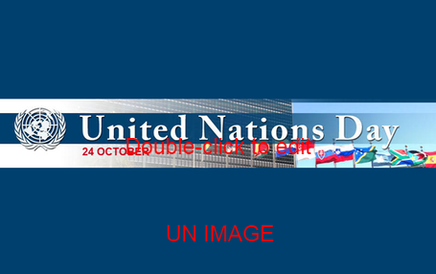
GLOBAL DIALOGUE TO GUIDE UN INTO FUTURE
The United Nations Charter took effect in 1945. To honor that event, October 24 is celebrated annually as United Nations Day.
"United Nations Day highlights the enduring ideals of the Charter, which entered into force on this date 74 years ago," said UN Secretary General Antonio Guterres.
This year's event will be celebrated with a concert in New York, featuring the Qatar Philharmonic Orchestra. At UNESCO in Paris, meetings will take place with 7 UN agencies and the French UN Association, and a Conference on Sustainable Cities is schedule.
But the most exciting aspect of UN Day is that UN Secretary General Guterres has announced plans leading up to the UN's 75th Anniversary next year. A new initiative, called, "UN 75:2020 and Beyond-Shaping our Future Together," is being launched. It involves a world-wide dialogue about global cooperation in building the future. Conversations begin in January, 2020. The idea is to reach people internationally, to hear both their hopes and fears, and to learn from their experiences.
In his message for the day, the Secretary General notes that, amid stormy global seas, the UN's Charter remains our shared moral anchor. "At this time of turbo-charged change, the United Nations remains focused on the real problems of real people," he said. "We are working for a fair globalization and bold climate action.We are pushing for human rights and gender equality -- and saying “no” to hatred of any kind. And we are striving to maintain peace – while bringing life-saving aid to millions caught up in armed conflict. The United Nations itself is becoming ever more agile and accountable as we enhance support to countries".
The United Nations Charter took effect in 1945. To honor that event, October 24 is celebrated annually as United Nations Day.
"United Nations Day highlights the enduring ideals of the Charter, which entered into force on this date 74 years ago," said UN Secretary General Antonio Guterres.
This year's event will be celebrated with a concert in New York, featuring the Qatar Philharmonic Orchestra. At UNESCO in Paris, meetings will take place with 7 UN agencies and the French UN Association, and a Conference on Sustainable Cities is schedule.
But the most exciting aspect of UN Day is that UN Secretary General Guterres has announced plans leading up to the UN's 75th Anniversary next year. A new initiative, called, "UN 75:2020 and Beyond-Shaping our Future Together," is being launched. It involves a world-wide dialogue about global cooperation in building the future. Conversations begin in January, 2020. The idea is to reach people internationally, to hear both their hopes and fears, and to learn from their experiences.
In his message for the day, the Secretary General notes that, amid stormy global seas, the UN's Charter remains our shared moral anchor. "At this time of turbo-charged change, the United Nations remains focused on the real problems of real people," he said. "We are working for a fair globalization and bold climate action.We are pushing for human rights and gender equality -- and saying “no” to hatred of any kind. And we are striving to maintain peace – while bringing life-saving aid to millions caught up in armed conflict. The United Nations itself is becoming ever more agile and accountable as we enhance support to countries".
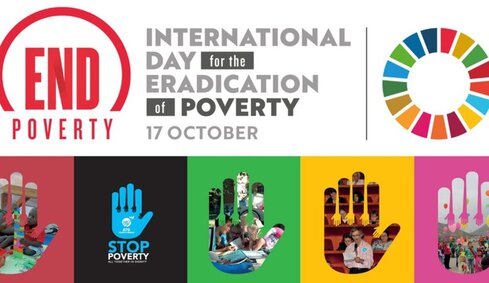
INTERNATIONAL DAY TO END POVERTY:
1.3 BILLION MULTIDIMENSIONALLY POOR PERSONS ARE CHILDREN
On November 20, the UN celebrates the 30th anniversary of the adoption of the Convention on the Rights of the Child. It is fitting, therefore, that this week's International Day for the Eradication of Poverty (October 17) will focus on children. The theme is, "Acting Together to Empower Children, their Families and Communities to End Poverty."
"One of the keys to ending child poverty is addressing poverty in the household, from which it often stems. Access to quality social services must be a priority," said UN Secretary General Antonio Guterres.
The UN in New York will mark the day, October 17, with a celebration of the Convention's 30 anniversary. It consistently engages youth in panels and other activities, so that young voices are heard.
The UN's Human Development Reports reflects that half of the planet's 1.3 billion multidimensionally poor persons are children under age 18. A third are children under age 10. This year's Gobal Multidimensional Poverty Index (MPI) focuses on child poverty in South Asia, where 10.7 percent of South Asian girls are out of school and live in a multidimensionally poor household. However, in Afghanistan, 44.0 percent do. The MPI shows that in South Asia, 22.7 percent of children under age 5 experience intrahousehold inequality in deprivation in nutrition (where at least one child in the household is malnourished and at least one child in the household is not). In Pakistan over a third of children under age 5 experience such intrahousehold inequality.
Let's keep in mind today, all children who struggle to access food, safe shelter, water, education, and health. What might be done so that they can achieve their potential?
Acccording to the Convention on the Rights of the Child, every child has a right to a standard of living adequate for the their physical, mental, spiritual, moral and social development. Poverty impairs children’s development and, in turn, leads to lower income and health in adulthood, the UN notes. When child poverty is recognized as a denial of children’s human rights, then duty bearers (people who run government) are legally bound to promote, protect and fulfil children’s rights. Above all, it is imperative to recognize and address the specific discriminations experienced by girls. .
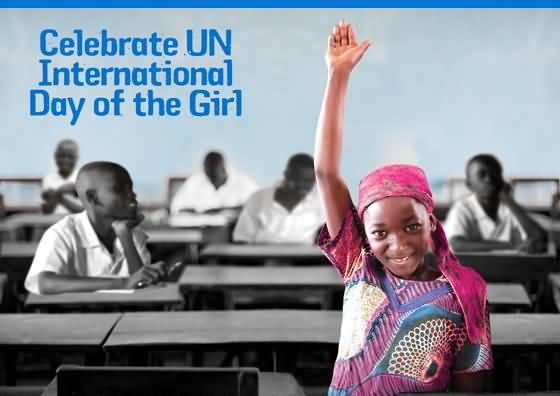
INTERNATIONAL DAY OF THE GIRL--OCTOBER 11
Girls face many challenges. In some parts of the world, education might be difficult to access. In others, girls may be forced to marry while still children. Some suffer female genital mutilation. Still others are victims of violence and human trafficking.
According to UNICEF, Every year, 12 million girls are married before their 18th birthday. Globally, 1 in 5 girls becomes a mother before that age. Nearly 7,000 adolescent girls aged 15 to 24 are infected with HIV every week. 98 million girls who should be in secondary school are not.
At the same time, girls are becoming proactive in addressing issues which affect them. An example is climate activist Greta Thunberg. Malala Yousafzai advocates for girls' right to education. Girls Speak Out is a group which typically provides performances during the International Day of the Girl Child, addressing issues experienced by girls.
The International Day of the Girl Child takes place on Friday, October 11. UN headquarters in New York will be filled with girls celebrating the day and it's theme, “GirlForce: Unscripted and unstoppable." Girls will run most of the events at the UN, recognizing achievements by, with and for girls since the adoption of the Beijing Declaration and Platform for Action nearly 25 years ago. The Declaration and Platform, adopted at the Fourth World Conference on Women, focsues upon the achievements and advances the recognition of women and girls' human rights.
"To ensure that all girls can reach their potential, we need concerted efforts and investments in their health, safety and 21st-century skills," said UN Secretary Antonio Guterres. "Every year of secondary schooling a girl receives boosts her earning power by as much as 25 per cent. If all girls and boys complete secondary education, 420 million people could be lifted out of poverty. The benefits unfold across generations".
"We need to uphold the equal rights, voices and influence of girls in our families, communities and nations," Guterres said. "Girls can be powerful agents of change, and nothing should keep them from participating fully in all areas of life."
The Vincentian Family and Daughters of Charity are engaged in many programs which empower girls. Let's take time on October 11, and every day, to say some encouraging words to girls and encourage them to achieve their potential.
Girls face many challenges. In some parts of the world, education might be difficult to access. In others, girls may be forced to marry while still children. Some suffer female genital mutilation. Still others are victims of violence and human trafficking.
According to UNICEF, Every year, 12 million girls are married before their 18th birthday. Globally, 1 in 5 girls becomes a mother before that age. Nearly 7,000 adolescent girls aged 15 to 24 are infected with HIV every week. 98 million girls who should be in secondary school are not.
At the same time, girls are becoming proactive in addressing issues which affect them. An example is climate activist Greta Thunberg. Malala Yousafzai advocates for girls' right to education. Girls Speak Out is a group which typically provides performances during the International Day of the Girl Child, addressing issues experienced by girls.
The International Day of the Girl Child takes place on Friday, October 11. UN headquarters in New York will be filled with girls celebrating the day and it's theme, “GirlForce: Unscripted and unstoppable." Girls will run most of the events at the UN, recognizing achievements by, with and for girls since the adoption of the Beijing Declaration and Platform for Action nearly 25 years ago. The Declaration and Platform, adopted at the Fourth World Conference on Women, focsues upon the achievements and advances the recognition of women and girls' human rights.
"To ensure that all girls can reach their potential, we need concerted efforts and investments in their health, safety and 21st-century skills," said UN Secretary Antonio Guterres. "Every year of secondary schooling a girl receives boosts her earning power by as much as 25 per cent. If all girls and boys complete secondary education, 420 million people could be lifted out of poverty. The benefits unfold across generations".
"We need to uphold the equal rights, voices and influence of girls in our families, communities and nations," Guterres said. "Girls can be powerful agents of change, and nothing should keep them from participating fully in all areas of life."
The Vincentian Family and Daughters of Charity are engaged in many programs which empower girls. Let's take time on October 11, and every day, to say some encouraging words to girls and encourage them to achieve their potential.
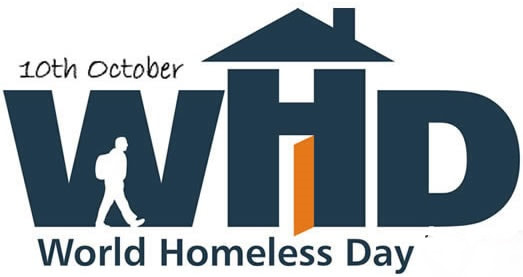
WORLD HOMELESS DAY
Thursday, October 10 is World Homelessness Day, a day in which globally, people raise awareness of, and respond to, the needs of persons experiencing homelesness. With it's 13 Houses Campaign, the Vincentian Family is promoting efforts to end street homelessness. The Daughters of Charity are serving in feeding programs, day centers, shelters, accomodations for migrants, working with street children, providing health care, foster care, and much more.
At the United Nations, the Daughters of Charity are active members of the Working Group to End Homelessness. The Working Group advocated for homelessness as a theme for the Commission on Social Development (CSOCD) which takes place in February, 2020. The chosen theme is, "Affordable housing and social protection systems for all to address homelessness." It is keen that the United Nations develop a universally accepted definition of homelessness and that each member state count persons experiencing homelessness, then develop solutions. The Working Group is networking with the Vincentian Family Homeless Alliance.
What can you do on this World Homelessness Day? Raise awareness. Ask a local feeding program or shelter what they need, and then organize with others to collect and donate the items. Volunteer. Conduct a fund-raiser. Advocate for more affordable housing.
You can also participate in the World's Big Sleepout scheduled for December 7, 2019 in multiple cities around the world. For more information, go to bigsleepout.com
Thursday, October 10 is World Homelessness Day, a day in which globally, people raise awareness of, and respond to, the needs of persons experiencing homelesness. With it's 13 Houses Campaign, the Vincentian Family is promoting efforts to end street homelessness. The Daughters of Charity are serving in feeding programs, day centers, shelters, accomodations for migrants, working with street children, providing health care, foster care, and much more.
At the United Nations, the Daughters of Charity are active members of the Working Group to End Homelessness. The Working Group advocated for homelessness as a theme for the Commission on Social Development (CSOCD) which takes place in February, 2020. The chosen theme is, "Affordable housing and social protection systems for all to address homelessness." It is keen that the United Nations develop a universally accepted definition of homelessness and that each member state count persons experiencing homelessness, then develop solutions. The Working Group is networking with the Vincentian Family Homeless Alliance.
What can you do on this World Homelessness Day? Raise awareness. Ask a local feeding program or shelter what they need, and then organize with others to collect and donate the items. Volunteer. Conduct a fund-raiser. Advocate for more affordable housing.
You can also participate in the World's Big Sleepout scheduled for December 7, 2019 in multiple cities around the world. For more information, go to bigsleepout.com
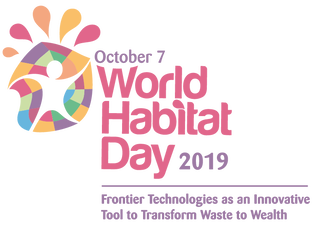
OCTOBER 7--World Habitat Day
By: Margaret O'Dwyer, DC
With information from UN Habitat
The UN has selected the first Monday of each October as World Habitat Day. This year's theme is: Frontier Technologies as an innovative tool to transform waste to wealth. It follows up on last year's theme which related to municipal solid waste management.
The purpose of World Habitat Day is to reflect on the state of our towns and cities, and on the basic right of all to adequate shelter. Innovative frontier technologies related to sustainable waste management can help achieve Sustainable Development Goal 11: inclusive, safe, resilient and sustainable cities. Some of those technologies, such as automation, robotics, electric vehicles, renewable energy technologies, biotechnologies, and artificial intelligence can transform the social, economic and environmental spheres., according to the UN. They can offer better, cheaper, faster, scalable and easy to use solutions for every-day problems, including waste management.
"Solutions begin with small steps individuals can take to alter the way our cities function.," said UN Secretary General Antonio Guterres. "We must reduce the amount of waste we produce, and, at the same time, start seeing it as a valuable resource that can be re-used and recycled, including for energy."
The global celebration of World Habitat Day takes place in Mexico City, but other cities also will honor the day with special events.
World Habitat Day is occurring during Urban October, a month of activities and discussions about urban sustainability. This subject is vital as an increasing number of people move to urban areas.
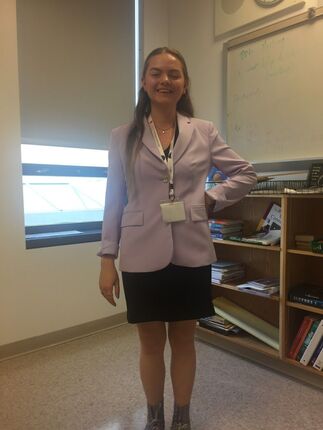
WORLD TEACHERS' DAY SEPTEMBER 5
By: Caitlin Neier
(With information from UNESCO)
October 5th, 2019, marks the 25th anniversary of World Teachers’ Day. The theme this year is: "Young Teachers: The Future of the Profession." With the United Nations’ Sustainable Development Goal (SDG) 4 focusing on “Quality Education," World Teachers’ Day has become a day to, “mark progress and reflect on ways to counter the remaining challenges for the promotion of the teaching profession.”
World Teachers’ Day is celebrated in honor of the anniversary of adopting the 1966 International Labour Organization (ILO) and The United Nations Educational, Scientific and Cultural Organization (UNESCO) Recommendation on the Status of Teachers. According to the UNESCO website, “This Recommendation sets benchmarks regarding the rights and responsibilities of teachers and standards for their initial preparation and further education, recruitment, employment, and teaching and learning conditions.”
My name is Caitlin and I am an intern at the United Nations with the Daughters of Charity and the Vincentian Family. I am currently a senior at St. John’s University and am studying Adolescent Education with a concentration in English. My aspiration is to be a high school English teacher.
At the beginning of September, I started a year-long student teaching program in which I am in a school two days a week, this semester, and five days a week during the spring semester. It is my privilege to be placed at a middle school/high school close to St. John’s. This is my first opportunity to put into action what I have learned in these last few years of college.
Currently, my world involves student teaching sixth and seventh graders; an age at which young people are keen and bright. I love being in the classroom, because I have already witnessed the learning and enthusiasm that takes place between each student. In many ways, I am their pupil!
It is so amazing to see how much energy students exhibit in their own learning pathways! The world we live in is one that we have never seen before, and are evolving into, especially because of the creativity and innovation of their generation. They are growing up as young, empowered individuals who are very aware of their world and surroundings. They are advocates for change; advocates for a better world. My students make me so excited to run my own classroom one day.
By: Caitlin Neier
(With information from UNESCO)
October 5th, 2019, marks the 25th anniversary of World Teachers’ Day. The theme this year is: "Young Teachers: The Future of the Profession." With the United Nations’ Sustainable Development Goal (SDG) 4 focusing on “Quality Education," World Teachers’ Day has become a day to, “mark progress and reflect on ways to counter the remaining challenges for the promotion of the teaching profession.”
World Teachers’ Day is celebrated in honor of the anniversary of adopting the 1966 International Labour Organization (ILO) and The United Nations Educational, Scientific and Cultural Organization (UNESCO) Recommendation on the Status of Teachers. According to the UNESCO website, “This Recommendation sets benchmarks regarding the rights and responsibilities of teachers and standards for their initial preparation and further education, recruitment, employment, and teaching and learning conditions.”
My name is Caitlin and I am an intern at the United Nations with the Daughters of Charity and the Vincentian Family. I am currently a senior at St. John’s University and am studying Adolescent Education with a concentration in English. My aspiration is to be a high school English teacher.
At the beginning of September, I started a year-long student teaching program in which I am in a school two days a week, this semester, and five days a week during the spring semester. It is my privilege to be placed at a middle school/high school close to St. John’s. This is my first opportunity to put into action what I have learned in these last few years of college.
Currently, my world involves student teaching sixth and seventh graders; an age at which young people are keen and bright. I love being in the classroom, because I have already witnessed the learning and enthusiasm that takes place between each student. In many ways, I am their pupil!
It is so amazing to see how much energy students exhibit in their own learning pathways! The world we live in is one that we have never seen before, and are evolving into, especially because of the creativity and innovation of their generation. They are growing up as young, empowered individuals who are very aware of their world and surroundings. They are advocates for change; advocates for a better world. My students make me so excited to run my own classroom one day.
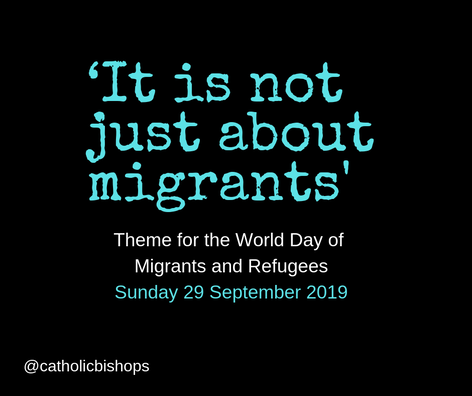
" IT IS NOT JUST ABOUT MIGRANTS"
BY: Sr. Margaret O'Dwyer, DC
Migrants, refugees, displaced persons and victims of trafficking have become emblems of exclusion in a world experiencing a trend towards a "globalization of indifference," says Pope Francis. In his message for World Day of Migrants and Refugees, the Pope points out that the poorest of the poor and the most disadvantaged pay the price of conflicts, injustices and discrimination, and economic and social imabalances.
His message challenges us not only to respond to the needs of migrants, but also to prevent exclusion and to reflect on our own fears and behaviors which can condition thinking to become closed, intolerant, and even, without realizing it, racist.
"In addition to the hardships that their condition entails," Pope Francis says of migrants refugees, and trafficked persons, "they are often looked down upon and considered the source of all society’s ills. That attitude is an alarm bell warning of the moral decline we will face if we continue to give ground to the throw-away culture."
World Day of Migrants and Refugees takes place Sunday, September 29. The theme this year is, "It is not just about migrants," meaning it is about ALL of us.
It is not just about migrants, it is also about our fears, charity, humanity, it is a question of seeing that no one is excluded, it is about putting the last in first place, it is about the whole person, and about bulding the City of God, the Pope tells us. He calls us to four actions: to welcome, protect, promote and integrate migrants, refugees, and trafficked persons.
Resources for the day can be found at these links:
Pope's Message: https://www.vaticannews.va/en/pope/news/2019-05/pope-francis-message-world-day-migrants-refugees-full-text.html
Other resources: https://migrants-refugees.va/resource-center/world-day-of-migrants-refugees-2019/
https://justiceforimmigrants.org/world-day-for-migrants-and-refugees/
BY: Sr. Margaret O'Dwyer, DC
Migrants, refugees, displaced persons and victims of trafficking have become emblems of exclusion in a world experiencing a trend towards a "globalization of indifference," says Pope Francis. In his message for World Day of Migrants and Refugees, the Pope points out that the poorest of the poor and the most disadvantaged pay the price of conflicts, injustices and discrimination, and economic and social imabalances.
His message challenges us not only to respond to the needs of migrants, but also to prevent exclusion and to reflect on our own fears and behaviors which can condition thinking to become closed, intolerant, and even, without realizing it, racist.
"In addition to the hardships that their condition entails," Pope Francis says of migrants refugees, and trafficked persons, "they are often looked down upon and considered the source of all society’s ills. That attitude is an alarm bell warning of the moral decline we will face if we continue to give ground to the throw-away culture."
World Day of Migrants and Refugees takes place Sunday, September 29. The theme this year is, "It is not just about migrants," meaning it is about ALL of us.
It is not just about migrants, it is also about our fears, charity, humanity, it is a question of seeing that no one is excluded, it is about putting the last in first place, it is about the whole person, and about bulding the City of God, the Pope tells us. He calls us to four actions: to welcome, protect, promote and integrate migrants, refugees, and trafficked persons.
Resources for the day can be found at these links:
Pope's Message: https://www.vaticannews.va/en/pope/news/2019-05/pope-francis-message-world-day-migrants-refugees-full-text.html
Other resources: https://migrants-refugees.va/resource-center/world-day-of-migrants-refugees-2019/
https://justiceforimmigrants.org/world-day-for-migrants-and-refugees/
|
A Global Approach to Community Partnership
By Steffi Romero Steffi Romero is an Advertising Major at St. John’s University, who recently began an internship with the Daughters of Charity at the United Nations. In today’s article, she describes what it’s like to be the welcomed stranger in Ghana and speaks of the importance of connecting with people at the grass roots. In the month of August, I embarked on a two week cultural exchange and service experience with six fellow Ozanam Scholars of St. John’s University. The goal of the trip was to gain a better understanding of the issues surrounding migration and poverty in various regions of Ghana, while serving as volunteers at different organizations, addressing issues of social injustice. I was welcomed warmly by the staff of Markcom, a full service communication agency in Accra. I had the unique opportunity to interact with the theories and practical experience associated with the advertising industry. There was much to learn in little time but there was also the opportunity for the exchange of ideas and concepts which aimed to further propel a productive and creative work environment. This experience was a rich one that allowed me to understand the vibrancy of an organization that was driven in every way by disciplined people who valued their roles as creators, planners, strategists and executors. My learning experience extended outside of the organization and into the communities that I was able to interact with. Days after I returned to New York City from Accra, I couldn’t help but ponder on the warmth of the communities that hosted me. I thought of the numerous people who offered to carry me to the local markets, bought tasty treats for me to try or even offered me a drop to the hostel in which I lodged. There was a unique sense of acceptance and personal responsibility in every person I met to make me feel like I was family, I was welcomed and I was at home. It didn’t take me long to realize that I was walking in the love of community. Family and community were familiar words to me as I grew up in a small community in Trinidad where people lived harmoniously. When there was discord, there was resolution, when there was fear, there was comfort and when there was distress, there was support and sustenance. Being in Ghana reminded me of that peace and assurance I had once felt in my home country. Through the Ozanam Scholars Program at St. John’s University, I am grateful that I have the opportunity of experiencing the systems and cultures associated with a plethora of nations, countries and communities through partnership. I have experienced communities that are rich in resources and economic wealth, in which the average teenager has the option of attending a college or pursuing some type of formal tertiary education. Alternatively, I have interacted with communities in which resources like food and water are limited and where disparities in education and wealth divide the people. It has been evident to me however, that the strongest communities have been the ones with the most resilient people who guard the dignity of humanity and the safety of their world. If I could take one memory to last with me throughout my life, I would choose to hold the lesson I learned from a conversation with a woman in Accra. We were sharing with each other about the goals we had for ourselves and how possible we though those goals were. During that conversation, I learned that this woman was a single mother of two who worked a full time job and was able to start her own business a year ago. The goal of her business was to generate income so that she could sponsor one child per year in her community who wanted to attend a private elementary school. There was something special about the way she guarded her role as an advocate. She understood the power of agency and was secure in her ability to use her skill to reach the need of the people she valued. As I reflect on this interaction, I am drawn to think of the parallel between my experiences in Ghana to the work of non-profit organizations which persist in advocating for social justice. There are numerous opportunities with the United Nations in which the influencers of our world can debate and discuss policy that affect communities globally. We see that happening this week with heads of state and teen advocates such as Greta Thunberg, and others, dialoguing during the UN’s General Assembly about vital issues-- climate change, health care, the Sustainable Development Goals, finance for development, and Small Island developing nations (SIDS). These are forums which are necessary for facilitating the exchange of ideas and problem solving, but how useful are they if the conversations that happen within the walls of the United Nations do not translate into action on the ground, among the people who serve as partners and agents of change? Conversations at the UN must touch people at the grass roots, such as my Ghanaian friend who is ensuring each year that a child receives a quality education. This is one of the reasons why I welcome, with eagerness and anticipation, my internship with The Company of The Daughters of Charity of St. Vincent De Paul to the United Nations. My goal is to utilize my time and resource to discover ways in which the work of this and other organizations within the Vincentian family can be translated into action that reaches partners at a local and individual level. In seeking to answer the Vincentian question of ‘what must be done?’ one must evaluate the ways in which agency can be innovative and creative through service and advocacy. In the words of St. Vincent, ‘Our Lord’s work is accomplished not so much by the multitude of workers as by the fidelity of the small number whom He calls.’ |
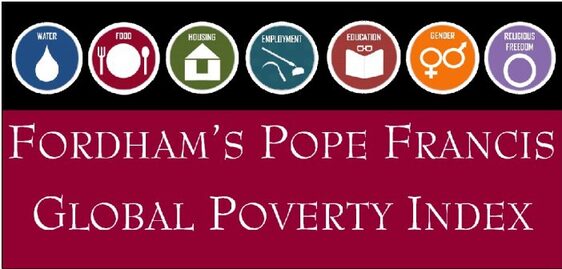
Fordham's Pope Francis’ Global Poverty Index
By Caitlin Neier
Caitlin Neier is an Education Major at St. John's University where she is an Ozanam Scholar. Caitlin is also President of the Society of St. Vincent de Paul for St. John's students. Caitlin recently began an internship with the Daughters of Charity at the UN.
(With information from the Fordham Francis Index)
Fordham University recently released a poverty index which measures values expressed in Pope Francis’ 2015 address to the United Nations General Assembly. The 2019 Pope Francis Global Poverty Index (FFI) was introduced September 17 at an event in the UN Church Center. It was prepared by Fordham’s Graduate Program in International Political Economy and Development Department (IPED).
The FFI (Fordham Francis Index) was initiated three years ago after The U.S. branch of the Vatican Foundation (Centesimus Annus Pro Pontifice) invited IPED to present at a 2016 international conference called Pope Francis’ Call for Escaping Poverty. The index, which reflects a multidimensional measure of international poverty, was is in response to Pope Francis’ Address to the United Nations on September 25, 2015.
In his Address, Pope Francis focused on two important topics: Material and Spiritual Well-being. The Material category focuses on four basic human needs: water, food, housing and employment. The Spiritual category focuses on religious freedom, education and gender equity.
FFI has an important approach for two reasons. The first is that it hones in on basic human needs, which in turn, allows for a much heavier focus on persons living in poverty and experiencing marginalization, pushing their needs to the forefront. Second, FFI focuses on Spiritual well-being when many other indexes do not. IPED notes that Spiritual well-being may be a driving force that encourages people to take control of their own lives, reflecting Pope Francis’ words, they become “dignified agents of their own destinies.”
Researchers identified short term global trends using the FFI. The areas that showed improvement included access to drinking water, access to better employment, and reduced illiteracy. On the other hand, gender equity did not show significant change and access to adequate nutrition has shown that it has worsened.
Since the Vincentian Family is focusing on housing it is important to note that FFI’s housing indicator shows that, “nearly 2 billion people, or 26% of the world’s population, lack adequate housing.” It is also interesting that there is no data listed in the FFI on inadequate housing in the United States. The countries with the highest housing deprivation are various areas of Sub-Saharan Africa.
Following the public release of the 2019 report, Professor Andrew Simons from Fordham’s economics department spoke on “Climate Change and the Potential Risk of Multiple Bread-Basket Failures."
By Caitlin Neier
Caitlin Neier is an Education Major at St. John's University where she is an Ozanam Scholar. Caitlin is also President of the Society of St. Vincent de Paul for St. John's students. Caitlin recently began an internship with the Daughters of Charity at the UN.
(With information from the Fordham Francis Index)
Fordham University recently released a poverty index which measures values expressed in Pope Francis’ 2015 address to the United Nations General Assembly. The 2019 Pope Francis Global Poverty Index (FFI) was introduced September 17 at an event in the UN Church Center. It was prepared by Fordham’s Graduate Program in International Political Economy and Development Department (IPED).
The FFI (Fordham Francis Index) was initiated three years ago after The U.S. branch of the Vatican Foundation (Centesimus Annus Pro Pontifice) invited IPED to present at a 2016 international conference called Pope Francis’ Call for Escaping Poverty. The index, which reflects a multidimensional measure of international poverty, was is in response to Pope Francis’ Address to the United Nations on September 25, 2015.
In his Address, Pope Francis focused on two important topics: Material and Spiritual Well-being. The Material category focuses on four basic human needs: water, food, housing and employment. The Spiritual category focuses on religious freedom, education and gender equity.
FFI has an important approach for two reasons. The first is that it hones in on basic human needs, which in turn, allows for a much heavier focus on persons living in poverty and experiencing marginalization, pushing their needs to the forefront. Second, FFI focuses on Spiritual well-being when many other indexes do not. IPED notes that Spiritual well-being may be a driving force that encourages people to take control of their own lives, reflecting Pope Francis’ words, they become “dignified agents of their own destinies.”
Researchers identified short term global trends using the FFI. The areas that showed improvement included access to drinking water, access to better employment, and reduced illiteracy. On the other hand, gender equity did not show significant change and access to adequate nutrition has shown that it has worsened.
Since the Vincentian Family is focusing on housing it is important to note that FFI’s housing indicator shows that, “nearly 2 billion people, or 26% of the world’s population, lack adequate housing.” It is also interesting that there is no data listed in the FFI on inadequate housing in the United States. The countries with the highest housing deprivation are various areas of Sub-Saharan Africa.
Following the public release of the 2019 report, Professor Andrew Simons from Fordham’s economics department spoke on “Climate Change and the Potential Risk of Multiple Bread-Basket Failures."
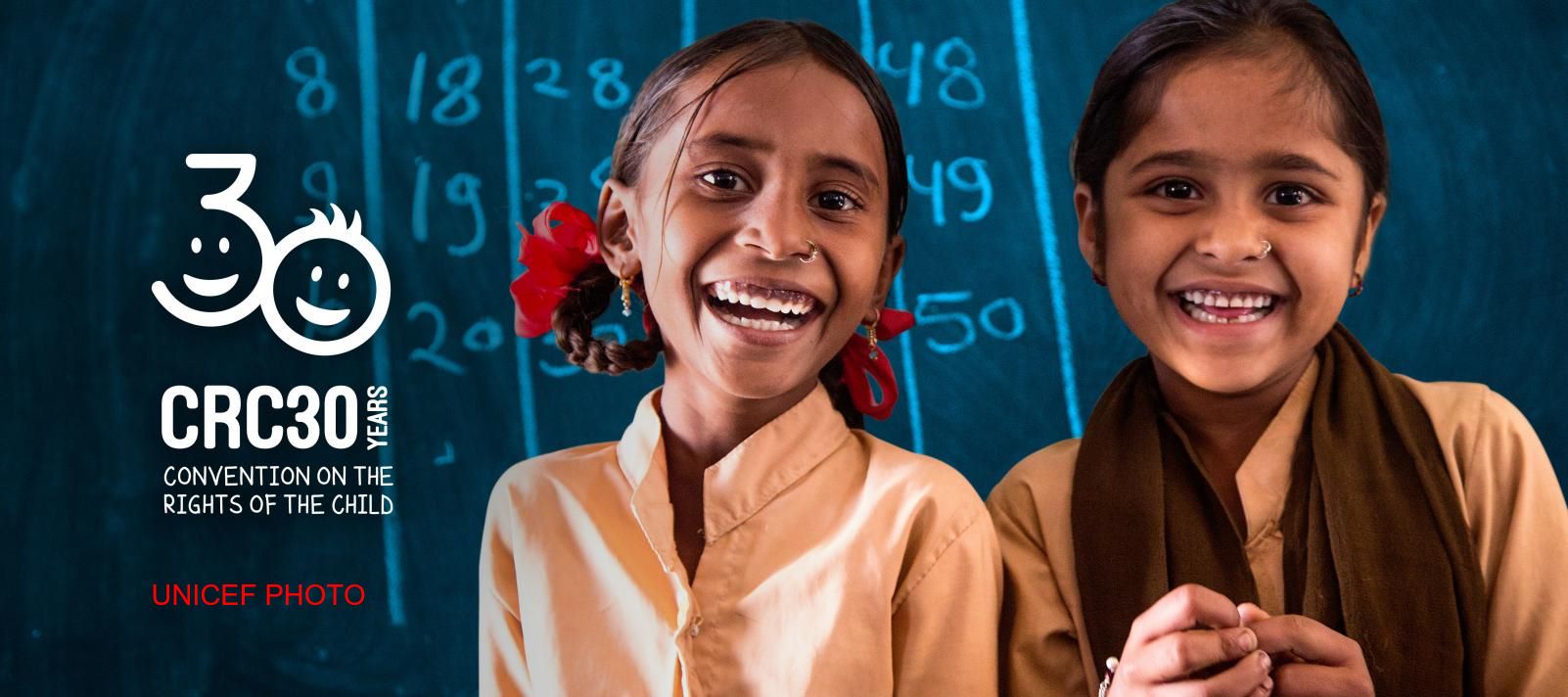
UN GENERAL ASSEMBLY TO MARK 30th ANNIVERSARY OF CONVENTION ON RIGHTS OF THE CHILD
By Caitlin Neier, intern
Margaret Mead, cultural anthropologist once said, “Children must be taught how to think, not what to think.” They also must be taught how to respect the rights of others by having their own rights respected and protected.
According to the United Nations Children’s Fund (UNICEF), childhood is “a special, protected time, in which children must be allowed to grow, learn, play, develop and flourish with dignity.” This occurs when their rights are honored.
Almost thirty years ago, on November 20th 1989, the United Nations took a monumental step by signing on to the Convention on the Rights of the Child. It went into effect starting on September 2nd 1990. According to UNICEF, the Convention on the Rights of the Child has gone down in history as being the “most widely ratified human rights treaty.”
The United Nations Treaty Collection indicates that the Convention has 140 signatures and has been ratified by 196 parties. The United States is the sole country not to have ratified it.
Although there are multiple issues being addressed at the United Nations in New York over the next couple weeks, with the 74th General Assembly in session, time will be taken to commemorate the milestones and successes of the Convention, as well as to reflect on the current challenges children face. A prayer service will be held Tuesday morning, September 24, at the UN Church Center. A high-level commemorative event is also scheduled for Wednesday morning, September 25, at UN Headquarters. Additional celebrations are scheduled for November in Geneva.
The Convention protects children and their legal rights and dignity. It emphasizes the fact that children are human beings, not objects or property of their parents. It also focuses on the difference between adulthood and childhood. According to the Convention, childhood lasts until the age of 18 years.
The Convention has had monumental impacts on the treatment of children today. Governments across the globe have changed laws and policies to ensure that children receive the proper health care and nutrition they need to grow and develop to have a sustained life. It has also helped to prevent and put an end to violence and exploitation against children. It has given a voice to the children of our world.
But children’s rights, safety, and well-being remain at risk. Issues such as conflict, the climate crisis, violence, inequalities, trafficking, poverty, stress, migration, bullying, health concerns, and more affect our world’s children.
It is up to us as readers to continue to advocate for the rights and dignity of children across the globe. Education is so important, there is still knowledge to be learned and spread as our world is ever-changing and different situations are constantly arising that affect the children, the future of our world.
With information from:
https://www.unicef.org/child-rights-convention/what-is-the-convention
https://treaties.un.org/pages/ViewDetails.aspx?src=IND&mtdsg_no=IV-11&chapter=4&lang=en
By Caitlin Neier, intern
Margaret Mead, cultural anthropologist once said, “Children must be taught how to think, not what to think.” They also must be taught how to respect the rights of others by having their own rights respected and protected.
According to the United Nations Children’s Fund (UNICEF), childhood is “a special, protected time, in which children must be allowed to grow, learn, play, develop and flourish with dignity.” This occurs when their rights are honored.
Almost thirty years ago, on November 20th 1989, the United Nations took a monumental step by signing on to the Convention on the Rights of the Child. It went into effect starting on September 2nd 1990. According to UNICEF, the Convention on the Rights of the Child has gone down in history as being the “most widely ratified human rights treaty.”
The United Nations Treaty Collection indicates that the Convention has 140 signatures and has been ratified by 196 parties. The United States is the sole country not to have ratified it.
Although there are multiple issues being addressed at the United Nations in New York over the next couple weeks, with the 74th General Assembly in session, time will be taken to commemorate the milestones and successes of the Convention, as well as to reflect on the current challenges children face. A prayer service will be held Tuesday morning, September 24, at the UN Church Center. A high-level commemorative event is also scheduled for Wednesday morning, September 25, at UN Headquarters. Additional celebrations are scheduled for November in Geneva.
The Convention protects children and their legal rights and dignity. It emphasizes the fact that children are human beings, not objects or property of their parents. It also focuses on the difference between adulthood and childhood. According to the Convention, childhood lasts until the age of 18 years.
The Convention has had monumental impacts on the treatment of children today. Governments across the globe have changed laws and policies to ensure that children receive the proper health care and nutrition they need to grow and develop to have a sustained life. It has also helped to prevent and put an end to violence and exploitation against children. It has given a voice to the children of our world.
But children’s rights, safety, and well-being remain at risk. Issues such as conflict, the climate crisis, violence, inequalities, trafficking, poverty, stress, migration, bullying, health concerns, and more affect our world’s children.
It is up to us as readers to continue to advocate for the rights and dignity of children across the globe. Education is so important, there is still knowledge to be learned and spread as our world is ever-changing and different situations are constantly arising that affect the children, the future of our world.
With information from:
https://www.unicef.org/child-rights-convention/what-is-the-convention
https://treaties.un.org/pages/ViewDetails.aspx?src=IND&mtdsg_no=IV-11&chapter=4&lang=en
|
UN GENERAL ASSEMBLY FEATURES FIVE SUMMITS
By Sr. Margaret O’Dwyer, DC (With information from the UN; images: UN) The United Nations in New York is bustling this month with its annual General Assembly, also known as the “GA.” The General Assembly is a time in which all 193 member states meet to address prominent global issues. This year’s Assembly opens tomorrow--September 17. But next week it will feature five significant summits. While presidents and prime ministers will contribute speeches to a debate, which is part of the GA, UN Secretary General Antonio Guterres is deeply interested in hearing about action, particularly related to climate change. A prayer service to mark the opening of the 74th General Assembly and call a blessing upon it will be held tonight (September 16) at the Church of the Holy Family in Manhattan. The President of this year’s General Assembly is H.E. Prof. Tijjani Muhammad-Bande, Permanent Representative of Nigeria to the United Nations. Some of the events during the General Assembly can be seen on UN Web TV. The link is: http://webtv.un.org/ CLIMATE SUMMIT: The Climate Summit takes place on Monday, September 23, although it will be preceded by a youth climate Summit this Saturday. Not only member states, but representatives of many other sectors will address six particular areas, including resilience and adaptation to climate impacts, management of forests and oceans, global transition to renewable energy, sustainable agriculture, sustainable infrastructures and cities, and aligning public and private finance with a net zero economy. The Secretary General is keen to learn what countries are doing to meet their obligations under the Paris Climate Agreement, cut emissions by 2020, and achieve net zero emissions by mid-century. Teen climate advocate Greta Thunberg, of Sweden, will lead a climate action in New York’s Foley Square on Friday, September 20. In addition to speaking at the Summit, she will visit a series of pollution pods displayed in front of the UN, in which the air quality of six cities will be portrayed. UNIVERSAL HEALTH COVERAGE SUMMIT: Sustainable Development Goal 3 focuses upon healthy lives and well-being for all. Alongside the Climate Summit, next Monday, will take place a first-ever Summit on Universal Health Coverage. The theme is “Moving Together to Build a Healthier World.” The Summit will put the spotlight on lack of access to health care for so many and the financial impact upon those who can access it. SUSTAINABLE DEVELOPMENT GOAL (SDG) SUMMIT: In 2015, member states agreed to 17 Sustainable Development Goals which would promote both people and planet. They include aims such as ending poverty and hunger, reducing inequalities, ensuring quality education for all, peace, climate action, protecting Earth’s land and water and more. Progress towards achieving the goals will be discussed during an SDG Summit scheduled for Tuesday and Wednesday, September 24 and 25. FINANCE FOR DEVELOPMENT: The target date for meeting the Sustainable Development Goals is 2030. It will take trillions to be successful in reaching the goals by then. The Finance for Development Summit, scheduled for Thursday, September 26, will promote discussion and partnerships among government, public, and private sectors to accelerate means of finding funds to achieve the goals. SMALL ISLAND STATES: It is no secret that Small Island Developing States (SIDS) bear a significant brunt of climate-related phenomenon, such as sea-level rise, and can be vulnerable to economic fluctuations. The final summit planned during the General Assembly is the Mid-Term Review of the SAMOA (Small Island Developing States Accelerated Modalities of Action) Pathway. The Review takes place on Saturday, September 27. |
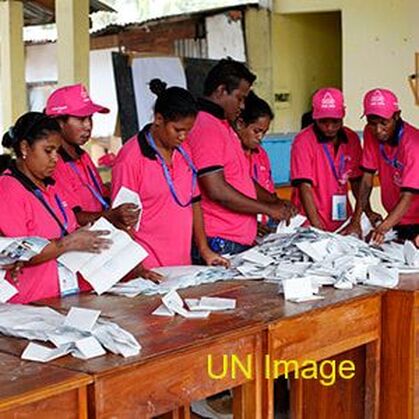
International Day of Democracy
Sunday, September 15, is International Day of Democracy. This year’s focus is on participation.
The ability to vote, to express opinions freely, to be included, and to experience equal opportunities and treatment are key components of democracy. Yet, democracy is seriously under assault.
Larry Diamond, a leading researcher, scholar, and writer about democracy, expresses that threat well in his recent book, Ill Winds. “In every region of the world, autocrats are seizing the initiative, democrats are on the defensive, and the space for competitive politics and free expression is shrinking,” he notes. Diamond points out that democracies are becoming increasingly polarized, intolerant and dysfunctional.
“Emerging democratic states are drowning in corruption, struggling for legitimacy, and fighting against growing external threats,” Diamond says.
When you think of the United Nations, you might think of ways it has encouraged democracy globally. Since its creation 75 years ago, the UN has been engaged in activities such as peace keeping operations, monitoring elections, encouraging accountability, and much more.
“As we mark Democracy Day,” said UN Secretary-General, Antonio Guterres, “I urge all governments to respect the right to active, substantive and meaningful participation; and I salute all of you who strive tirelessly to make this happen.”
In a world which has curbed freedom of expression and participation in various ways, it is crucial that efforts are made to preserve principles of democracy. Democracy, though not the only form of government, should be focused on protecting human rights. It should also be a facilitator of peace-building and sustainability. Inclusion, equal treatment, and participation are vital components of it. We cannot be complacent about the erosion of democracy throughout the world.
Sunday, September 15, is International Day of Democracy. This year’s focus is on participation.
The ability to vote, to express opinions freely, to be included, and to experience equal opportunities and treatment are key components of democracy. Yet, democracy is seriously under assault.
Larry Diamond, a leading researcher, scholar, and writer about democracy, expresses that threat well in his recent book, Ill Winds. “In every region of the world, autocrats are seizing the initiative, democrats are on the defensive, and the space for competitive politics and free expression is shrinking,” he notes. Diamond points out that democracies are becoming increasingly polarized, intolerant and dysfunctional.
“Emerging democratic states are drowning in corruption, struggling for legitimacy, and fighting against growing external threats,” Diamond says.
When you think of the United Nations, you might think of ways it has encouraged democracy globally. Since its creation 75 years ago, the UN has been engaged in activities such as peace keeping operations, monitoring elections, encouraging accountability, and much more.
“As we mark Democracy Day,” said UN Secretary-General, Antonio Guterres, “I urge all governments to respect the right to active, substantive and meaningful participation; and I salute all of you who strive tirelessly to make this happen.”
In a world which has curbed freedom of expression and participation in various ways, it is crucial that efforts are made to preserve principles of democracy. Democracy, though not the only form of government, should be focused on protecting human rights. It should also be a facilitator of peace-building and sustainability. Inclusion, equal treatment, and participation are vital components of it. We cannot be complacent about the erosion of democracy throughout the world.
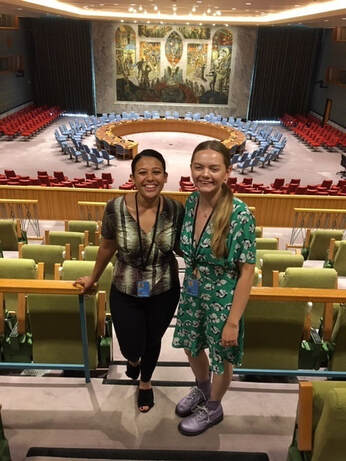
FALL INTERNS WELCOMED
So pleased to welcome Steffi Romero and Caitlyn Neier as new interns to our Office in New York! Steffi and Caitlyn are seniors in the St. John's University Ozanam Scholars Program. The Program focuses on three main themes: academic scholarship, global citizenship, and Vincentian service.
Caitlyn is majoring in Education while Steffi is majoring in Advertising. Both are pursuing social justice minors.
Steffi just returned from a two-week service experience in Ghana, where the Ozanam Scholars partnered with local organizations to address various social justice issues, such as migration, poverty, and homelessness.
Caitlyn is the new President of the Saint Vincent de Paul Society on the St. John's Campus. She is coordinating efforts to link students with the ministry of the Saint Vincent de Paul Society.
Welcome, Steffi and Caitlyn!
So pleased to welcome Steffi Romero and Caitlyn Neier as new interns to our Office in New York! Steffi and Caitlyn are seniors in the St. John's University Ozanam Scholars Program. The Program focuses on three main themes: academic scholarship, global citizenship, and Vincentian service.
Caitlyn is majoring in Education while Steffi is majoring in Advertising. Both are pursuing social justice minors.
Steffi just returned from a two-week service experience in Ghana, where the Ozanam Scholars partnered with local organizations to address various social justice issues, such as migration, poverty, and homelessness.
Caitlyn is the new President of the Saint Vincent de Paul Society on the St. John's Campus. She is coordinating efforts to link students with the ministry of the Saint Vincent de Paul Society.
Welcome, Steffi and Caitlyn!
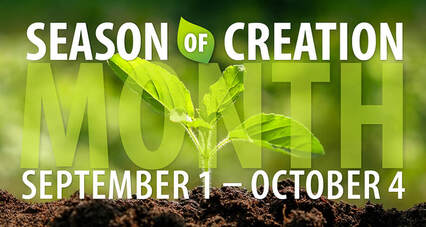
SEASON OF CREATION BEGINS TODAY
Today—September 1—begins the Season of Creation. The Season of Creation refers to the month-long period from September 1 to October 4, which is the Feast of St. Francis of Assisi. Pope Francis invites us globally to make today a World Day of Prayer for Creation.
With the Amazon burning, species disappearing, oceans experiencing pollution and depreciation of fish stocks, and natural disasters, we have cause to ask God to help us-and to take action ourselves-to preserve Earth.
During the Season of Creation, some offer prayers, some take a deeper look into Laudato Si, some plant trees, some engage in clean-up projects, some adjust lifestyles to become more conserving of resources, and some advocate for eco-friendly policies. What will you do?
The United Nations will be addressing climate issues during a Summit on climate change later this month. Many other associated activities are planned.
To view a prayer service for the Care of Creation, go to the following link:
http://www.iustitiaetpax.va/content/dam/giustiziaepace/Eventi/giornatamondialepreghieracuracreato2015/2017.09.01_PRAYERSERVICE_ENG.pdf
Today—September 1—begins the Season of Creation. The Season of Creation refers to the month-long period from September 1 to October 4, which is the Feast of St. Francis of Assisi. Pope Francis invites us globally to make today a World Day of Prayer for Creation.
With the Amazon burning, species disappearing, oceans experiencing pollution and depreciation of fish stocks, and natural disasters, we have cause to ask God to help us-and to take action ourselves-to preserve Earth.
During the Season of Creation, some offer prayers, some take a deeper look into Laudato Si, some plant trees, some engage in clean-up projects, some adjust lifestyles to become more conserving of resources, and some advocate for eco-friendly policies. What will you do?
The United Nations will be addressing climate issues during a Summit on climate change later this month. Many other associated activities are planned.
To view a prayer service for the Care of Creation, go to the following link:
http://www.iustitiaetpax.va/content/dam/giustiziaepace/Eventi/giornatamondialepreghieracuracreato2015/2017.09.01_PRAYERSERVICE_ENG.pdf
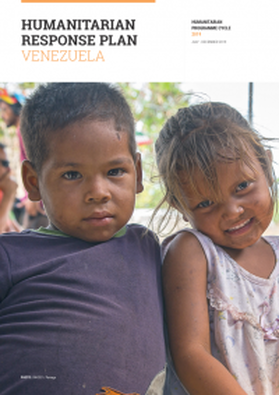
UN ANNOUNCES HUMANITARIAN AID PLAN FOR VENEZUELA
By: Margaret O’Dwyer, DC
(With information from the UN Office for the Coordination of Humanitarian Affairs)
FAMVIN has consistently run a statement of Vincentian Family solidarity with the suffering people of Venezuela. You may wonder, “What is the UN doing?”
The UN has been on the ground in Venezuela for some time and consistently searching for effective ways to address needs. On August 14, the UN Office for the Coordination of Humanitarian Affairs (OCHA) announced a new Venezuela Humanitarian Response Plan. The Plan appeals for $223 million to provide humanitarian assistance to 2.6 million Venezuelan children, women and men until the end of the year. (Please find below links to the Plan in English and in Spanish).
*The Plan is focused upon 2.6 million people, which includes 1.4 million girls and women and 1.2 million boys and men.
*The Plan includes 98 projects that will be implemented by more than 60 UN agencies and international and national NGOs and covers the areas of health, nutrition, water, sanitation and hygiene, education, food security and protection.
*The Plan aims to cover the most pressing humanitarian needs across the entire country with a focus on 10 priority states. There is a particular focus on the western and southern border regions and the Capital District.
*This Plan builds on an ongoing humanitarian response being provided by the UN and national and international NGOs. Since 2018, the UN and humanitarian partners have been scaling up their efforts to respond to humanitarian needs, with particular focus on health, nutrition and protection. For example: (i) since April 2018 8.5m children have been vaccinated against measles; (ii) since May 2018 350 tons of medicine and medical supplies have been imported and distributed to 41 hospitals and 23 health centers in 18 states; (iii) since January 2019 close to 85,000 preventative and curative treatments for acute malnutrition have been administered; and (iv) 185,000 people have been provided with access to safe water. This is just a sample of the assistance that has been provided, and additional information is available in the Plan.
Links to the report in Spanish and English:
https://reliefweb.int/report/venezuela-bolivarian-republic/venezuela-humanitarian-response-plan-july-2019-december-2019
https://reliefweb.int/report/venezuela-bolivarian-republic/plan-de-respuesta-humanitario-venezuela-julio-2019-diciembre
By: Margaret O’Dwyer, DC
(With information from the UN Office for the Coordination of Humanitarian Affairs)
FAMVIN has consistently run a statement of Vincentian Family solidarity with the suffering people of Venezuela. You may wonder, “What is the UN doing?”
The UN has been on the ground in Venezuela for some time and consistently searching for effective ways to address needs. On August 14, the UN Office for the Coordination of Humanitarian Affairs (OCHA) announced a new Venezuela Humanitarian Response Plan. The Plan appeals for $223 million to provide humanitarian assistance to 2.6 million Venezuelan children, women and men until the end of the year. (Please find below links to the Plan in English and in Spanish).
*The Plan is focused upon 2.6 million people, which includes 1.4 million girls and women and 1.2 million boys and men.
*The Plan includes 98 projects that will be implemented by more than 60 UN agencies and international and national NGOs and covers the areas of health, nutrition, water, sanitation and hygiene, education, food security and protection.
*The Plan aims to cover the most pressing humanitarian needs across the entire country with a focus on 10 priority states. There is a particular focus on the western and southern border regions and the Capital District.
*This Plan builds on an ongoing humanitarian response being provided by the UN and national and international NGOs. Since 2018, the UN and humanitarian partners have been scaling up their efforts to respond to humanitarian needs, with particular focus on health, nutrition and protection. For example: (i) since April 2018 8.5m children have been vaccinated against measles; (ii) since May 2018 350 tons of medicine and medical supplies have been imported and distributed to 41 hospitals and 23 health centers in 18 states; (iii) since January 2019 close to 85,000 preventative and curative treatments for acute malnutrition have been administered; and (iv) 185,000 people have been provided with access to safe water. This is just a sample of the assistance that has been provided, and additional information is available in the Plan.
Links to the report in Spanish and English:
https://reliefweb.int/report/venezuela-bolivarian-republic/venezuela-humanitarian-response-plan-july-2019-december-2019
https://reliefweb.int/report/venezuela-bolivarian-republic/plan-de-respuesta-humanitario-venezuela-julio-2019-diciembre
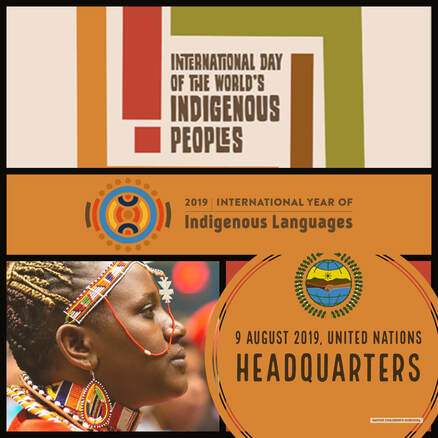
MESSAGE ON INTERNATIONAL DAY OF INDIGENOUS PEOPLES: PRESERVE LANGUAGE
By: Margaret O’Dwyer, DC
When serving in the Cook Islands a few years back, I enjoyed listening to speech competitions at the Catholic High School, Nukutere College. In particular, it was heartening to hear students deliver talks in Cook Islands Maori. There was something about listening to students convey ideas in their own language which heightened my sense that they took deep pride in, and enthusiastically embraced, a very rich culture and identity with significant history and traditions.
Sadly, in some parts of the world, languages are disappearing. According to UNESCO, there are about 7,000 languages spoken worldwide, of which 2,680 are in danger of being lost, many of them indigenous. It is estimated that an indigenous language vanishes every two weeks, which jeopardizes the preservation of cultures and the transference of local knowledge.
(Image from UN and robbyromero.com)
Awareness-raising about the urgent need to revitalize, preserve and promote indigenous languages is the focus of this year’s International Day of the World’s Indigenous Peoples, August 9. The day’s theme, Indigenous Languages, is in keeping with the fact that 2019 is the International Year of Indigenous Languages. During the International Year, the UN is promoting indigenous languages in five particular areas:
1. Increasing understanding, reconciliation and international cooperation.
2. Creation of favorable conditions for knowledge-sharing and dissemination of good practices with regards to indigenous languages.
3. Integration of indigenous languages into standard setting.
4. Empowerment through capacity building.
5. Growth and development through elaboration of new knowledge.
At the United Nations in New York on August 9, the UN will observe International Day of World’s Indigenous Peoples with a four-fold program. It will include a high level segment featuring the Deputy Secretary General, Amina Muhammed, and President of the 73rd Session of the General Assembly, Maria Fernanda Espinosa Garces. In addition, it will include a panel of speakers from Kenya, Canada, Bangladesh, and Peru, as well as an interactive dialogue on innovations in indigenous languages, and an innovation hub related to indigenous languages in the lobby of the UN.
International Day of the World’s Indigenous Peoples marks the first session of the Working Group on Indigenous Populations, which took place at the UN in Geneva in 1982.
There are an estimated 350 million indigenous people in 90 countries in the world. Many groups share common issues regarding human rights violations. Although language will have the spotlight on International Day of the World’s Indigenous Peoples, August 9, let’s not forget the horrific human rights violations indigenous peoples face, including grabbing of their land, kidnapping, assaults, murder, destruction of their land and resources, and more.
By: Margaret O’Dwyer, DC
When serving in the Cook Islands a few years back, I enjoyed listening to speech competitions at the Catholic High School, Nukutere College. In particular, it was heartening to hear students deliver talks in Cook Islands Maori. There was something about listening to students convey ideas in their own language which heightened my sense that they took deep pride in, and enthusiastically embraced, a very rich culture and identity with significant history and traditions.
Sadly, in some parts of the world, languages are disappearing. According to UNESCO, there are about 7,000 languages spoken worldwide, of which 2,680 are in danger of being lost, many of them indigenous. It is estimated that an indigenous language vanishes every two weeks, which jeopardizes the preservation of cultures and the transference of local knowledge.
(Image from UN and robbyromero.com)
Awareness-raising about the urgent need to revitalize, preserve and promote indigenous languages is the focus of this year’s International Day of the World’s Indigenous Peoples, August 9. The day’s theme, Indigenous Languages, is in keeping with the fact that 2019 is the International Year of Indigenous Languages. During the International Year, the UN is promoting indigenous languages in five particular areas:
1. Increasing understanding, reconciliation and international cooperation.
2. Creation of favorable conditions for knowledge-sharing and dissemination of good practices with regards to indigenous languages.
3. Integration of indigenous languages into standard setting.
4. Empowerment through capacity building.
5. Growth and development through elaboration of new knowledge.
At the United Nations in New York on August 9, the UN will observe International Day of World’s Indigenous Peoples with a four-fold program. It will include a high level segment featuring the Deputy Secretary General, Amina Muhammed, and President of the 73rd Session of the General Assembly, Maria Fernanda Espinosa Garces. In addition, it will include a panel of speakers from Kenya, Canada, Bangladesh, and Peru, as well as an interactive dialogue on innovations in indigenous languages, and an innovation hub related to indigenous languages in the lobby of the UN.
International Day of the World’s Indigenous Peoples marks the first session of the Working Group on Indigenous Populations, which took place at the UN in Geneva in 1982.
There are an estimated 350 million indigenous people in 90 countries in the world. Many groups share common issues regarding human rights violations. Although language will have the spotlight on International Day of the World’s Indigenous Peoples, August 9, let’s not forget the horrific human rights violations indigenous peoples face, including grabbing of their land, kidnapping, assaults, murder, destruction of their land and resources, and more.
|
Human Trafficking Addressed in Multiple Ways at the UN Recently By: Sr. Margaret O’Dwyer, DC The issue of human trafficking has been front and center at the UN recently, with commemoration of the World Day against Trafficking in Persons on Tuesday, July 30, a photo display about the work of sisters to end trafficking, panels of speakers, and a briefing on the 2019 Trafficking in Persons (TIP) Report. Although many may think the phenomenon does not happen in their neighborhood, human trafficking is prevalent, though often hidden, everywhere. It could be a young girl baited by a young man who raises her hopes of finding love; a man who migrates from a rural area with his eye on a mining job, but winds up working for extended periods of time without pay; a woman lured to another country by the false promise of marriage; a young woman ensnared in sex trafficking through assurances of a better life; or a child sold as a laborer by his family living in poverty, for the sake of income. WORLD DAY TO END TRAFFICKING THEME CHALLENGES GOVERNMENTS TO TAKE STRONGER ACTION The theme of this year’s World Day to End Trafficking in Persons was: “Human Trafficking: Call Your Government to Action.” Despite many efforts to halt the assault on dignity that is human trafficking, and regardless of the fact that many governments have anti-trafficking legislation in place, victims continue to suffer while traffickers experience impunity. Thus, governments and all are challenged to take stronger actions, such as raising more awareness, collecting stronger data, addressing systems supporting trafficking, stepping up efforts to protect victims, prosecuting perpetrators, and more. TALITHA KUM ANNIVERSARY Last Monday, July 29, Talitha Kum celebrated its 10th anniversary with events sponsored by the Permanent Observer of the Holy See to the United Nations and the Galileo Foundation. In addition to a panel of speakers, activities included a reception and a photo exhibit entitled, “Nuns Healing Hearts,” by Lisa Kristine, of the Human Thread Foundation. Panelists spoke on the topic, “Faces in the Fight Against Human Trafficking.” Talitha Kum is an international network of nuns and sisters whose purpose is ending human trafficking. The organization includes over 2,000 sisters from 77 countries on 5 continents. Sr. Gabriella Bottani, SCM, serves as leader of Talitha Kum. DAUGHTERS OF CHARITY PARTICIPATE ON PANEL AT UN CHURCH CENTER Sr. Michelle Loisel, DC, participated on a panel of speakers at the United Nations Church Center on Tuesday, July 30. The panel was entitled, “Strengthening Connections to End Human Trafficking (an interactive dialogue with Talitha Kum, US Catholic Sisters Against Human Trafficking, and NGOs at the UN). Sr. Michelle was invited to offer her perspective on ways in which collaboration between those working at the grass roots, local or regional levels; NGO representatives at the United Nations; and Talitha Kum can be enhanced in fighting human trafficking. Michelle serves as Coordinator of Provincial Response to Migrants and Issues of Modern Human Slavery for the St. Louise Province of the Company of the Daughters of Charity in St. Louis, Missouri. PHOTO DISPLAY ABOUT NUNS/SISTERS WORKING TO END TRAFFICKING On World Day Against Trafficking in Persons, a photo collection featuring the efforts of sisters worldwide to end trafficking in persons, by Lisa Kristine, was exhibited at the United Nations Glass Palace in New York. Archbishop Bernadito Auza, Permanent Observer of the Holy See Mission to the United Nations, presented more than 20 images featuring sisters who are part of Talitha Kum engaged in their work to end human trafficking. Pope Francis had viewed the display on May 10, ahead of a meeting engaging over 800 leaders of sisters’ congregations. The photographs were funded by the Galileo Foundation, and supported by the Migrants and Refugees Section of the Dicastery for Promoting Integral Human Development, as well as members of Talitha Kum. Sister Bottani had previously commented that the pictures are of hope, and that they open a window to the sacred and the beauty that illuminates and sustains our humanity. To read about Talitha Kum and Nuns Healing Hearts, go to this link: https://nunshealinghearts.org/ BRIEFING ON 2019 TRAFFICKING IN PERSONS REPORT US Ambassador-at-large to Combat Trafficking in Persons, John Cotton Richmond, on Wednesday, July 24, provided a briefing at the US Mission to the United Nations on the 2019 Trafficking in Persons (TIP) Report, which was just released in late June. The TIP Report reflects efforts in 187 countries to meet minimum standards to address trafficking in persons, with a focus on protecting victims, prosecuting perpetrators, and preventing trafficking by dismantling systems which support the crime. This year’s report also includes a section on anti-trafficking heroes and heroines. The annual TIP Report is mandated by the Trafficking Victims Protection Act (TVPA). Global estimates reflect that there are approximately 24.9 million trafficking victims, the Ambassador said. This year’s TIP Report focuses on activities to combat trafficking within countries, as opposed to transnationally, because an estimated 77 percent of traffickers are exploited within their own country, he noted. The TIP report features four tiers: 1, which includes countries fully complying with TVPA’s minimum standards; 2, nations that don’t fully comply with TVPA’s minimum standards but are making significant efforts to do so; a Tier 2 Watch List; and Tier 3, which includes countries not meeting minimum standards and not making efforts significant to achieve them. The Ambassador noted that being placed in the top tier does not mean a country has no human trafficking issues or that it has done a sufficient amount to combat trafficking. Countries must show appreciable progress in addressing trafficking each year to stay at that level. Those falling into Tier 3 could be subject to restrictions on non-humanitarian, non-trade related US foreign assistance. The 2019 TIP Report shows that there are about 33 countries at the Tier 1 level. Almost 100 were ranked in Tier 2. 38 countries are on the Tier 2 Watch List. And 21 countries fall at the Tier 3 level. Bhutan, The Gambia, Cuba, and Saudi Arabia slipped to Tier 3 this year. Seven countries are in danger of doing so next year. Six countries moved from Tier 1 to Tier 2. On the other hand, Belize, Bolivia, Gabon, and Laos were upgraded to the Tier 2 Watch List from Tier 3. The TIP Report can be accessed at this link: https://www.state.gov/reports/2019-trafficking-in-persons-report/ TROUBLING TREND A disturbing trend which can affect human trafficking is the discussion or movement to decriminalize “sex work” in some US states. If approved, these proposals could lead to more exploitation and human trafficking. Proponents would do well to check out Germany and Netherlands, where, after decriminalization, there has been an increase in undocumented immigrants in prostitution. One has to wonder how many of them have been trafficked. |
|
Top Photo: Panelists on inequality listen to a poem about inequalities experienced by African Women. Second photo: Attending the launch of the Spotlight Report (photo by FES). Third photo: Geraldine Byrne-Nason, Permanent Representative of the Permanent Mission of Ireland to the UN in New York, opens a presentation about how countries are striving to achieve Sustainable Development Goal 4, which relates to education. Fourth photo: Archbishop Bernadito Auza, Permanent Observer of the Holy See to the United Nations, with youth who participated in an event related to Youth Aspirations and Climate Urgency.
|
United Nations High Level Political Forum
How have the Daughters of Charity engaged with the High Level Political Forum (HHLPF) at the United Nations in New York July 9-18? The Forum is an annual event during which some countries are reviewed based on their progress in achieving the UN’s 17 Sustainable Development Goals. This year, Goal 4 (education), 8 (decent work), 10 (reduce inequality), 13 (promote urgent action to address climate change), 16 (promote peaceful and inclusive societies), and 17 (partnerships to achieve the Goals) were the focus. In addition to attending the opening session, the Daughters of Charity participated in multiple activities. Most significantly, Sr. Margaret O’Dwyer, DC, moderated a panel of speakers for an event entitled, “Lived Experiences of Inequality: Grassroots Respond.” That panel presented on Tuesday, July 16, at the Church Center at the UN, highlighting results of a survey about inequalities which the Grass Roots Task Force had previously conducted in six languages. Speakers included a migrant from Syria, a principal from Pakistan, and an art therapist working with immigrant women in the US. The report summary was presented by a social worker and a student from Marymount Manhattan College. “We cannot reflect the voices of people at the grass roots level unless we have a means of hearing their experience,” said Sr. Margaret, an NGO Representative to the UN in New York for the Daughters of Charity. “The Grass Roots survey is one of the methods by which we can do this. So, a huge thank you to all the Daughters of Charity who completed the survey or encouraged people in their communities to do so.” The sisters further met with Renato Lima de Oliveira, President General of the Society of Saint Vincent de Paul, along with other Vincentian Family NGOS. They discussed their work at the UN and received the Society’s support. Mr. De Oliveira accompanied the sisters to an event at the Permanent Mission of Ireland to the UN, which focused on ways to achieve Sustainable Development Goal 4. The President General was able to show Ambassador Geraldine Byrne-Nason his mid-term report for the Society. The Daughters of Charity are part of a Working Group to End Homelessness at the United Nations. That Group advocated diligently for homelessness as a theme of the Commission for Social Development in February, 2020. Because “affordable protection and social protection for all to end homelessness,” in fact, will be the Commission’s theme, the sisters encouraged member states to participate in that Commission by distributing brochures during the HLPF. On July 11, the sisters participated in an event during which the Spotlight Report was launched. In the report, entitled, the “Reshaping governance for sustainability,” civil society explores ways to transform institutions, shift power, and strengthen rights. The sisters also attended events related to climate change, finance for development, how faith-based organizations can contribute towards achieving the Sustainable Development Goals, issues related to Small Island Developing States, youth, and more. The further viewed films depicting good practices in achieving the Sustainable Development Goals. |
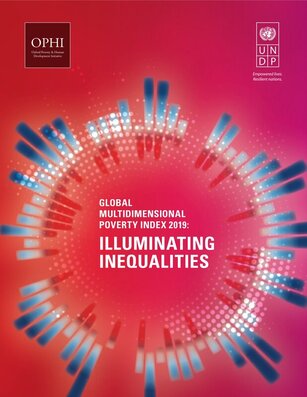
MULTIDIMENSIONAL POVERTY REPORT RELEASED
BY: Margaret O'Dwyer, DC
(With information from UNDP)
The United Nations this week released a report about poverty and its different aspects. The 2019 Global Muldimensional Poverty Index recognizes that people experience poverty in various ways; not by income alone.
The report is produced by the the United Nations Development Programme (UNDP) and the Oxford Poverty and Human Development Initiative (OPHI). It is designed to help policy makers create more effective policies. It can be accessed by scrolling down on the page which appears at this link: http://hdr.undp.org/en/2019-MPI
This year's report reflects that in the 101 countries reviewed, about 1.3 billion people experienced multidimensional poverty. A majority live in middle-income countries. The report notes that Sub-Saharan Africa and South Asia have the largest proportion of persons living in poverty, about 84.5 per cent. India has made some good progress, although there is more to be done.
Children bear the brunt of multidimensional poverty, as half of the 1.3 billion people experiencing it are children under 18. In Burkina Faso, Chad, Ethiopia, Niger and South Sudan, 90 per cent or more of children under the age of 10 are considered to be multidimensionally poor.
BY: Margaret O'Dwyer, DC
(With information from UNDP)
The United Nations this week released a report about poverty and its different aspects. The 2019 Global Muldimensional Poverty Index recognizes that people experience poverty in various ways; not by income alone.
The report is produced by the the United Nations Development Programme (UNDP) and the Oxford Poverty and Human Development Initiative (OPHI). It is designed to help policy makers create more effective policies. It can be accessed by scrolling down on the page which appears at this link: http://hdr.undp.org/en/2019-MPI
This year's report reflects that in the 101 countries reviewed, about 1.3 billion people experienced multidimensional poverty. A majority live in middle-income countries. The report notes that Sub-Saharan Africa and South Asia have the largest proportion of persons living in poverty, about 84.5 per cent. India has made some good progress, although there is more to be done.
Children bear the brunt of multidimensional poverty, as half of the 1.3 billion people experiencing it are children under 18. In Burkina Faso, Chad, Ethiopia, Niger and South Sudan, 90 per cent or more of children under the age of 10 are considered to be multidimensionally poor.
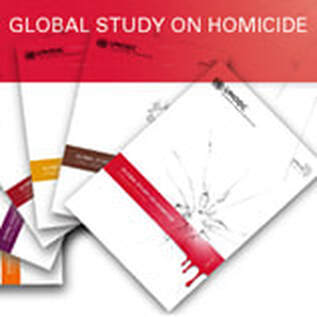
UNODC REPORT: MORE PEOPLE KILLED BY HOMICIDES THAN IN ARMED CONFLICTS
BY: Margaret O’Dwyer, DC
(With information from UNODC press release)
A new UN report issued July 8 reflects that far more people were killed by homicide in 2017 than in armed conflict. The Global Study on Homicide indicates that about 464,000 people globally were killed, while 89,000 were killed in armed conflicts in the same period. The report was issued by the United Nations Office on Drugs and Crime (UNODC). The global homicide rate, or numbers of homicide victims per 100,000 persons, declined from 7.2 in 1992, to 6.1 in 2017, the report shows. The decline can be deceiving, as in some regions, the rate is very high.
The Global Study on Homicide is available online at this link: https://www.unodc.org/unodc/en/data-and-analysis/global-study-on-homicide.html
What are the drivers of homicide? The study indicates they include inequality, unemployment, political instability, the prevalence of gender stereotypes in society, and the presence of organized crime. In fact, organized crime was responsible for up to 19 percent of all homicides in 2017. And since the beginning of the 21st century, organized crime killed about as many people as all armed conflicts across the world combined, according to the UNODC.
The report offers insights with regard to gender and regions. In terms of gender, 81 percent of homicide victims in 2017 were men and boys, and more than 90 percent of suspects were men. The report shows that the risk of boys becoming homicide victims increases with age. Men and male adolescents between 15 and 29 are at the highest risk of homicide globally, it indicates. Generally, women and girls represent a smaller number of victims, but by far they are subject to more intimate-partner and family-related homicides.
The Americas experienced the highest rate of homicides (17.2) in the region since records were first kept in 1990. Asia, with 60 percent of the world's population, had the lowest rate. In Central America, one country had a rate as high as 62.1. In South America, the country with the highest homicide rate (56.8) had a rate more than 16 times that of the country with the lowest. Within countries in the Americas, high homicide levels are clustered, with some local populations facing homicide rates comparable to death rates in conflict zones and others having a very low risk. In addition to the Americas, Africa also featured a higher-than-average rate of 13.0 victims per 100,000 people.
The UNODC report doesn’t simply reflect upon sobering numbers. It also offers suggestions for reducing the rates. Education is one of them. A governance model centered on the rule of law, curbing corruption, and investing in socioeconomic development, are noted as critical in bringing down the rate of violent crime. Firearms and drugs and alcohol are further facilitators of homicide that need to be addressed, according to the study.
BY: Margaret O’Dwyer, DC
(With information from UNODC press release)
A new UN report issued July 8 reflects that far more people were killed by homicide in 2017 than in armed conflict. The Global Study on Homicide indicates that about 464,000 people globally were killed, while 89,000 were killed in armed conflicts in the same period. The report was issued by the United Nations Office on Drugs and Crime (UNODC). The global homicide rate, or numbers of homicide victims per 100,000 persons, declined from 7.2 in 1992, to 6.1 in 2017, the report shows. The decline can be deceiving, as in some regions, the rate is very high.
The Global Study on Homicide is available online at this link: https://www.unodc.org/unodc/en/data-and-analysis/global-study-on-homicide.html
What are the drivers of homicide? The study indicates they include inequality, unemployment, political instability, the prevalence of gender stereotypes in society, and the presence of organized crime. In fact, organized crime was responsible for up to 19 percent of all homicides in 2017. And since the beginning of the 21st century, organized crime killed about as many people as all armed conflicts across the world combined, according to the UNODC.
The report offers insights with regard to gender and regions. In terms of gender, 81 percent of homicide victims in 2017 were men and boys, and more than 90 percent of suspects were men. The report shows that the risk of boys becoming homicide victims increases with age. Men and male adolescents between 15 and 29 are at the highest risk of homicide globally, it indicates. Generally, women and girls represent a smaller number of victims, but by far they are subject to more intimate-partner and family-related homicides.
The Americas experienced the highest rate of homicides (17.2) in the region since records were first kept in 1990. Asia, with 60 percent of the world's population, had the lowest rate. In Central America, one country had a rate as high as 62.1. In South America, the country with the highest homicide rate (56.8) had a rate more than 16 times that of the country with the lowest. Within countries in the Americas, high homicide levels are clustered, with some local populations facing homicide rates comparable to death rates in conflict zones and others having a very low risk. In addition to the Americas, Africa also featured a higher-than-average rate of 13.0 victims per 100,000 people.
The UNODC report doesn’t simply reflect upon sobering numbers. It also offers suggestions for reducing the rates. Education is one of them. A governance model centered on the rule of law, curbing corruption, and investing in socioeconomic development, are noted as critical in bringing down the rate of violent crime. Firearms and drugs and alcohol are further facilitators of homicide that need to be addressed, according to the study.
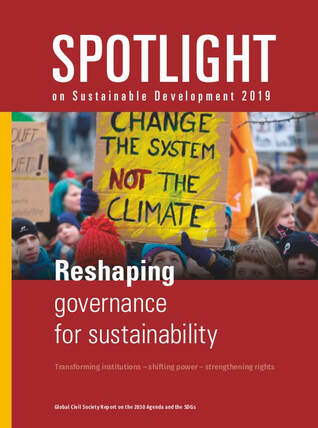
SPOTLIGHT REPORT REFLECTS GAPS IN ACHIEVING SUSTAINABLE DEVELOPMENT GOALS
BY: Margaret O'Dwyer, DC
(With information from the Civil Society Reflection Group on the 2030 Agenda for Sustainable Development)
The High Level Political Forum, which is taking place now through July 18 at UN Headquarters in New York, typically involves countries reporting on their progress in achieving the UN’s 17 Sustainable Development Goals. It is usually civil society, however, which points out the gaps. One means of doing so is through the Spotlight Report, which has just been released. The report calls for stronger commitments in realizing human rights and a shift in how and where power is vested.
The Spotlight Report is produced annually by the Civil Society Reflection Group on the 2030 Agenda for Sustainable Development. This year’s report can be downloaded at this link: https://www.2030spotlight.org/sites/default/files/spot2019/Spotlight_Innenteil_2019_web_gesamt.pdf
Government self-assessments about how they are faring with the Sustainable Development Goals are not enough, the report states. Civil society serves as a watchdog holding governments and international organizations accountable for their contributions towards implementing the Goals.
This year’s Spotlight Report focuses on global governance arrangements, structures and institutions needed to implement policies and achieve the potential of the Sustainable Development Goals. The Report offers suggestions for strengthening inclusive and participatory governance and for overcoming obstacles to achieving the Goals.
The Report is divided into three sections. The first includes articles which provide key insights gleaned from contributions to the report. The second includes five chapters related to cross-cutting governance reform areas that reflect links between the Sustainable Development Goals and the need to “de-silo” current policy approaches. And the third includes "17 Spotlights on the SDGS," which reflect good or bad governance regarding specific goals.
BY: Margaret O'Dwyer, DC
(With information from the Civil Society Reflection Group on the 2030 Agenda for Sustainable Development)
The High Level Political Forum, which is taking place now through July 18 at UN Headquarters in New York, typically involves countries reporting on their progress in achieving the UN’s 17 Sustainable Development Goals. It is usually civil society, however, which points out the gaps. One means of doing so is through the Spotlight Report, which has just been released. The report calls for stronger commitments in realizing human rights and a shift in how and where power is vested.
The Spotlight Report is produced annually by the Civil Society Reflection Group on the 2030 Agenda for Sustainable Development. This year’s report can be downloaded at this link: https://www.2030spotlight.org/sites/default/files/spot2019/Spotlight_Innenteil_2019_web_gesamt.pdf
Government self-assessments about how they are faring with the Sustainable Development Goals are not enough, the report states. Civil society serves as a watchdog holding governments and international organizations accountable for their contributions towards implementing the Goals.
This year’s Spotlight Report focuses on global governance arrangements, structures and institutions needed to implement policies and achieve the potential of the Sustainable Development Goals. The Report offers suggestions for strengthening inclusive and participatory governance and for overcoming obstacles to achieving the Goals.
The Report is divided into three sections. The first includes articles which provide key insights gleaned from contributions to the report. The second includes five chapters related to cross-cutting governance reform areas that reflect links between the Sustainable Development Goals and the need to “de-silo” current policy approaches. And the third includes "17 Spotlights on the SDGS," which reflect good or bad governance regarding specific goals.
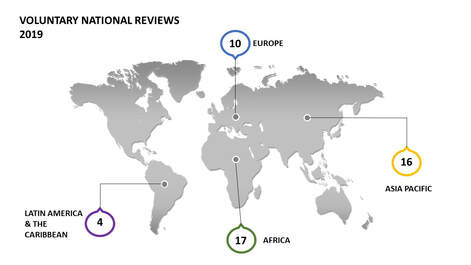
HIGH LEVEL POLITICAL FORUM TO REVIEW SDG PROGRESS;
DCs TO PARTICIPATE IN PANEL ON INEQUALITIES
BY: Margaret O’Dwyer, DC
You might wonder how the United Nations assesses countries’ progress on the 17 Sustainable Development Goals, which it approved in 2015. The primary means is through the High Level Political Forum (HLPF), which convenes each July at the UN in New York.
This year’s HLPF takes place Tuesday, July 9 through Thursday, July 18. The theme will be "Empowering people and ensuring inclusiveness and equality.” (A further HLPF Summit will take place in September in New York)
This year, 47 countries have agreed to voluntary reviews of their efforts related to the Sustainable Development Goals. 17 countries will be from Africa, 16 from Asia, 10 from Europe, and 4 from Latin America and the Caribbean. Each year, different SDGs are chosen for evaluation. This year, the goals to be reviewed include:
Nongovernmental Organizations (NGOs) will engage by sponsoring panels of speakers on topics related to the six goals to be reviewed. The Daughters of Charity NGO representatives belong to the Grass Roots Task Force, a subcommittee of the NGO Committee for Social Development. On July 16, The Task Force will present results of a global survey on inequalities (addressed in SDG 10). Sr. Margaret O’Dwyer will moderate the panel.
The Working Group to End Homelessness, to which Vincentian Family NGOs belong, will distribute a flyer to promote nations’ engagement in the February, 2020, Commission on Social Development (CSOCD). That event will focus on affordable housing and social protection for all to end homelessness.
Image from Sustainable Development Knowledge Platform
DCs TO PARTICIPATE IN PANEL ON INEQUALITIES
BY: Margaret O’Dwyer, DC
You might wonder how the United Nations assesses countries’ progress on the 17 Sustainable Development Goals, which it approved in 2015. The primary means is through the High Level Political Forum (HLPF), which convenes each July at the UN in New York.
This year’s HLPF takes place Tuesday, July 9 through Thursday, July 18. The theme will be "Empowering people and ensuring inclusiveness and equality.” (A further HLPF Summit will take place in September in New York)
This year, 47 countries have agreed to voluntary reviews of their efforts related to the Sustainable Development Goals. 17 countries will be from Africa, 16 from Asia, 10 from Europe, and 4 from Latin America and the Caribbean. Each year, different SDGs are chosen for evaluation. This year, the goals to be reviewed include:
- Goal 4. Ensure inclusive and equitable quality education and promote lifelong learning opportunities for all
- Goal 8. Promote sustained, inclusive and sustainable economic growth, full and productive employment and decent work for all
- Goal 10. Reduce inequality within and among countries
- Goal 13. Take urgent action to combat climate change and its impacts
- Goal 16. Promote peaceful and inclusive societies for sustainable development, provide access to justice for all and build effective, accountable and inclusive institutions at all levels
- Goal 17. Strengthen the means of implementation and revitalize the global partnership for sustainable development
Nongovernmental Organizations (NGOs) will engage by sponsoring panels of speakers on topics related to the six goals to be reviewed. The Daughters of Charity NGO representatives belong to the Grass Roots Task Force, a subcommittee of the NGO Committee for Social Development. On July 16, The Task Force will present results of a global survey on inequalities (addressed in SDG 10). Sr. Margaret O’Dwyer will moderate the panel.
The Working Group to End Homelessness, to which Vincentian Family NGOs belong, will distribute a flyer to promote nations’ engagement in the February, 2020, Commission on Social Development (CSOCD). That event will focus on affordable housing and social protection for all to end homelessness.
Image from Sustainable Development Knowledge Platform
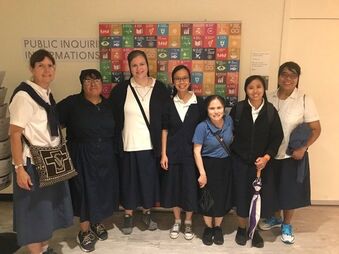
Seminary Sisters Visit United Nations
By Sr. Margaret O'Dwyer, DC
Recently, the Daughters of Charity Seminary sisters from the Province of St. Louise visited New York. In addition to taking part in heritage discussions with Sr. Louise Sullivan in Bayside, the Seminarians toured the United Nations in Manhattan. The tour was followed by a discussion with several religious NGO representatives to the United Nations at the office of the Representative of the Congregation of the Mission to the UN (Fr. Guillermo Campuzano). The sisters learned about how Vincentian Family NGO representatives to the UN (and others) work to influence policies and programs which affect persons in poverty. Vincentian Family NGO representatives currently are collaborating to address the issue of homelessness.
The Seminary sisters have made efforts to learn, pray, and taken action regarding the Sustainable Development Goals. They've taken great steps to live sustainably through minimizing waste, avoiding single-use plastic, carrying their own metal water bottles, and much more.
By Sr. Margaret O'Dwyer, DC
Recently, the Daughters of Charity Seminary sisters from the Province of St. Louise visited New York. In addition to taking part in heritage discussions with Sr. Louise Sullivan in Bayside, the Seminarians toured the United Nations in Manhattan. The tour was followed by a discussion with several religious NGO representatives to the United Nations at the office of the Representative of the Congregation of the Mission to the UN (Fr. Guillermo Campuzano). The sisters learned about how Vincentian Family NGO representatives to the UN (and others) work to influence policies and programs which affect persons in poverty. Vincentian Family NGO representatives currently are collaborating to address the issue of homelessness.
The Seminary sisters have made efforts to learn, pray, and taken action regarding the Sustainable Development Goals. They've taken great steps to live sustainably through minimizing waste, avoiding single-use plastic, carrying their own metal water bottles, and much more.

UN WORKSHOP ADDRESSES MUSIC AND DISADVANTAGED DEMOGRAPHICS
By: Michelle Fitzpatrick
Informative and engaging workshop yesterday at the UN in New York related to music and disadvantaged demographics. Keynote speakers included H.E. Mr. Marco Suazo, Director of UNITAR, New York, and Mr. Predrag Vasic, Director of the UN Symphony Orchestra. Various topics were open for discussion, such as music and special education and music in disadvantaged communities. There was also great discussion on topics such as music as an effective tool in carrying out the Mission of the United Nations and the importance of art education in our generation and beyond. (Image from First UMC of West Lafayette)
By: Michelle Fitzpatrick
Informative and engaging workshop yesterday at the UN in New York related to music and disadvantaged demographics. Keynote speakers included H.E. Mr. Marco Suazo, Director of UNITAR, New York, and Mr. Predrag Vasic, Director of the UN Symphony Orchestra. Various topics were open for discussion, such as music and special education and music in disadvantaged communities. There was also great discussion on topics such as music as an effective tool in carrying out the Mission of the United Nations and the importance of art education in our generation and beyond. (Image from First UMC of West Lafayette)
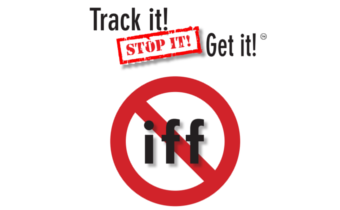 Photo from UN Economic Commission for Africa
Photo from UN Economic Commission for Africa
SHARING AN ARTICLE ON ILLICIT FINANCIAL FLOWS (IFFS) WRITTEN BY AND WITH THE PERMISSION OF POOJA RANGAPRASAD, DIRECTOR, POLICY AND ADVOCACY, CIVIL SOCIETY FINANCING FOR DEVELOPMENT (FfD) GROUP
UN High Level Meeting on Illicit Financial Flows
The President of the General Assembly (PGA) convened a High Level Meeting on “International Cooperation to Combat Illicit Financial Flows and Strengthen Good Practices on Asset Return” on 16 May 2019 at the UN Headquarters, New York. An official summary of the meeting will be published by the President of the General Assembly. The video of the full meeting can be viewed at these links: Part 1 and Part 2.
Though tackling illicit financial flows is a commitment in the SDGs and FfD, progress on empowering the UN to actually address the issue remains a political challenge. Developed countries continue to block giving United Nations the mandate to address tax avoidance by corporations and by extension argue that efforts to curb illicit financial flows should be focused on corruption and crime. G77 and China reiterated their call for a UN intergovernmental tax body. Africa Group echoed this support and also called for the need for a Convention on Tax to then be negotiated by this intergovernmental tax body noting that the UN Convention Against Corruption (UNCAC) is not sufficient to address IFFs.
Here are some highlights from the statements by governments:
G77 and China: “The Group also avails itself of this opportunity to reiterate the need to strengthen international cooperation on tax matters. We recognize with concern that there is still no single global inclusive forum for tax cooperation at the intergovernmental level. To fill the need for a more broad-based cooperation on international tax policy and combat associated illicit financial flows, the Group reiterates its call for the upgrading of the existing Committee of Experts in Tax Matters to an intergovernmental body, with experts representing their respective governments.”
Africa Group made a particularly strong statement on the issue.
“The Group notes, with serious concern, ongoing efforts to exclude the component relating to tax evasion and avoidance by multinational companies.. We also note the attempt to reduce the definition of illicit financial flows to corrupt practices and criminal activities and the corresponding insistence that affected countries should deal with the scourge only at the national level. We reiterate that illicit financial flow is also an international problem and must be dealt with accordingly. We call on countries that are the main destination of illicit financial flows to create mechanisms to prevent illicit funds from entering their countries and freeze, seize and return all assets stolen in their territories to the countries of origin”
“the Group consider that UNCAC is not fit for purpose to adequately address all aspects of illicit financial flows, as it does not sufficiently cover illicit flows emanating from tax avoidance, trade mis-invoicing, profit shifting and other illegal commercial activities, especially those by multinational enterprises. We therefore call for a separate International Convention on Tax. We believe that such a convention will serve as the backbone for our envisaged upgraded International Tax Committee and will assist in tackling all aspects of illicit financial flows”
European Union (EU): “Illicit financial flows damage the integrity, stability and reputation of the financial sector, undermine internal and international markets and facilitate the infiltration of organised criminal groups in the legal economy, threatening both our security and our prosperity. It is crucial that we all work together to improve transparency of beneficial ownership, avoiding criminals hiding behind opaque structures”
Norway: “The problem of illicit financial flows is a global concern. It is an issue that requires international cooperation for any real progress, and it is an issue that is prone to a host of collective action problems. Precisely the type problem that belongs in these chambers.”
“We are eager to see much more consistent high-level debates and engagement on the issue in an UN-setting. We must pull the load together. There are many champions among us, so let us use this momentum to make the UN the arena where these high-level debates about this high-impact problem takes place.”
Conclusion
The Inter-Agency Task Force on Financing for Development notes that while there is no agreed definition on IFFs, there are three components of IFFs: corruption-related, transnational crime related and tax related IFFs. The architecture in the UN to tackle these three components is clearly incomplete: While there is a UN Convention against Corruption (UNCAC), and UN Convention against Transnational Organized Crime, developed countries continue to block giving UN the mandate to address tax related IFFs. In short, the discussion in the UN is not about the technicalities of the definition and whether IFFs includes tax avoidance by MNCs. The challenge is a political question on whether UN is given the mandate to address tax related IFFs. This is despite the history of the League of Nations (predecessor to the UN) starting work on these issues as far back as 1921 looking at allocation of the right to tax transnational income between countries.
The Civil Society FfD Group continues to argue that addressing tax avoidance is central to curtailing IFFs. Especially since corporations helped build the secrecy system which is the foundation of IFFs precisely to avoid taxes and financial regulation. It is therefore crucial for the UN to be mandated to establish a universal intergovernmental tax commission and negotiate a convention on tax to ensure IFFs are addressed comprehensively.
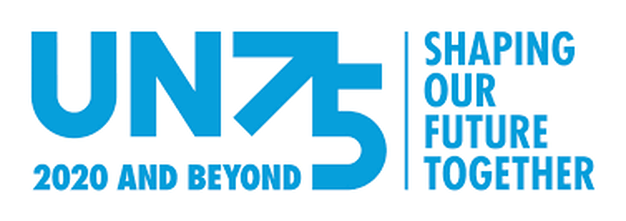
NIGERIAN AMBASSADOR TO LEAD UN GENERAL ASSEMBLY
BY MARGARET O'DWYER, DC
The next leader of the United Nations General Assembly (GA) is from Nigeria. His Excellency Tijjani Muhammad-Bande, Permanent Representative of Nigeria to the United Nations, was appointed General Assembly President during a June 4 meeting in New York. He will succeed current President, Her Excellency Maria Fernanda Espinosa, of Ecuador.
The new GA President begins his term in September, a time when world leaders come together in New York for the 74th UN General Assembly.
A new president is appointed each year to preside over the General Assembly, which includes 193 member states. The GA addresses a variety of global issues mentioned in the UN Charter. In addition to the September meeting, the GA also holds special or emergency sessions. The Nigerian Ambassador would preside over such meetings.
Mr. Muhammed-Bande takes over leadership at a time of multiple important activities. In September, meetings will be held related to climate change, financing for development, universal health coverage, Small Island Developing States, and the High Level Political Forum.
Speaking after his election, the new GA President articulated some of his priories. Reforming the UN Security Council to make it more democratic is one of them. Peace and conflict resolution is another. Peace and prosperity for the most vulnerable will be a further focus. He also mentioned security, poverty eradication, climate action, quality education, inclusion, and zero hunger. In addition, he will encourage partnerships to address these issues. Other important considerations will include women and youth, gender parity within the UN system, and human rights.
The Nigerian Ambassador was instrumental in promoting a UN resolution proclaiming January 24 as International Day of Education. During his tenure as GA President, the UN will celebrate its 75th anniversary.
(UN Photo)
BY MARGARET O'DWYER, DC
The next leader of the United Nations General Assembly (GA) is from Nigeria. His Excellency Tijjani Muhammad-Bande, Permanent Representative of Nigeria to the United Nations, was appointed General Assembly President during a June 4 meeting in New York. He will succeed current President, Her Excellency Maria Fernanda Espinosa, of Ecuador.
The new GA President begins his term in September, a time when world leaders come together in New York for the 74th UN General Assembly.
A new president is appointed each year to preside over the General Assembly, which includes 193 member states. The GA addresses a variety of global issues mentioned in the UN Charter. In addition to the September meeting, the GA also holds special or emergency sessions. The Nigerian Ambassador would preside over such meetings.
Mr. Muhammed-Bande takes over leadership at a time of multiple important activities. In September, meetings will be held related to climate change, financing for development, universal health coverage, Small Island Developing States, and the High Level Political Forum.
Speaking after his election, the new GA President articulated some of his priories. Reforming the UN Security Council to make it more democratic is one of them. Peace and conflict resolution is another. Peace and prosperity for the most vulnerable will be a further focus. He also mentioned security, poverty eradication, climate action, quality education, inclusion, and zero hunger. In addition, he will encourage partnerships to address these issues. Other important considerations will include women and youth, gender parity within the UN system, and human rights.
The Nigerian Ambassador was instrumental in promoting a UN resolution proclaiming January 24 as International Day of Education. During his tenure as GA President, the UN will celebrate its 75th anniversary.
(UN Photo)
SURVIVORS CALL FOR A NUCLEAR FREE WORLD
May 8, 2019, By: Sr. Margaret O’Dwyer
May 8, 2019, By: Sr. Margaret O’Dwyer
Photo credit: UN
It has been over 73 years since nuclear bombs devastated Hiroshima and Nagasaki on August 6 and August 9, 1945. Survivors and others are determined that such horrendous devastation never occur again. This week, during a session at the United Nations in New York, an appeal bearing over 9 million signatures was presented to the head of a committee preparing for a review conference related to nuclear weapons. The appeal calls for a prohibition of nuclear weapons.
The appeal is on behalf of the “Hibakusha,” which translates as, “explosion affected people,” or survivors of the bombings of Hiroshima and Nagasaki.
“So that the people from future generations will not have to experience hell on earth, we want to realize a world free of nuclear weapons while we are still alive,” the appeal states.
The review conference is scheduled to take place in 2020, which marks the 50th anniversary of the Treaty on the Non-Proliferation of Nuclear Weapons (NPT). The appeal was provided on May 1 to Syed Mohamad Hasrin Aidid, Malaysian Ambassador to the United Arab Emirates, who is leader of the Preparatory Committee for the 2020 Review Conference, and Izumi Nakamitsu, the UN’s High Representative for Disarmament Affairs. It included a total of 9,415,025 signatures.
As of last June, there were 190 signatories to the Treaty. India, Pakistan, South Sudan, and Israel are not signatories. According to the International Campaign to End Nuclear Weapons, nine countries possess a total of about 15,000 nuclear weapons. They include United States (6450 warheads), Russia (6,850), the United Kingdom (215), France (300), China (280), Israel (80), India (130-140), Pakistan (140-150), North Korea (10-20). North Korea has withdrawn from the Treaty.
The appeal is on behalf of the “Hibakusha,” which translates as, “explosion affected people,” or survivors of the bombings of Hiroshima and Nagasaki.
“So that the people from future generations will not have to experience hell on earth, we want to realize a world free of nuclear weapons while we are still alive,” the appeal states.
The review conference is scheduled to take place in 2020, which marks the 50th anniversary of the Treaty on the Non-Proliferation of Nuclear Weapons (NPT). The appeal was provided on May 1 to Syed Mohamad Hasrin Aidid, Malaysian Ambassador to the United Arab Emirates, who is leader of the Preparatory Committee for the 2020 Review Conference, and Izumi Nakamitsu, the UN’s High Representative for Disarmament Affairs. It included a total of 9,415,025 signatures.
As of last June, there were 190 signatories to the Treaty. India, Pakistan, South Sudan, and Israel are not signatories. According to the International Campaign to End Nuclear Weapons, nine countries possess a total of about 15,000 nuclear weapons. They include United States (6450 warheads), Russia (6,850), the United Kingdom (215), France (300), China (280), Israel (80), India (130-140), Pakistan (140-150), North Korea (10-20). North Korea has withdrawn from the Treaty.
PERMANENT FORUM ON INDIGENOUS ISSUES
April 25th, 2019 by Catherine Prendergast, DC
April 25th, 2019 by Catherine Prendergast, DC
The United Nations Permanent Forum on Indigenous Issues takes place April 22nd to May 3rd 2019. Stay connected with the latest updates by visiting the UNPFII Official Page.
Photo credits: United Nations Permanent Forum on Indigenous Issues
ECOSOC Forum on Financing for Development
April 25th, 2019 by Catherine Prendergast, DC
April 25th, 2019 by Catherine Prendergast, DC
The ECOSOC Forum on Financing for Development took place on April 15th to 18th, 2019. For updates, visit this link.
Photo credits: ECOSOC Forum on Financing for Development
PERMANENT FORUM ON INDIGENOUS ISSUES FOCUSES ON TRADITIONAL KNOWLEDGE
April 22nd, 2019 by by Margret O'Dwyer, DC
April 22nd, 2019 by by Margret O'Dwyer, DC
Traditional knowledge is the theme of the Permanent Forum on Indigenous Issues taking place April 22-May 3 at the United Nations in New York. The Daughters of Charity contributed towards the participation of persons from Amazonia to the Forum so that they can bring their lived experiences to the UN and have their concerns about serious issues heard. Pictured is the Amazonian group with Fr. Guillermo Campuzano, CM.
INTERNS MEET DIPLOMAT
April 10th, 2019 by Catherine Prendergast, DC
April 10th, 2019 by Catherine Prendergast, DC
The Company of the Daughters of Charity welcomed Seraiah Romero and Maura Avington to be interns at the United Nations. Since fall 2018, they have been actively involved in attending conferences, interacting with various working groups and learning more about the role of the UN in world affairs.
This spring, they had the opportunity to meet with the Ambassador of Trinidad and Tobago, H.E. Pennelope Beckles. It was a unique and enriching experience for both Seraiah and Maura to be able to chat about their interests in women and girls rights with Ambassador Beckles, who currently serves as the President and Chair of UN Women.
This spring, they had the opportunity to meet with the Ambassador of Trinidad and Tobago, H.E. Pennelope Beckles. It was a unique and enriching experience for both Seraiah and Maura to be able to chat about their interests in women and girls rights with Ambassador Beckles, who currently serves as the President and Chair of UN Women.
This is how Seraiah and Maura described their experience:
“Meeting with the Ambassador was truly an inspiration to me! I am always really encouraged by women who take up leading roles, to represent not only their values, but that of their country. As a citizen of Trinidad and Tobago, I felt very proud to be in the Mission office, and to experience public diplomacy at its finest. H.E. Pennelope Beckles displayed warmth, charisma, knowledge and excellence. She definitely represented the values of Trinidad and Tobago, and by extension the Caribbean.
What did I learn? I learnt that being a woman in politics/ diplomacy is not an easy job. Only 5% of the world’s leaders are women. It may take 5:00am mornings, and great courage to show everyone around you that as a woman, you can and you will. It takes a tight schedule, and being a strong connector of people. It takes ambition and a supportive team around you. Most importantly, I learnt that is it not impossible to be a woman in the field of politics/ diplomacy. We have great mentors to look up to, ad that alone serves as motivation for us to keep going.” –Seraiah Romero
“Meeting with Ambassador Beckles was such a valuable experience for myself and fellow intern Seraiah. Since Seraiah is from Trinidad and Tobago, it was really special to see her connect with such a prominent leader of her country. Ambassador Beckles had a lot of important advice for us as we start our careers and shared with us her political idols and guidance for our futures. I loved getting the chance to speak with her, and she was so warm and kind despite having an extremely busy schedule. This is definitely something I’ll treasure moving forward in my career!”- Maura Avington
We are thankful to the Ambassador, H.E. Pennelope Beckles and the Permanent Mission of the Republic of Trinidad and Tobago at the UN for this opportunity. We definitely continue to support women and girls everywhere.
Photo credits: H.E. Pennelope Beckles, the Permanent Mission of the Republic of Trinidad and Tobago, Seraiah Romero and Maura Avington
“Meeting with the Ambassador was truly an inspiration to me! I am always really encouraged by women who take up leading roles, to represent not only their values, but that of their country. As a citizen of Trinidad and Tobago, I felt very proud to be in the Mission office, and to experience public diplomacy at its finest. H.E. Pennelope Beckles displayed warmth, charisma, knowledge and excellence. She definitely represented the values of Trinidad and Tobago, and by extension the Caribbean.
What did I learn? I learnt that being a woman in politics/ diplomacy is not an easy job. Only 5% of the world’s leaders are women. It may take 5:00am mornings, and great courage to show everyone around you that as a woman, you can and you will. It takes a tight schedule, and being a strong connector of people. It takes ambition and a supportive team around you. Most importantly, I learnt that is it not impossible to be a woman in the field of politics/ diplomacy. We have great mentors to look up to, ad that alone serves as motivation for us to keep going.” –Seraiah Romero
“Meeting with Ambassador Beckles was such a valuable experience for myself and fellow intern Seraiah. Since Seraiah is from Trinidad and Tobago, it was really special to see her connect with such a prominent leader of her country. Ambassador Beckles had a lot of important advice for us as we start our careers and shared with us her political idols and guidance for our futures. I loved getting the chance to speak with her, and she was so warm and kind despite having an extremely busy schedule. This is definitely something I’ll treasure moving forward in my career!”- Maura Avington
We are thankful to the Ambassador, H.E. Pennelope Beckles and the Permanent Mission of the Republic of Trinidad and Tobago at the UN for this opportunity. We definitely continue to support women and girls everywhere.
Photo credits: H.E. Pennelope Beckles, the Permanent Mission of the Republic of Trinidad and Tobago, Seraiah Romero and Maura Avington
SISTER BIBIANA EMENAHA D.C. AND THE COMMITTEE FOR THE SUPPORT OF THE DIGNITY OF WOMEN IN NIGERIA
March 27th, 2019 by Margret O'Dwyer, DC
March 27th, 2019 by Margret O'Dwyer, DC
Sister Bibiana Emenaha, D.C., coordinates the Committee for the Support of the Dignity of Women in Nigeria. The Committee, formed by the Nigeria Conference of Women Religious, addresses human trafficking issues and forced prostitution. You can read about the Committee's work by going to this link to a March 22 article appearing in America Magazine and written by Linus Unah. https://www.americamagazine.org/politics-society/2019/03/22/nigerian-sisters-take-fight-against-human-trafficking
Credits: America Magazine
CSW 63 HUMBLING AND INSPIRING
March 20th, 2019 by Margret O'Dwyer, DC
March 20th, 2019 by Margret O'Dwyer, DC
It is both humbling and inspiring to attend the 63rd Commission on the Status of Women, currently taking place at the UN in New York. On the one hand, it makes one grateful for many blessings and opportunities, but also more aware of the challenging and often horrendous experiences of women and girls in other parts of the world.
The Commission, now in its second week, has been a series of events which highlight women’s issues, convey lived realities, celebrate strides in the realm of women’s rights and services, and issue challenges for improvement. While women participate in about 700 events, behind the scenes, member states are crafting a resolution addressing women’s issues. That resolution is expected to be completed at the end of the week.
In an event on climate change on Monday, Sr. Doris Clippard and I heard a participant from Kenya speak of women and girls walking for an hour to fetch water and repeating the experience later in the day. In another CSW event, we heard of a female Brazilian politician who was murdered. We witnessed a speaker on human rights weep at the massacre of women, men, and children in her native country, New Zealand.
Most of us are grateful for education, but Commission speakers note that 131 million girls are not in school. Women are harassed in the work place and for their faith. Some women have acid thrown on their face in the event of broken relationships. Young girls are married off so that their families might receive finances. They also experience female genital mutilation. We heard, too, about the need for women’s access to justice and for them to have a place at the table during peace negotiations.
CSW stories stretch the heart. At an event last week, it was sadly noted how women and girls are treated as “booty of war” by extremist groups, bought and sold as a source of finance. There are open slave markets in Syria and online sales sites which sell women and girls for cigarettes and cash. See remarks by Special Rapporteur of the Secretary General on Sexual Violence in Conflict, at this link: https://reliefweb.int/report/world/srsg-svc-pramila-patten-remarks-csw63-side-event-modern-slavery-and-human-trafficking
On a heartening note, Sr. Catherine Prendergast, Sr. Doris Clippard, and I were able to participate in an event on storytelling, where women and men shared positive efforts. I had the good fortune of meeting a woman who experienced racism and now empowers young people to take action against it. We also listened to representatives from Uganda and Ireland speak of gender budgeting, through which governments analyze a budget’s impacts on men and women and allocate money accordingly.
In the financial sector, efforts are being taken to end modern slavery through anti-trafficking compliance and responsible investment. Madam Margaret Kenyatta, the First Lady of Kenya, organized marathons to raise funds for the Beyond Zero Program, designed to end maternal and infant mortality in her country. It was also heartening to hear women leaders from various countries speak of their journeys and experiences during a Women in Power session. And we heard how women’s involvement in peace negotiations can lead to longer-lasting peace.
Let’s hope the CSW resolution achieved later this week doesn’t simply remain on paper in a file, but is actualized and truly improves the lives of women globally. And that combined efforts by women and men internationally can improve the lives of women and girls everywhere.
The Commission, now in its second week, has been a series of events which highlight women’s issues, convey lived realities, celebrate strides in the realm of women’s rights and services, and issue challenges for improvement. While women participate in about 700 events, behind the scenes, member states are crafting a resolution addressing women’s issues. That resolution is expected to be completed at the end of the week.
In an event on climate change on Monday, Sr. Doris Clippard and I heard a participant from Kenya speak of women and girls walking for an hour to fetch water and repeating the experience later in the day. In another CSW event, we heard of a female Brazilian politician who was murdered. We witnessed a speaker on human rights weep at the massacre of women, men, and children in her native country, New Zealand.
Most of us are grateful for education, but Commission speakers note that 131 million girls are not in school. Women are harassed in the work place and for their faith. Some women have acid thrown on their face in the event of broken relationships. Young girls are married off so that their families might receive finances. They also experience female genital mutilation. We heard, too, about the need for women’s access to justice and for them to have a place at the table during peace negotiations.
CSW stories stretch the heart. At an event last week, it was sadly noted how women and girls are treated as “booty of war” by extremist groups, bought and sold as a source of finance. There are open slave markets in Syria and online sales sites which sell women and girls for cigarettes and cash. See remarks by Special Rapporteur of the Secretary General on Sexual Violence in Conflict, at this link: https://reliefweb.int/report/world/srsg-svc-pramila-patten-remarks-csw63-side-event-modern-slavery-and-human-trafficking
On a heartening note, Sr. Catherine Prendergast, Sr. Doris Clippard, and I were able to participate in an event on storytelling, where women and men shared positive efforts. I had the good fortune of meeting a woman who experienced racism and now empowers young people to take action against it. We also listened to representatives from Uganda and Ireland speak of gender budgeting, through which governments analyze a budget’s impacts on men and women and allocate money accordingly.
In the financial sector, efforts are being taken to end modern slavery through anti-trafficking compliance and responsible investment. Madam Margaret Kenyatta, the First Lady of Kenya, organized marathons to raise funds for the Beyond Zero Program, designed to end maternal and infant mortality in her country. It was also heartening to hear women leaders from various countries speak of their journeys and experiences during a Women in Power session. And we heard how women’s involvement in peace negotiations can lead to longer-lasting peace.
Let’s hope the CSW resolution achieved later this week doesn’t simply remain on paper in a file, but is actualized and truly improves the lives of women globally. And that combined efforts by women and men internationally can improve the lives of women and girls everywhere.
Photo: (1) Sr. Doris Clippard and Sr. Catherine Prendergast at a CSW event on access to justice for women (2) Sr. Catherine Prendergast with Ambassador Geraldine Byrne Nason and Minister David Stanton, the Irish Minister of State at the Department of Justice and Equality with special responsibility for Equality, Immigration and Integration.
NEW UN REPORT URGES IMMEDIATE ENVIRONMENTAL ACTION
March 19th, 2019 by Margret O'Dwyer, DC, with information from UN Environment Programme
March 19th, 2019 by Margret O'Dwyer, DC, with information from UN Environment Programme
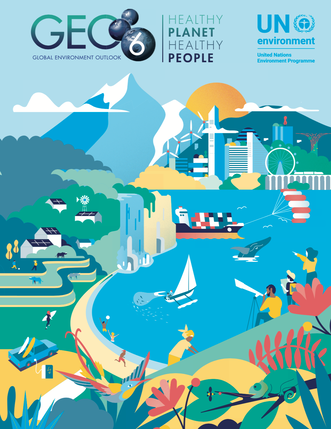
The “take, make, and waste” linear economy must shift to a more circular model, which focuses on zero waste, if the world is to avert dire damage to the planet and health crises, according to a state of the environment report issued last week by the United Nations Environment Programme. The report was released as 5,000 people gathered in Nairobi for the Fourth United Nations Environmental Assembly. 26 resolutions resulted from the Assembly.
The sixth Global Environmental Outlook (2019) outlines the environment’s current state, highlights possible future trends, and analyzes the effectiveness of policies. It also makes recommendations for improving the environment and making it more sustainable.
To access the report, view a summary for policy makers, and more, go to this link: https://www.unenvironment.org/resources/global-environment-outlook-6 To access an infographic about linear versus circular economies, go to this link: https://p.widencdn.net/llcznp/EN_CircularEconomy
The report basically triggers the alarm that NOW is the time to act. Unsustainable production and consumption patterns and trends, and inequality, combined with seemingly insatiable resource use are deteriorating planetary health at unprecedented rates, with increasingly serious consequences for poor regions and persons living in poverty, it indicates. The report also reveals that the world is not on track to achieve environment-related Sustainable Development Goals by 2030.
Earth is assaulted by marine pollution, air pollution (which is the cause of 6 to 7 million premature deaths annually), land degradation, biodiversity loss, over-exploitation of land, various forms of pollution, invasive species, illegal wildlife trade, and climate change among other factors.
Recommendations for turning things around include eating less meat and reducing food waste (33 per cent of global edible food is wasted). Other ideas for environmental preservation include improved governance, land-use planning, green infrastructure, and significantly reducing the 8 million tons of plastic which wend their way into oceans annually. The report also calls for harnessing technology and using a systemic policy approach.
Failing to take action could lead to millions of premature deaths by 2050 in cities or regions of Asia, Africa, and the Middle East. In addition, pollutants in waterways could cause anti-microbial resistance to become a major cause of death, endocrine disruption could impact fertility, and child neurodevelopment could be affected.
“The science is clear. The health and prosperity of humanity is directly tied with the state of our environment,” said Joyce Msuya, Acting Executive Director of UN Environment. “This report is an outlook for humanity. We are at a crossroads. Do we continue on our current path, which will lead to a bleak future for humankind, or do we pivot to a more sustainable development pathway? That is the choice our political leaders must make, now.”
SECRETARY GENERAL CALLS FOR “PUSHBACK AGAINST THE PUSHBACK”
March 13th, 2019 by Margret O'Dwyer, DC
March 13th, 2019 by Margret O'Dwyer, DC
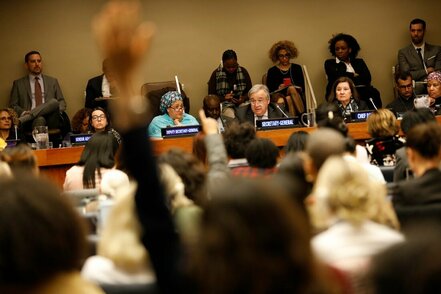
“Pushback against the pushback,” UN Secretary General Antonio Guterres advised hundreds and hundreds of women at UN headquarters this week, as the Commission on the Status of Women met in its 63rd session. Guterres said there is a “deep, pervasive, and relentless” pushback on women’s rights globally. He noted violence against women, including those running for political office and defending human rights.
Although progress has occurred in some areas of women’s rights, repeatedly during the week we heard distressing statistics, such as 131 million girls not attending school, that only 7 percent of heads of state are women, and one in three women have experienced physical or sexual violence.
If current trends continue, gender parity will not be achieved for 107 years, said UN General Assembly President Maria Fernanda Espinosa Garces. In 2015, it would have taken 30 years. Phumzile Mlambo-Ngcuka, head of UN Women, noted that only ten countries have gender-equal cabinets and that 5 per cent of corporate CEOs are women. She said we must be change makers wherever we are ad must open paths for other women.
Over 700 events are taking place during the Commission. They cover topics such as trafficking in women and girls, financial issues, leadership, policy research, social protection for refugees, inclusive education, health care, justice, gender-based violence, and much more.
Tuesday provided an opportunity for NGOs to ask questions of the Secretary General and a panel of UN leaders. Among concerns expressed were those of widows of disappeared husbands, a mother whose child was stolen for adoption, human rights violations in various countries, an appeal by a survivor of human trafficking for continued efforts to stop the crime, lack of medical attention to a political prisoner, and a request for stronger measures to address drug addiction.
Photo: (1) Antonio Guterres, UN Secretary General
(2) Phumzile Mlambo-Ngcuka, Head of UN Women
Photo Credits: Antonio Guterres and Prokaraia.com
(2) Phumzile Mlambo-Ngcuka, Head of UN Women
Photo Credits: Antonio Guterres and Prokaraia.com
UN WOMEN’S DAY—A CALL FOR INNOVATION
March 13th, 2019 by Margret O'Dwyer, DC
March 13th, 2019 by Margret O'Dwyer, DC
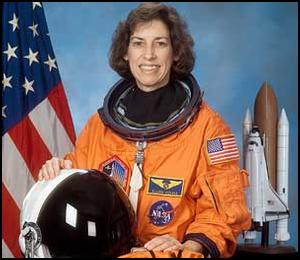
Encourage STEM (science, technology, engineering, and mathematics), serve as role models, change the narrative, be persevering, tell your story, become leaders, and be innovative were key messages delivered during an International Woman’s Day event held March 8, at UN headquarters in New York. The high-energy celebration was a prelude to the 63rd Commission on the Status of Women, which began Monday, and which is focusing upon social protection, access to public services, and sustainable infrastructure for gender equality and the empowerment of women and girls.
Throughout the world, women gathered to celebrate. In the Democratic Republic, for example, staff at the center where Sr. Mary Felice, MD, serves, sent to Kinshasa for cloth to make special clothing for the day. They wore scarves provided by Sr. Marian Hamwey.
Through music, videos, and speakers, the International Women’s Day happening at the UN emphasized the theme, “Think Equal, Build Smart, and innovate for Change.” Drew Olivia
Tillman had the audience clapping and singing “You’re going to hear me roar!” Other musical interventions were offered by opera and Broadway singers. But the real stars were women who had the courage to take risks, persevere, and break down barriers while pursuing their dreams.
FORMER ASTRONAUT PROVIDES KEYNOTE
Keynote speaker, Ellen Ochoa, was the first Hispanic woman to reach space. She is an engineer, former astronaut, and former Director of the Johnson Space Center. She also is a woman of perseverance. When turned down for the space program, she set about learning more, working harder, and becoming a research engineer at NASA. These efforts paid off when she was selected for the program on her second try.
Women and girls have a role to play in the fourth industrial revolution and education is key, she emphasized. She called for encouraging girls to pursue STEM education, particularly when they reach middle school and start hearing that math and science can be hard.
“Engineering, development and innovation is about curiosity, creativity, working with teams and solving problems,” she explained, saying “Girls love to do those things!”
Photo Credits: NASA
GOOGLE SCIENCE FAIR WINNER OFFERS ADVICE
Kiara Nirghin, of South Africa, is an example of youthful ingenuity. She is the 2016 winner of the Google Science Fair grand prize. Using orange peels and avocados, she developed a low cost, biodegradable means of increasing soil’s ability to retain moisture, which makes a difference in parts of Africa which experience drought.
“I told my mom and dad at a young age that I wanted to change the world,” said Kiara. “They said, ‘That’s great! Let’s do it!’”
Kiara’s shared that inspiration does not present itself in one “big bang” moment. “It comes from a long time of failure, and not achieving what you want, and reexamining the drawing board, and finding something better,” she said.
Other inspiring women recognized included Lois Auta, who ran for public office in Nigeria in 2018 and is an advocate for inclusive legislation. Alice Marie Johnson, speaks out on criminal justice reform in the US. Lydia Cacho, of Mexico, is a human rights activist who addresses violence and sexual abuse against women and children. Theresa Kachindamoto, of Malawi, works against childhood marriage and female genital mutilation. And Asha Kowtal advocates for Dalit rights in India.
Throughout the world, women gathered to celebrate. In the Democratic Republic, for example, staff at the center where Sr. Mary Felice, MD, serves, sent to Kinshasa for cloth to make special clothing for the day. They wore scarves provided by Sr. Marian Hamwey.
Through music, videos, and speakers, the International Women’s Day happening at the UN emphasized the theme, “Think Equal, Build Smart, and innovate for Change.” Drew Olivia
Tillman had the audience clapping and singing “You’re going to hear me roar!” Other musical interventions were offered by opera and Broadway singers. But the real stars were women who had the courage to take risks, persevere, and break down barriers while pursuing their dreams.
FORMER ASTRONAUT PROVIDES KEYNOTE
Keynote speaker, Ellen Ochoa, was the first Hispanic woman to reach space. She is an engineer, former astronaut, and former Director of the Johnson Space Center. She also is a woman of perseverance. When turned down for the space program, she set about learning more, working harder, and becoming a research engineer at NASA. These efforts paid off when she was selected for the program on her second try.
Women and girls have a role to play in the fourth industrial revolution and education is key, she emphasized. She called for encouraging girls to pursue STEM education, particularly when they reach middle school and start hearing that math and science can be hard.
“Engineering, development and innovation is about curiosity, creativity, working with teams and solving problems,” she explained, saying “Girls love to do those things!”
Photo Credits: NASA
GOOGLE SCIENCE FAIR WINNER OFFERS ADVICE
Kiara Nirghin, of South Africa, is an example of youthful ingenuity. She is the 2016 winner of the Google Science Fair grand prize. Using orange peels and avocados, she developed a low cost, biodegradable means of increasing soil’s ability to retain moisture, which makes a difference in parts of Africa which experience drought.
“I told my mom and dad at a young age that I wanted to change the world,” said Kiara. “They said, ‘That’s great! Let’s do it!’”
Kiara’s shared that inspiration does not present itself in one “big bang” moment. “It comes from a long time of failure, and not achieving what you want, and reexamining the drawing board, and finding something better,” she said.
Other inspiring women recognized included Lois Auta, who ran for public office in Nigeria in 2018 and is an advocate for inclusive legislation. Alice Marie Johnson, speaks out on criminal justice reform in the US. Lydia Cacho, of Mexico, is a human rights activist who addresses violence and sexual abuse against women and children. Theresa Kachindamoto, of Malawi, works against childhood marriage and female genital mutilation. And Asha Kowtal advocates for Dalit rights in India.
63rd COMMISSION ON THE STATUS OF WOMEN
February 27th, 2019 by Margret O'Dwyer, DC
February 27th, 2019 by Margret O'Dwyer, DC

Perhaps the UN Commission which engages the largest number of Civil Society members is the Commission on the Status of Women (CSW). Women from throughout the world will gather for this year’s CSW, which runs March 11-22 in New York.
This year’s main theme is: Social protection systems, access to public services and sustainable infrastructure for gender equality and the empowerment of women and girls. A secondary theme is: Women’s empowerment and the link to sustainable development.
What are social protection systems? Generally, they include subsidies for persons living in poverty or who are vulnerable, pensions, food assistance, social insurance programs, child care, health care programs, labor market efforts to help persons find jobs, and the like.
This year’s CSW co-chairs include Her Excellency Geraldine Byrne-Nason, Ambassador to the UN from Ireland, and Her Excellency Koki Muli Grignon, Ambassador/Deputy Permanent Representative to the UN from Kenya.
How will the Daughters of Charity be involved? First, they collaborated with other NGOs in submitting a statement about social protection systems for indigenous persons. That statement goes on record at the UN.
Next, Sr. Catherine Prendergast will deliver an oral statement, also about homelessness. The statement was prepared in collaboration with Mary Ann Dantuono, of the International Association of Charity (AIC). In keeping with the theme of the Vincentian Family’s 400th anniversary, the statement will relate to housing exclusion of women and the need to address street homelessness. One sister will visit from Texas to observe proceedings at the UN.
Click here for the CSW statement 2019.
This year’s main theme is: Social protection systems, access to public services and sustainable infrastructure for gender equality and the empowerment of women and girls. A secondary theme is: Women’s empowerment and the link to sustainable development.
What are social protection systems? Generally, they include subsidies for persons living in poverty or who are vulnerable, pensions, food assistance, social insurance programs, child care, health care programs, labor market efforts to help persons find jobs, and the like.
This year’s CSW co-chairs include Her Excellency Geraldine Byrne-Nason, Ambassador to the UN from Ireland, and Her Excellency Koki Muli Grignon, Ambassador/Deputy Permanent Representative to the UN from Kenya.
How will the Daughters of Charity be involved? First, they collaborated with other NGOs in submitting a statement about social protection systems for indigenous persons. That statement goes on record at the UN.
Next, Sr. Catherine Prendergast will deliver an oral statement, also about homelessness. The statement was prepared in collaboration with Mary Ann Dantuono, of the International Association of Charity (AIC). In keeping with the theme of the Vincentian Family’s 400th anniversary, the statement will relate to housing exclusion of women and the need to address street homelessness. One sister will visit from Texas to observe proceedings at the UN.
Click here for the CSW statement 2019.
CELEBRATE MARCH 8—INTERNATIONAL WOMEN’S DAY
February 27th, 2019 by Margret O'Dwyer, DC
February 27th, 2019 by Margret O'Dwyer, DC
Who are your heroines? A multi-tasking mother who raised children while maintaining a full-time job? A Nobel Peace Prize-winning young person such as Malala? A mentor who helped you channel passion and talent into a fulfilling career?
Friday, March 8, marks International Women’s Day. International Women's Day celebrates the social, economic, cultural and political achievements of women. It’s a great day to say or do something to affirm the achievements of women who inspired you. And to take action yourself!
This year’s theme is, “Balance for Better,” which indicates the world is a better place when there is gender parity.
Why do we need general balance? I point to pay gaps and girls’ education as two reasons. According to World Economic Forum on average women across the world are paid just 63% of what men earn. The gap will take 202 years to close. Some countries are making progress, but there is a long way to go.
Now, let’s look at education. According to the Global Partnership for Education (GPE), there are 132 million girls worldwide out of school. This includes 34.3 million girls of primary school age, 30 million of lower secondary school age, and 67.4 of upper secondary school age. Girls have to jump through many hoops to access the same learning opportunities as boys. Around 16 million girls between ages 6-11 never enter a school as a student.
GPE also points out that each year of secondary education reduces the chance of childhood marriage (marrying under age 18) by five percentage points and that some countries lose more than $1 billion per year by failing to education girls to the same level as boys. Educating girls prevented more than 30 million deaths of children under five years old and 100 million deaths in adults 15 to 60 years old.
On International Women’s Day, take action to close the gaps. In example, post something on social media to challenge stereotypes. Compliment a woman or girl on her achievements. Contribute towards an educational scholarship for girls. Read about the experiences of inspirational women. Observe television ads and how women are depicted; then discuss it with family or friends. Reflect on how you can transform challenges in your life into action for social good. Have a dialogue with the men and boys in your family about why gender parity is beneficial for all.
Photo credits: APB Speakers
Friday, March 8, marks International Women’s Day. International Women's Day celebrates the social, economic, cultural and political achievements of women. It’s a great day to say or do something to affirm the achievements of women who inspired you. And to take action yourself!
This year’s theme is, “Balance for Better,” which indicates the world is a better place when there is gender parity.
Why do we need general balance? I point to pay gaps and girls’ education as two reasons. According to World Economic Forum on average women across the world are paid just 63% of what men earn. The gap will take 202 years to close. Some countries are making progress, but there is a long way to go.
Now, let’s look at education. According to the Global Partnership for Education (GPE), there are 132 million girls worldwide out of school. This includes 34.3 million girls of primary school age, 30 million of lower secondary school age, and 67.4 of upper secondary school age. Girls have to jump through many hoops to access the same learning opportunities as boys. Around 16 million girls between ages 6-11 never enter a school as a student.
GPE also points out that each year of secondary education reduces the chance of childhood marriage (marrying under age 18) by five percentage points and that some countries lose more than $1 billion per year by failing to education girls to the same level as boys. Educating girls prevented more than 30 million deaths of children under five years old and 100 million deaths in adults 15 to 60 years old.
On International Women’s Day, take action to close the gaps. In example, post something on social media to challenge stereotypes. Compliment a woman or girl on her achievements. Contribute towards an educational scholarship for girls. Read about the experiences of inspirational women. Observe television ads and how women are depicted; then discuss it with family or friends. Reflect on how you can transform challenges in your life into action for social good. Have a dialogue with the men and boys in your family about why gender parity is beneficial for all.
Photo credits: APB Speakers
GLOBAL SISTERS REPORT: WORKING GROUP URGES UN TO STEP UP FIGHT AGAINST HOMELESSNESS
February 20th, 2019 by Margret O'Dwyer, DC
February 20th, 2019 by Margret O'Dwyer, DC
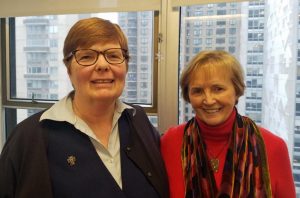
"The United Nations is no stranger to the issues of poverty, women’s rights, climate change, the nuclear arms race and other pressing challenges. But the global body has yet to tackle head-on one social problem visible on the streets of the world’s urban centers: homelessness..." Read more at: Daughters of Charity in the News: Working Group Urges UN to Step Up Fight Against Homelessness
NEW REPORT CALLS US TO PREPARE FOR FUTURE OF WORK
February 15th, 2019 By Margret O'Dwyer, DC
February 15th, 2019 By Margret O'Dwyer, DC
Recently, I overheard two young women discussing where to look for employment after university. “I think I’m going to go either with Google or Apple,” one said. That’s a far different vision than we had back in the Seventies, when choices were much more service and people oriented than digital.
A recent report by the International Labor Organization (ILO) recognizes vertical changes and exceptional challenges in the employment world. The report, released in January, is entitled, “Work for a Brighter Future.” It addresses some of the fears that many discuss around dinner tables and coffee shops—that everything is becoming commodified and profit seems to trump other concerns; that some workers may not be upskilling quickly enough to prepare for job transformations; that automation and digitalization will result in significant job losses or unfamiliar, new types of work.
The report proposes a human-centered agenda, which places people and the work they do at the center of economic and social policy and business practices. There are three pillars to the agenda:
“Our hope now is that this report will inspire further discussions on a full range of issues – including, for example, how to strengthen democratic space for social dialogue and how business models can be better aligned with a human-centred agenda,” the Co-Chairs said.
The changes occurring in our places of work impact the Vincentian Family. How can we assist those who have not kept up with job skills needed due to technological advances, artificial intelligence, and robotics? How are we readying people for a green economy which scales back on carbon and resource-intensive industries? In our programs to empower people for employment, how are we adapting to ensure persons we serve are ready for newly-created forms of work? Are we adapting our school curriculum to ensure youth are ready for a “Jetson’s” era of work? In areas of aging populations, are we adapting to pressures on the labor market and social security systems?
You can download the report, Working for a Brighter Future, at this link: https://www.ilo.org/wcmsp5/groups/public/---dgreports/---cabinet/documents/publication/wcms_662410.pdf
A recent report by the International Labor Organization (ILO) recognizes vertical changes and exceptional challenges in the employment world. The report, released in January, is entitled, “Work for a Brighter Future.” It addresses some of the fears that many discuss around dinner tables and coffee shops—that everything is becoming commodified and profit seems to trump other concerns; that some workers may not be upskilling quickly enough to prepare for job transformations; that automation and digitalization will result in significant job losses or unfamiliar, new types of work.
The report proposes a human-centered agenda, which places people and the work they do at the center of economic and social policy and business practices. There are three pillars to the agenda:
- Increasing investments in people’s capabilities
- Increasing investment in the institution of work
- Increasing investment in decent and sustainable work
“Our hope now is that this report will inspire further discussions on a full range of issues – including, for example, how to strengthen democratic space for social dialogue and how business models can be better aligned with a human-centred agenda,” the Co-Chairs said.
The changes occurring in our places of work impact the Vincentian Family. How can we assist those who have not kept up with job skills needed due to technological advances, artificial intelligence, and robotics? How are we readying people for a green economy which scales back on carbon and resource-intensive industries? In our programs to empower people for employment, how are we adapting to ensure persons we serve are ready for newly-created forms of work? Are we adapting our school curriculum to ensure youth are ready for a “Jetson’s” era of work? In areas of aging populations, are we adapting to pressures on the labor market and social security systems?
You can download the report, Working for a Brighter Future, at this link: https://www.ilo.org/wcmsp5/groups/public/---dgreports/---cabinet/documents/publication/wcms_662410.pdf
WORKING GROUP URGES UN TO STEP UP THE FIGHT AGAINST HOMELESSNESS
February 14th, 2019 By Margret O'Dwyer, DC
February 14th, 2019 By Margret O'Dwyer, DC
Read article at: https://www.globalsistersreport.org/news/ministry/working-group-urges-un-step-fight-against-homelessness-55870
SR. CATHERINE TO MODERATE HOMELESSNESS PANEL AT UN
January 31st, 2019 By Margret O'Dwyer, DC
January 31st, 2019 By Margret O'Dwyer, DC
Sr. Catherine Prendergast, DC, will moderate a panel of speakers on homeless, February 11, at UN Headquarters in New York. The panel is entitled, “Homelessness, a Prominent Sign of Social Inequalities.” It will take place during the 57th Commission on Social Development.
The event is sponsored by the Permanent Mission of Ireland to the UN, the Working Group to End Homelessness, and the Institute of Global Homelessness (IGH). It coincides with a Conference related to homelessness, sponsored by IGH, to be held the preceding weekend in New York.
Speakers will include Ambassador Geraldine Byrne-Nason, or Ireland, or her designee; Nan Roman, President of the US National Alliance to End Homelessness; Julieta Perucca, Senior Aide to the Special Rapporteur on the Right to Housing and Coordinator of The Shift Project; Karina Soto Abarca, Sub-Secretary of Social Services, Secretariat of Social Development, Government of Chile; and Iris Bailey, from Life Experience and Faith Sharing Associates (LEFSA).
Vincentian Family NGOs at the United Nations have been collaborating to raise awareness about homelessness and to encourage member states to commit to counting street homelessness and addressing homelessness so that no one is left behind
The event is sponsored by the Permanent Mission of Ireland to the UN, the Working Group to End Homelessness, and the Institute of Global Homelessness (IGH). It coincides with a Conference related to homelessness, sponsored by IGH, to be held the preceding weekend in New York.
Speakers will include Ambassador Geraldine Byrne-Nason, or Ireland, or her designee; Nan Roman, President of the US National Alliance to End Homelessness; Julieta Perucca, Senior Aide to the Special Rapporteur on the Right to Housing and Coordinator of The Shift Project; Karina Soto Abarca, Sub-Secretary of Social Services, Secretariat of Social Development, Government of Chile; and Iris Bailey, from Life Experience and Faith Sharing Associates (LEFSA).
Vincentian Family NGOs at the United Nations have been collaborating to raise awareness about homelessness and to encourage member states to commit to counting street homelessness and addressing homelessness so that no one is left behind
Photo credits: City of Olympia (Washington)
Upcoming Events:
INTERNATIONAL DAY OF EDUCATION
January 30th, 2019 By Margret O'Dwyer, DC
January 30th, 2019 By Margret O'Dwyer, DC
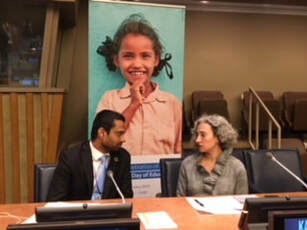
The importance of education for girls and preparing for the changing world of work were among topics discussed at the recent celebration of the first UN International Day of Education. The event was held January 24 at UN Headquarters in New York.
A resolution to name January 24 as International Education Day was promoted by the Permanent Mission of Nigeria to the UN, and supported by Ireland, Qatar, Singapore, and various educational organizations. The resolution was approved December 3. Nigerian Ambassador to the UN, His Excellency ProfessorTijani Muhammad-Bande, said that education is key to development of art, science and technology, health, agriculture, private sector growth and every facet of life.
The day began with a word from Pope Francis, who lauded the UN for promoting education, noting that it is essential to human and social development. “I hope that education will be made accessible to all and that it will be inclusive and free of ideological colonialization,” said the Pope in a video message.
Statistics reflect that 103 million young people lack basic literacy skills and that 130 million girls are out of school. That figure is equivalent to the population of France and South Africa combined. A World Bank finding indicates that if all girls were to complete secondary education, it would lift the world economy by 30 trillion dollars. Yet, 1 billion girls and women do not have the skills to engage in the current economy.
Irish Ambassador to the UN, Geraldine Byrne Nason, moderated a panel of speaker during the celebration. The 2030 Agenda, she said, depends upon education. (Sustainable Development Goal 4 is focused on education, but education interweaves with all of the Goals). She called education the most powerful tool we have to change the world. She emphasized education as a human right, access to education for girls, lifelong learning, and quality education. She further lauded the Irish Missionaries and development workers who have enhanced education in various parts of the world.
Other speakers addressed the importance of education for global citizenship, for persons with disabilities, education that humanizes, education for peace, the linkage between education and reducing unemployment, and education for persons in vulnerable situations.
A resolution to name January 24 as International Education Day was promoted by the Permanent Mission of Nigeria to the UN, and supported by Ireland, Qatar, Singapore, and various educational organizations. The resolution was approved December 3. Nigerian Ambassador to the UN, His Excellency ProfessorTijani Muhammad-Bande, said that education is key to development of art, science and technology, health, agriculture, private sector growth and every facet of life.
The day began with a word from Pope Francis, who lauded the UN for promoting education, noting that it is essential to human and social development. “I hope that education will be made accessible to all and that it will be inclusive and free of ideological colonialization,” said the Pope in a video message.
Statistics reflect that 103 million young people lack basic literacy skills and that 130 million girls are out of school. That figure is equivalent to the population of France and South Africa combined. A World Bank finding indicates that if all girls were to complete secondary education, it would lift the world economy by 30 trillion dollars. Yet, 1 billion girls and women do not have the skills to engage in the current economy.
Irish Ambassador to the UN, Geraldine Byrne Nason, moderated a panel of speaker during the celebration. The 2030 Agenda, she said, depends upon education. (Sustainable Development Goal 4 is focused on education, but education interweaves with all of the Goals). She called education the most powerful tool we have to change the world. She emphasized education as a human right, access to education for girls, lifelong learning, and quality education. She further lauded the Irish Missionaries and development workers who have enhanced education in various parts of the world.
Other speakers addressed the importance of education for global citizenship, for persons with disabilities, education that humanizes, education for peace, the linkage between education and reducing unemployment, and education for persons in vulnerable situations.
YOUNG CHAMPIONS OF THE EARTH PRIZE
January 30th, 2019 By Margret O'Dwyer, DC
January 30th, 2019 By Margret O'Dwyer, DC
Here’s a chance to take your environmental idea to the next level! If you are 18 to 30 and have a project which helps protect or improve the environment, consider applying for the Young Champions of the Earth Prize, sponsored by the UN Environment Program (UNEP). The deadline is March 31.
Projects need to be in place at least six months. Each applicant will be required to submit responses to a series of questions and upload a referee’s letter of endorsement. Seven finalists—drawn from every world region—will be short-listed by UN experts and requested to submit short videos pitching their innovative project. The winners will be expected to implement their big ideas and act as ambassadors at speaking opportunities, while providing regular progress updates in the form of videos and blogs that will be shared on UNEP’s website. The link to the contest page is: https://web.unep.org/youngchampions/apply
Projects need to be in place at least six months. Each applicant will be required to submit responses to a series of questions and upload a referee’s letter of endorsement. Seven finalists—drawn from every world region—will be short-listed by UN experts and requested to submit short videos pitching their innovative project. The winners will be expected to implement their big ideas and act as ambassadors at speaking opportunities, while providing regular progress updates in the form of videos and blogs that will be shared on UNEP’s website. The link to the contest page is: https://web.unep.org/youngchampions/apply
ADDRESSING DRIVERS OF MIGRATION AMONG YOUTH IN CENTRAL AMERICA
December 13th, 2018 By Margret O'Dwyer, DC
December 13th, 2018 By Margret O'Dwyer, DC
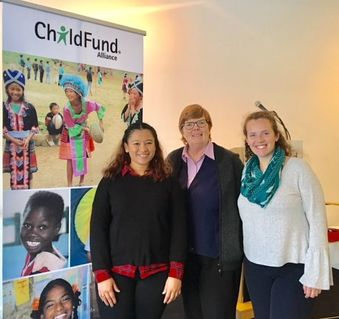
Every year, 30,000 Central American children and youth leave home, desperate to escape poverty and violence, and to seek opportunities elsewhere. Their journeys present many dangers.
It was refreshing, therefore, to recently hear of positive action on the ground to change paradigms related to violence, and to protect children in Central America. The efforts were outlined by speakers at a discussion entitled, “Protection of Children at Risk of Irregular Migration.” The panel presented at Scandinavia House in New York and focused upon children in Mexico, Guatemala, El Salvador, Nicaragua, and Honduras.
Among the Vincentian Family present were Sister Margaret O’Dwyer, DC; Seraiah Romero, intern for the Daughters of Charity at the UN, and Victoria O’Keefe, from St. John’s University.
The event sponsored by ChildFund Alliance, a network of 11 child-focused organizations working in more than 60 countries. But also present were the UN Secretary General’s Special Representative on Violence Against Children, UNICEF, Christian Children’s Fund of Canada, and the Education and Cooperation Foundation (Educo).
A July 13, 2018, article by Julio Ernesto Acuna Garcia, from theconversation.com, indicates that homicide rates among people aged 19 or younger in the Northern Triangle have steadily risen since 2008. Youth homicides are approximately 20 per 100,000, or four times the global average.
The realities faced by children and youth in Central America were explained by Marie Santos Pais, the UN Secretary General’s Representative on Violence of Children. “Safety is not the rule” there, according to Ms. Pais. “Violence is the entity—the shadow—that accompanies them (children),” she said. She pointed out that children see the rape of their sisters and the killing of their parents. “They don’t know if they go to the school bus if they will be next.” Further, gangs recruit children to keep watch for authorities or to commit crimes.
Ms. Pais recalled a conversation she had with one migrant youth. “We live through an endless nightmare,” he told her. “It is hard to feel treated as worthless children. Waiting long becomes hopelessness.”
UNICEF speaker, Cornelius Williams, said that every 7 minutes, a child is killed by violence. “Children on the move are first, children, and should be provided with protection and care,” he said.
The challenges in addressing children’s needs in this situation are many, according to Phil Tanner, PhD, and Senior Director for Policy and Government Relations for the Christian Children’s Fund of Canada. Young people face poverty, violence, sometimes limited education, and few opportunities.
The Children’s Fund has been tackling these issues in various ways. The Fund, together with ChildFund Alliance and Educo, has been engaging in violence prevention and child protection programs, as well as providing safe spaces, job training skills, and career opportunities. The programs have enabled young people to have more say in what happens around them. The programs also get at root causes of irregular migration, such as high crime and violence, social exclusion and lack of information on the dangers of migration without following normal immigration procedures.
No doubt, the Vincentian Family also is hard at work in addressing the needs of children and youth in Central America. May their work in addressing complex issues, as well as the people they walk with, be very blessed.
It was refreshing, therefore, to recently hear of positive action on the ground to change paradigms related to violence, and to protect children in Central America. The efforts were outlined by speakers at a discussion entitled, “Protection of Children at Risk of Irregular Migration.” The panel presented at Scandinavia House in New York and focused upon children in Mexico, Guatemala, El Salvador, Nicaragua, and Honduras.
Among the Vincentian Family present were Sister Margaret O’Dwyer, DC; Seraiah Romero, intern for the Daughters of Charity at the UN, and Victoria O’Keefe, from St. John’s University.
The event sponsored by ChildFund Alliance, a network of 11 child-focused organizations working in more than 60 countries. But also present were the UN Secretary General’s Special Representative on Violence Against Children, UNICEF, Christian Children’s Fund of Canada, and the Education and Cooperation Foundation (Educo).
A July 13, 2018, article by Julio Ernesto Acuna Garcia, from theconversation.com, indicates that homicide rates among people aged 19 or younger in the Northern Triangle have steadily risen since 2008. Youth homicides are approximately 20 per 100,000, or four times the global average.
The realities faced by children and youth in Central America were explained by Marie Santos Pais, the UN Secretary General’s Representative on Violence of Children. “Safety is not the rule” there, according to Ms. Pais. “Violence is the entity—the shadow—that accompanies them (children),” she said. She pointed out that children see the rape of their sisters and the killing of their parents. “They don’t know if they go to the school bus if they will be next.” Further, gangs recruit children to keep watch for authorities or to commit crimes.
Ms. Pais recalled a conversation she had with one migrant youth. “We live through an endless nightmare,” he told her. “It is hard to feel treated as worthless children. Waiting long becomes hopelessness.”
UNICEF speaker, Cornelius Williams, said that every 7 minutes, a child is killed by violence. “Children on the move are first, children, and should be provided with protection and care,” he said.
The challenges in addressing children’s needs in this situation are many, according to Phil Tanner, PhD, and Senior Director for Policy and Government Relations for the Christian Children’s Fund of Canada. Young people face poverty, violence, sometimes limited education, and few opportunities.
The Children’s Fund has been tackling these issues in various ways. The Fund, together with ChildFund Alliance and Educo, has been engaging in violence prevention and child protection programs, as well as providing safe spaces, job training skills, and career opportunities. The programs have enabled young people to have more say in what happens around them. The programs also get at root causes of irregular migration, such as high crime and violence, social exclusion and lack of information on the dangers of migration without following normal immigration procedures.
No doubt, the Vincentian Family also is hard at work in addressing the needs of children and youth in Central America. May their work in addressing complex issues, as well as the people they walk with, be very blessed.
2019 GLOBAL HUMANITARIAN OVERVIEW LAUNCHED
December 11th, 2018 By Margret O'Dwyer, DC
December 11th, 2018 By Margret O'Dwyer, DC
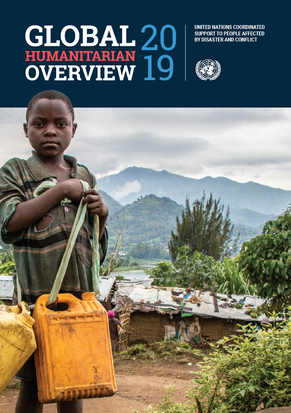
Despite global development gains, one in every 70 people around the world is caught up in crisis and urgently needs humanitarian assistance and protection. Global Gross Domestic Product (GDP) rose from $63.4 trillion in 2008 to $80.7 trillion in 2017. But significant humanitarian aid is still needed. Armed conflict, natural disasters, and vulnerabilities are among factors contributing to pleas for humanitarian aid.
This information and much more is included in the Global Humanitarian Overview 2019, released December 4 in Geneva by the UN's Office for the Coordination of Humanitarian Aid (UN OCHA). To see the report and to learn about trends, go to this link: https://www.unocha.org/global-humanitarian-overview-2019 (Click on the picture of the report at that site to see the report).
Photo credits to UN OCHA.
70th anniversary of the Universal Declaration of Human Rights
December 10th, 2018
December 10th, 2018
The International Declaration of Human Rights turns 70 on December 10th. This document is the framework for many treaties,
compacts, and other international agreements.
We often think that upholding human rights is the responsibility of governments alone. But the words of Eleanor Roosevelt
point out that we all share that responsibility: “Where, after all, do universal human rights begin? In small places, close to home.”
Along with our Vincentian view that in each person we see the face of Christ, it is important to recognize that a significant amount
of our work as Daughters of Charity connects to human rights, starting with the basic principle that all persons have dignity.
Our leader, Sr. Kathleen Appler, has encouraged us to become familiar with the Declaration. A web site which explains the
rights simply can be found at this link: https://commit.standup4humanrights.org/en/index.php
#UDHR70 #standup4humanrights
compacts, and other international agreements.
We often think that upholding human rights is the responsibility of governments alone. But the words of Eleanor Roosevelt
point out that we all share that responsibility: “Where, after all, do universal human rights begin? In small places, close to home.”
Along with our Vincentian view that in each person we see the face of Christ, it is important to recognize that a significant amount
of our work as Daughters of Charity connects to human rights, starting with the basic principle that all persons have dignity.
Our leader, Sr. Kathleen Appler, has encouraged us to become familiar with the Declaration. A web site which explains the
rights simply can be found at this link: https://commit.standup4humanrights.org/en/index.php
#UDHR70 #standup4humanrights
COP 24, NOW TAKING PLACE IN POLAND
December 4th, 2018
December 4th, 2018
UN’S WOMEN AMBASSADORS MEET NGOS
December 4th, 2018 By Margret O'Dwyer, DC
December 4th, 2018 By Margret O'Dwyer, DC
UN Women have been welcoming women ambassadors at an annual luncheon since 2000. The event provides an opportunity for civil society to meet and talk with the ambassadors. This year’s luncheon recently took place at the Armenian Convention Center in New York.
During the event, UN Women honored various Ambassadors and UN agency members, including Ireland’s Geraldine Byrne Nason, who chaired last year’s Commission on the Status of Women and will do so again in 2019. Ambassador Byrne Nason noted that serving in that role was a highlight of her year. She thanked those present for their support and said that their optimism is needed more than ever.
Ambassadors were also present from countries such as the Netherlands, Ghana, Trinidad-Tobago, Sweden, Rwanda, Norway, and many others. They spoke of the importance of women everywhere raising their voices regarding issues of concern. The Ambassadors thanked civil society members present for their contributions to the work of the UN, lauded the presence of NGOs at various UN activities, and noted the upcoming International Day to End Violence Against Women and 16 days of action to eliminate violence against women (November 25-December 10).
Dr. Susan O’Malley has chaired NGO CSW in New York since 2015. She was present to greet participants and to present the award to Ambassador Byrne Nason.
During the event, UN Women honored various Ambassadors and UN agency members, including Ireland’s Geraldine Byrne Nason, who chaired last year’s Commission on the Status of Women and will do so again in 2019. Ambassador Byrne Nason noted that serving in that role was a highlight of her year. She thanked those present for their support and said that their optimism is needed more than ever.
Ambassadors were also present from countries such as the Netherlands, Ghana, Trinidad-Tobago, Sweden, Rwanda, Norway, and many others. They spoke of the importance of women everywhere raising their voices regarding issues of concern. The Ambassadors thanked civil society members present for their contributions to the work of the UN, lauded the presence of NGOs at various UN activities, and noted the upcoming International Day to End Violence Against Women and 16 days of action to eliminate violence against women (November 25-December 10).
Dr. Susan O’Malley has chaired NGO CSW in New York since 2015. She was present to greet participants and to present the award to Ambassador Byrne Nason.
NIGERIA LEADS EFFORT TO CREATE ANNUAL UN DAY FOR EDUCATION
December 4th, 2018 By Margret O'Dwyer, DC
December 4th, 2018 By Margret O'Dwyer, DC
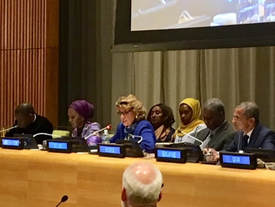
Amazingly, there has not been a UN international day specifically observing the importance of education. That changed, December 3, when the General Assembly passed a resolution to name January 24 as the International Day of Education.
The effort to promote the day was led by the Permanent Mission of Nigeria to the UN. Nigerian Ambassador to the UN, H.E.Tijjani Bande, led a panel of speakers on Friday, November 30, which raised interest in passing a the education resolution. Ambassador Bande has noted that education is crucial in terms of development as well as peace. Education has a key link to ensuring that the Sustainable Development Goals are achieved.
The permanent Missions of Ireland, Singapore, and Qatar co-sponsored the resolution, along with UNESCO, UNICEF, UN Women, and Collegiate Congress. UNESCO was asked to facilitate the annual observance.
The effort to promote the day was led by the Permanent Mission of Nigeria to the UN. Nigerian Ambassador to the UN, H.E.Tijjani Bande, led a panel of speakers on Friday, November 30, which raised interest in passing a the education resolution. Ambassador Bande has noted that education is crucial in terms of development as well as peace. Education has a key link to ensuring that the Sustainable Development Goals are achieved.
The permanent Missions of Ireland, Singapore, and Qatar co-sponsored the resolution, along with UNESCO, UNICEF, UN Women, and Collegiate Congress. UNESCO was asked to facilitate the annual observance.
UN RELEASES FLAGSHIP REPORT ON DISABILITY AND DEVELOPMENT
December 3rd, 2018 By Margret O'Dwyer, DC
December 3rd, 2018 By Margret O'Dwyer, DC
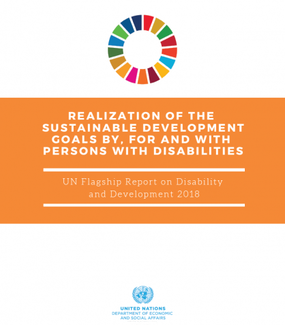
A new UN report makes the connection between disability and the Sustainable Development Goals. It reflects that persons with disabilities are not yet fully included in the implementation, monitoring, and evaluation of the Goals. The report is entitled, “Realization of the Sustainable Development Goals By, For and With Persons With Disabilities. “
A variety of data sources and experts, including persons with disabilities, contributed to the report. It was released on December 3, which was International Day of Persons with Disabilities. This year’s theme was, “Empowering persons with disabilities and ensuring inclusiveness and equality.”
The report states that although some progress has been made, persons with disabilities continue to face many barriers to their full inclusion and participation in the life of their communities. It further provides best practices and recommendations .
“Let us reaffirm our commitment to work together for a better world that is inclusive, equitable and sustainable for everyone, where the rights of people with disabilities are fully realized,” said UN Secretary General Antonio Gutteres.
To view an executive summary of the report, go to this link.
To see the full report, click this link.
A variety of data sources and experts, including persons with disabilities, contributed to the report. It was released on December 3, which was International Day of Persons with Disabilities. This year’s theme was, “Empowering persons with disabilities and ensuring inclusiveness and equality.”
The report states that although some progress has been made, persons with disabilities continue to face many barriers to their full inclusion and participation in the life of their communities. It further provides best practices and recommendations .
“Let us reaffirm our commitment to work together for a better world that is inclusive, equitable and sustainable for everyone, where the rights of people with disabilities are fully realized,” said UN Secretary General Antonio Gutteres.
To view an executive summary of the report, go to this link.
To see the full report, click this link.
NIGERIAN GIRL’S ESSAY INCLUDED IN UN’S “GIRLS SPEAK OUT” EVENT
November 27, 2018 By Margret O'Dwyer, DC
November 27, 2018 By Margret O'Dwyer, DC
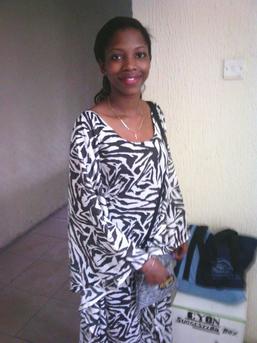
Girls from throughout the world recently contributed their voice to Girls Speak Out, an event held annually in New York on the International Day of the Girl. This year, Sr. Franca Edet, DC, shared an opportunity from Day of the Girl organizers for girls to offer input into what it’s like to be a girl where they live. The essay of Miriam Ironbar, from Nigeria, was chosen to be featured in the UN event. Miriam lives in the Cross River State of Nigeria.
Miriam also offered the advice she would give to the next generation of girls in her community
so that they can thrive. Miriam’s advice:
Be yourself, love what is good;
Stand strong against negative influence.
Discover the hero in you and befriend yourself.
Know that your future is what you make of it today.
Miriam’s essay was presented by girl performers during Girls Speak Out, thus helping to elevate conversations about girls’ human rights around the globe.
The full essay is attached on this link.
Miriam also offered the advice she would give to the next generation of girls in her community
so that they can thrive. Miriam’s advice:
Be yourself, love what is good;
Stand strong against negative influence.
Discover the hero in you and befriend yourself.
Know that your future is what you make of it today.
Miriam’s essay was presented by girl performers during Girls Speak Out, thus helping to elevate conversations about girls’ human rights around the globe.
The full essay is attached on this link.
#Take Your Seat
David Attenborough invites us all to have input into what happens at COP 24 in Katowice, Poland, December 2-14. Send a message to leaders about your concerns related to climate issues.#TAKEYOURSEAT
HUMAN RIGHTS DECLARATION TURNS 70
November 26, 2018 By Margret O'Dwyer, DC
November 26, 2018 By Margret O'Dwyer, DC
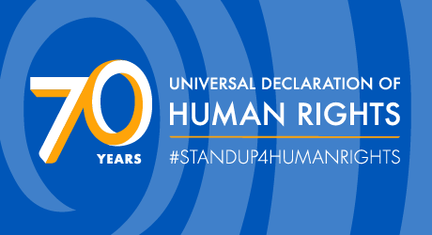
December 10 marks the 70th anniversary of the Universal Declaration of Human Rights. For nearly three-fourths of a century, the Declaration has expressed basic values shared by the international community.
At the United Nations, human rights are addressed primarily by the Office of the High Commissioner for Human Rights (UNOHCHR), located in Geneva. Michelle Bachelet, former President of Chile, was appointed High Commission for Human Rights on September 1, 2018.
Can you see any connections between your ministry and any of the 30 rights expressed in the Universal Declaration?
They can be viewed at this link:
In English: https://www.ohchr.org/EN/UDHR/Documents/UDHR_Translations/eng.pdf
In French: https://www.ohchr.org/EN/UDHR/Pages/Language.aspx?LangID=frn
In Spanish: https://www2.gwu.edu/~erpapers/humanrights/udhr/lang/spn.htm
The Office of the High Commissioner is running a series of 30 articles about the 30 rights (one each day from November 9 to December 10) at this link:
In English: https://www.ohchr.org/EN/NewsEvents/Pages/media.aspx?IsMediaPage=true
In Spanish: https://www.ohchr.org/SP/NewsEvents/Pages/DisplayNews.aspx?NewsID=23871&LangID=S
The Declaration was adopted on December 10, 1948 as an effort to help prevent some of the atrocities which occurred during World War II. Among the rights are freedom from fear and want, freedom of expression, rights to health and education, and to enjoy the benefits of measures to advance economic and social justice.
There are many factors which are working to erode human rights at this point in history. Now is the time for all to work together to protect them.
At the United Nations, human rights are addressed primarily by the Office of the High Commissioner for Human Rights (UNOHCHR), located in Geneva. Michelle Bachelet, former President of Chile, was appointed High Commission for Human Rights on September 1, 2018.
Can you see any connections between your ministry and any of the 30 rights expressed in the Universal Declaration?
They can be viewed at this link:
In English: https://www.ohchr.org/EN/UDHR/Documents/UDHR_Translations/eng.pdf
In French: https://www.ohchr.org/EN/UDHR/Pages/Language.aspx?LangID=frn
In Spanish: https://www2.gwu.edu/~erpapers/humanrights/udhr/lang/spn.htm
The Office of the High Commissioner is running a series of 30 articles about the 30 rights (one each day from November 9 to December 10) at this link:
In English: https://www.ohchr.org/EN/NewsEvents/Pages/media.aspx?IsMediaPage=true
In Spanish: https://www.ohchr.org/SP/NewsEvents/Pages/DisplayNews.aspx?NewsID=23871&LangID=S
The Declaration was adopted on December 10, 1948 as an effort to help prevent some of the atrocities which occurred during World War II. Among the rights are freedom from fear and want, freedom of expression, rights to health and education, and to enjoy the benefits of measures to advance economic and social justice.
There are many factors which are working to erode human rights at this point in history. Now is the time for all to work together to protect them.

PRAYER INTENTIONS FOR 16 DAYS OF ACTION TO END VIOLENCE AGAINST WOMEN AND GIRLS
November 25 is the UN Day for the Elimination of Violence Against Women (and Girls). It is the beginning of 16 days of action to end such violence, leading up to December 10, which is the 70th Anniversary of the Universal Declaration of Human Rights. We invite you to:
1. Offer a prayer intention (attached in the link below) each day as the world unites to stop violence
2. Wear orange November 25 to December 10 as a symbol of a bright, violence-free future
Click here to prayer of intention calendar
November 25 is the UN Day for the Elimination of Violence Against Women (and Girls). It is the beginning of 16 days of action to end such violence, leading up to December 10, which is the 70th Anniversary of the Universal Declaration of Human Rights. We invite you to:
1. Offer a prayer intention (attached in the link below) each day as the world unites to stop violence
2. Wear orange November 25 to December 10 as a symbol of a bright, violence-free future
Click here to prayer of intention calendar
UN ADVISORY GROUP MEETS
November 6th, 2018 By Margret O'Dwyer, DC
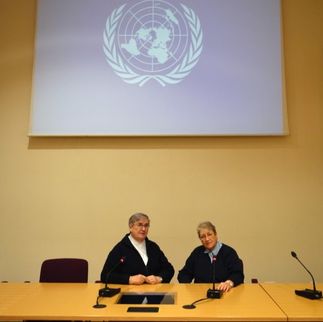
Human rights were a key focus as the Daughters of Charity UN Advisory Committee met last week in Paris. Presentations were offered on a history of human rights and how they are integrated into our ministries today, particularly with regard to migration, human trafficking, and persons experiencing homelessness. Sisters also reported on UN-related activities in their local regions. Sisters Monique Javouhey and Catherine Prendergast provided talks about human rights to the sisters of the Mother House.
The emphasis on human rights flows from the UN’s celebration of the 70th Anniversary of the Universal Declaration of Human Rights, which takes place December 10.
Sister Catherine Prendergast informed the group that a new Daughters of Charity at the UN web site was launched in October. The link is: daughtersofcharityunngo.com
The Advisory group further discussed protocols for the sisters’ UN work and agreed to promote the International Day for the Eradication of Violence Against Women (and Girls), which takes place November 25.
Members of the UN Advisory Group include Sister Marie Raw and Sister Maria Teresa Mueda, General Councilors, and Sisters Bernadette MacMahon, Ligia Hernandez, Franca Edet, Catherine Prendergast, Monique Javouhey, and Margaret O’Dwyer.
The emphasis on human rights flows from the UN’s celebration of the 70th Anniversary of the Universal Declaration of Human Rights, which takes place December 10.
Sister Catherine Prendergast informed the group that a new Daughters of Charity at the UN web site was launched in October. The link is: daughtersofcharityunngo.com
The Advisory group further discussed protocols for the sisters’ UN work and agreed to promote the International Day for the Eradication of Violence Against Women (and Girls), which takes place November 25.
Members of the UN Advisory Group include Sister Marie Raw and Sister Maria Teresa Mueda, General Councilors, and Sisters Bernadette MacMahon, Ligia Hernandez, Franca Edet, Catherine Prendergast, Monique Javouhey, and Margaret O’Dwyer.
UN PANEL PROMOTES WAYS TO SUPPORT PERSONS WITHOUT HOMES
October 31st, 2018 By Margret O'Dwyer, DC
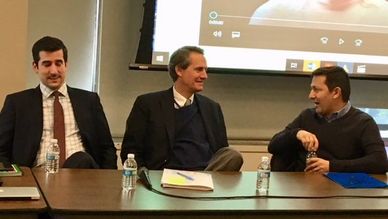
An event held October 30 at the UN Church Center in New York emphasized the importance of addressing homelessness in a systemic way. The panel presentation was in keeping with the Vincentian Family’s Global Initiative on Homelessness. It was a collaboration of the Working Group to End Homelessness (WGEH) and UN Habitat.
Also present were ATD Fourth World, Community Solutions, LEFSA (Life Experience and Faith Sharing Associates), and by video, UN Special Rapporteur on the Right to Housing, Leilani Farha. Many of the Vincentian Family UN NGO’s from New York and students from St. John’s and other universities were in attendance as well.
The event also connected with Urban October and World Cities Day. World Cities Day promotes awareness about urbanization and addresses the challenges of urbanization. One of those challenges is access to housing, which is compromised by phenomenon such as the commodification of housing.
Chris Williams, Director of UN Habitat, spoke of the importance of putting pressure on the UN to define and address homelessness. He also noted that statistics are key to developing public and private strategies which can help end homelessness. (The Working Group to End Homelessness is encouraging nations to count persons who are homeless so that approaches and policies can be initiated to support them).
Monica Jangahir, from ATD Fourth World, spoke of the importance of social protection for persons experiencing homelessness. In a video presentation she offered, persons who have lived without homes noted what it is like. A woman from Boston mentioned how benefits are cut if you have more than $2,000, but that more than $2,000 is needed to have enough for a deposit as well as first month’s rent.
UN Special Rapporteur on the Right to Housing, Leilani Farha, made the link between homeless and human rights. She said homelessness is an issue in both developed and developing nations. She has observed homeless persons dealing with the starkest conditions, which includes people living by a thread; without such necessities as water, sanitation, or a bed; and being subject to violence. Farha has been strongly vocal about the commodification of housing and its effects on homelessness as well as the importance of protecting the rights of persons experiencing it.
Jake Maguire, from Community Solutions, outlined the evolution of strategies to assist persons living without homes. He discussed an emerging Fourth Generation Accountable Community System to end homelessness. It would include:
*Robust investment in a range of permanent housing options
*Shared, real-time, by name data
*Universal triage linked to evidence based recommendations
*Streamlined, user-centered housing processes
*System wide analytics and real-time feedback loops
*Multi agency command center team
*Disciplined iteration
Guillermo Campuzano, CM, explained the work of the Institute of Global Homelessness (IGH) in Chicago, which has a vision of a world within which everyone has a home. It supports a global movement to end homelessness led from the ground, guided by actionable research and supported by effective policy.
Also present were ATD Fourth World, Community Solutions, LEFSA (Life Experience and Faith Sharing Associates), and by video, UN Special Rapporteur on the Right to Housing, Leilani Farha. Many of the Vincentian Family UN NGO’s from New York and students from St. John’s and other universities were in attendance as well.
The event also connected with Urban October and World Cities Day. World Cities Day promotes awareness about urbanization and addresses the challenges of urbanization. One of those challenges is access to housing, which is compromised by phenomenon such as the commodification of housing.
Chris Williams, Director of UN Habitat, spoke of the importance of putting pressure on the UN to define and address homelessness. He also noted that statistics are key to developing public and private strategies which can help end homelessness. (The Working Group to End Homelessness is encouraging nations to count persons who are homeless so that approaches and policies can be initiated to support them).
Monica Jangahir, from ATD Fourth World, spoke of the importance of social protection for persons experiencing homelessness. In a video presentation she offered, persons who have lived without homes noted what it is like. A woman from Boston mentioned how benefits are cut if you have more than $2,000, but that more than $2,000 is needed to have enough for a deposit as well as first month’s rent.
UN Special Rapporteur on the Right to Housing, Leilani Farha, made the link between homeless and human rights. She said homelessness is an issue in both developed and developing nations. She has observed homeless persons dealing with the starkest conditions, which includes people living by a thread; without such necessities as water, sanitation, or a bed; and being subject to violence. Farha has been strongly vocal about the commodification of housing and its effects on homelessness as well as the importance of protecting the rights of persons experiencing it.
Jake Maguire, from Community Solutions, outlined the evolution of strategies to assist persons living without homes. He discussed an emerging Fourth Generation Accountable Community System to end homelessness. It would include:
*Robust investment in a range of permanent housing options
*Shared, real-time, by name data
*Universal triage linked to evidence based recommendations
*Streamlined, user-centered housing processes
*System wide analytics and real-time feedback loops
*Multi agency command center team
*Disciplined iteration
Guillermo Campuzano, CM, explained the work of the Institute of Global Homelessness (IGH) in Chicago, which has a vision of a world within which everyone has a home. It supports a global movement to end homelessness led from the ground, guided by actionable research and supported by effective policy.
Supporting Events:
INTERNATIONAL DAY FOR THE ERADICATION OF POVERTY
October 17, 2018 By Catherine Prendergast, DC
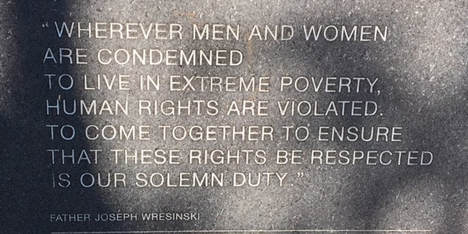
The International Day for the Eradication of Poverty was celebrated at UN Headquarters Wednesday, October 17. The event was entitled, “Coming together with those furthest behind to build an inclusive world of universal respect for human rights and dignity.” It was co-sponsored by several NOG organizations, including ATD (All Together in Dignity) 4th World, UN organizations, and countries.
We were honored by the presence of UN Secretary General Antonio Guterres, who addressed a large gathering in the UN lobby. “Let us remember that ending poverty is not a matter of charity but a question of justice,” the Secretary General said. He further noted that ending poverty is still one of the greatest of UN challenges and priorities.
Remarks were also offered by the Ambassador of France, Francois Delattre, who said, “We will win this battle” and Ambassador Yemdaogo Eric Tiare of Burkina Faso. Irish singers Susan McKeown and Michael Brunnock performed a song commissioned by ATD 4th World for the occasion, called, “Be the Change.” Mala & Dancers performed on the North Lawn of the UN Gardens.
The UN has a Commemorative Stone, dedicated to victims of poverty. The text was read in six UN languages by children and young people from the Hyde Leadership Charter School and Lycee Francais of New York. It was followed by a moment of silence around the Stone, then the symbolic placing of leaves on a human rights tree, accompanied by the UN Orchestra.
But perhaps the most telling remarks came from people who had experienced poverty. We heard how quarry workers in Tanzania don’t always come forward to ask for help. They would be so close to the heart of St. Vincent, who was conscious of the bashful poor.
The Tanzanian speaker called for acting and doing, not preaching. He further mentioned that coming together to eradicate poverty must include those affected by it. “They are often left behind,” he said, “but they have observations and opinions. When human rights are honored the world can be one of peace and love,” he said.
A speaker from Brooklyn, US, pointed out that some systems to assist persons in poverty seem designed more to prevent misuse then to lift people up. We further heard about Boston, in the US, where people can be cut off from benefits if they have more than $2,000. Yet saving up for an apartment can cost more than that.
One speaker could only get a tooth pulled at a dental school because she could not afford dental care. (While dental school services are most helpful, one would wish to have a choice in the type of care received). “There are so many faces of humanity being ignored,” she said.
Yet another speaker compared homelessness to being handcuffed.
The challenge of the 17th of October must not stop on that date. Each one of us are called to work at the eradication of poverty regardless of our mission or ministry.
Videos are available at: Be Change at the UN 2018
International Day for the Eradication of Poverty- Antonio Guterres
We were honored by the presence of UN Secretary General Antonio Guterres, who addressed a large gathering in the UN lobby. “Let us remember that ending poverty is not a matter of charity but a question of justice,” the Secretary General said. He further noted that ending poverty is still one of the greatest of UN challenges and priorities.
Remarks were also offered by the Ambassador of France, Francois Delattre, who said, “We will win this battle” and Ambassador Yemdaogo Eric Tiare of Burkina Faso. Irish singers Susan McKeown and Michael Brunnock performed a song commissioned by ATD 4th World for the occasion, called, “Be the Change.” Mala & Dancers performed on the North Lawn of the UN Gardens.
The UN has a Commemorative Stone, dedicated to victims of poverty. The text was read in six UN languages by children and young people from the Hyde Leadership Charter School and Lycee Francais of New York. It was followed by a moment of silence around the Stone, then the symbolic placing of leaves on a human rights tree, accompanied by the UN Orchestra.
But perhaps the most telling remarks came from people who had experienced poverty. We heard how quarry workers in Tanzania don’t always come forward to ask for help. They would be so close to the heart of St. Vincent, who was conscious of the bashful poor.
The Tanzanian speaker called for acting and doing, not preaching. He further mentioned that coming together to eradicate poverty must include those affected by it. “They are often left behind,” he said, “but they have observations and opinions. When human rights are honored the world can be one of peace and love,” he said.
A speaker from Brooklyn, US, pointed out that some systems to assist persons in poverty seem designed more to prevent misuse then to lift people up. We further heard about Boston, in the US, where people can be cut off from benefits if they have more than $2,000. Yet saving up for an apartment can cost more than that.
One speaker could only get a tooth pulled at a dental school because she could not afford dental care. (While dental school services are most helpful, one would wish to have a choice in the type of care received). “There are so many faces of humanity being ignored,” she said.
Yet another speaker compared homelessness to being handcuffed.
The challenge of the 17th of October must not stop on that date. Each one of us are called to work at the eradication of poverty regardless of our mission or ministry.
Videos are available at: Be Change at the UN 2018
International Day for the Eradication of Poverty- Antonio Guterres
SPECIAL RAPPORTEUR ADVOCATES FOR RIGHTS OF THOSE IN INFORMAL SETTLEMENTS
October 24, 2018 By Margret O'Dwyer, DC
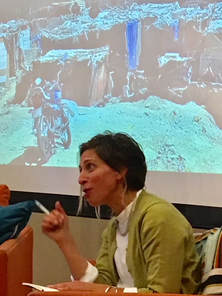
In this year when we celebrate the 70th anniversary of the Universal Declaration of Human Rights, and the
Vincentian Family focuses on homelessness, the rights of persons living in informal settlements merit some
consideration.
UN Special Rapporteur on Housing, Leilani Farha, recently issued a report related to rights of persons in informal
settlements. Informal settlements can be defined as residential areas where inhabitants have no formal ownership or lease agreement vis-à-vis the land and/or dwellings they inhabit. They exist in all regions of the world, including in highly developed countries. They could include homeless encampments, squatting in abandoned buildings, living in informal rental housing or in long established communities without formal title.
In her report, the Special Rapporteur examines the issue of the right to housing for residents of informal settlements and the commitment made by States to upgrade such settlements by 2030. The report notes that nearly one quarter of the world’s urban population lives in informal settlements or encampments, most in developing countries but increasingly also in the most affluent. Living conditions are shocking and intolerable. Residents often live without water and sanitation, and are in constant fear of eviction.
Many of the rights of the 900 million people who live in informal settlements are ignored and that is a scandal, the Special Rapporteur indicates. She provides in her report 31 recommendations which would aid governments in improving informal settlements and complying with the right to housing.
Ms. Farha conducted a dialogue October 18 on informal settlements at the Rosa Luxemburg Stiftung Foundation in New York. Her guests included speakers from Argentina, Los Angeles, the Philippines, and Kenya, who explained the realities of persons living in informal settlements.
The report can be accessed by going to this site and hitting the "Download the Word Document" at the upper right.
Vincentian Family focuses on homelessness, the rights of persons living in informal settlements merit some
consideration.
UN Special Rapporteur on Housing, Leilani Farha, recently issued a report related to rights of persons in informal
settlements. Informal settlements can be defined as residential areas where inhabitants have no formal ownership or lease agreement vis-à-vis the land and/or dwellings they inhabit. They exist in all regions of the world, including in highly developed countries. They could include homeless encampments, squatting in abandoned buildings, living in informal rental housing or in long established communities without formal title.
In her report, the Special Rapporteur examines the issue of the right to housing for residents of informal settlements and the commitment made by States to upgrade such settlements by 2030. The report notes that nearly one quarter of the world’s urban population lives in informal settlements or encampments, most in developing countries but increasingly also in the most affluent. Living conditions are shocking and intolerable. Residents often live without water and sanitation, and are in constant fear of eviction.
Many of the rights of the 900 million people who live in informal settlements are ignored and that is a scandal, the Special Rapporteur indicates. She provides in her report 31 recommendations which would aid governments in improving informal settlements and complying with the right to housing.
Ms. Farha conducted a dialogue October 18 on informal settlements at the Rosa Luxemburg Stiftung Foundation in New York. Her guests included speakers from Argentina, Los Angeles, the Philippines, and Kenya, who explained the realities of persons living in informal settlements.
The report can be accessed by going to this site and hitting the "Download the Word Document" at the upper right.
Other articles available on Famvin:
International Day of the Girl celebrated Today
https://famvin.org/en/2018/09/20/un-calls-for-observing-un-peace-day-by-respecting-promoting-human-rights/
UN Environment Program (UNEP) and FBOs Link to Protect Earth
International Day of Charity: September 5
High-Level Political Forum Focuses On Development Goal Progress
Negotiations Towards Global Compact on Refugees Near Conclusion
People’s University Highlights Dignity of Persons Affected by Homelessness
Plastic – A Day of Trying to Break Dependence
International Day of the Girl celebrated Today
https://famvin.org/en/2018/09/20/un-calls-for-observing-un-peace-day-by-respecting-promoting-human-rights/
UN Environment Program (UNEP) and FBOs Link to Protect Earth
International Day of Charity: September 5
High-Level Political Forum Focuses On Development Goal Progress
Negotiations Towards Global Compact on Refugees Near Conclusion
People’s University Highlights Dignity of Persons Affected by Homelessness
Plastic – A Day of Trying to Break Dependence
